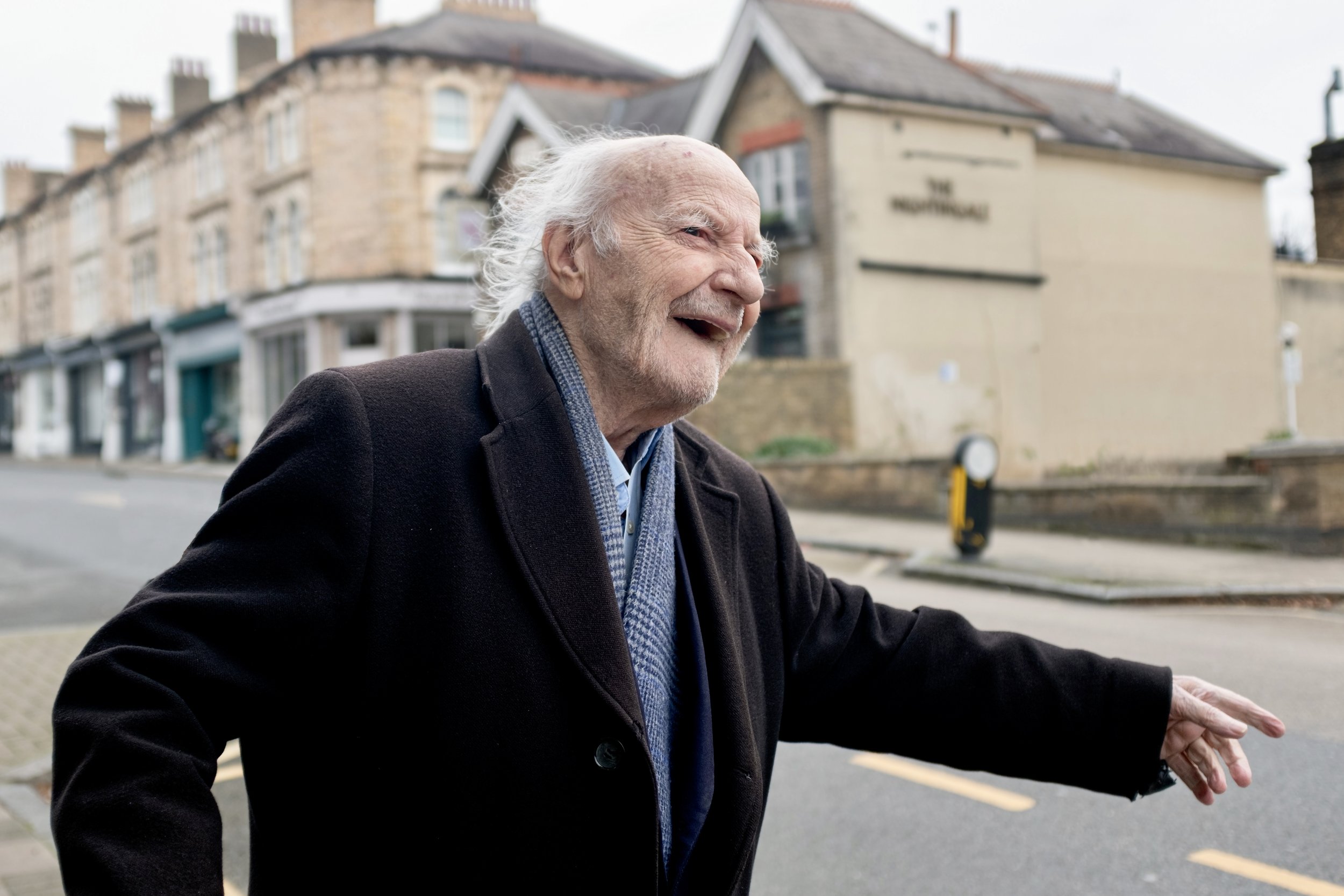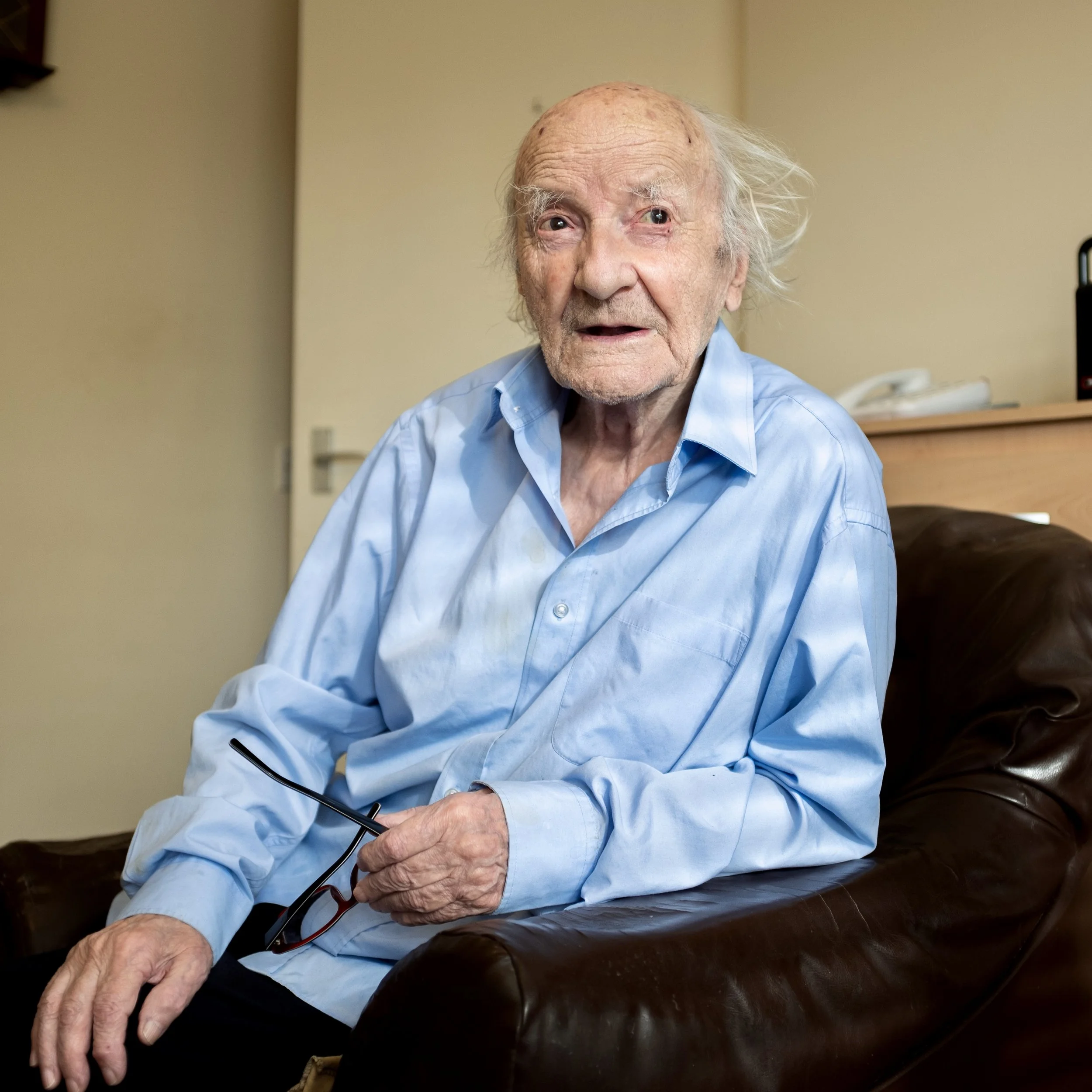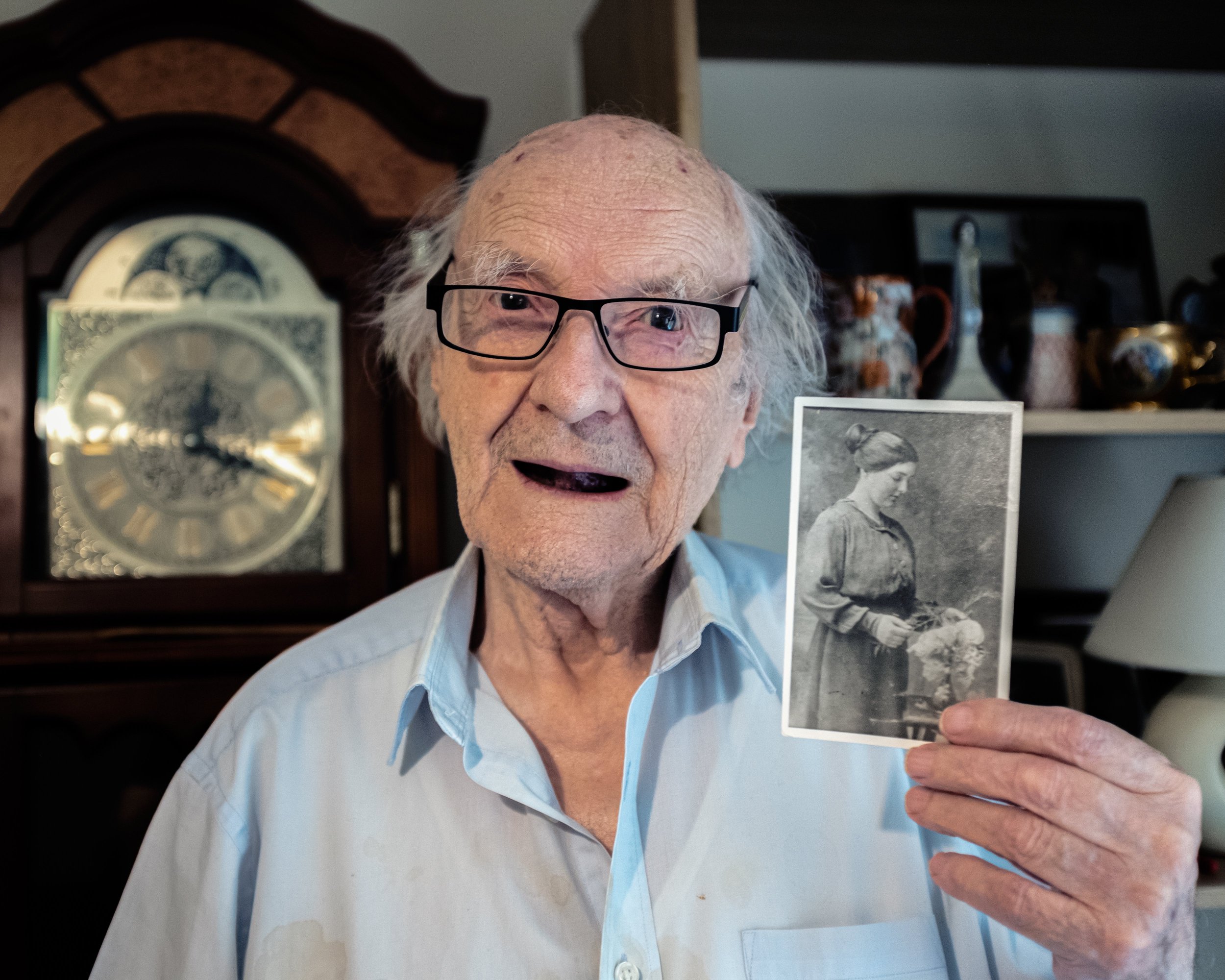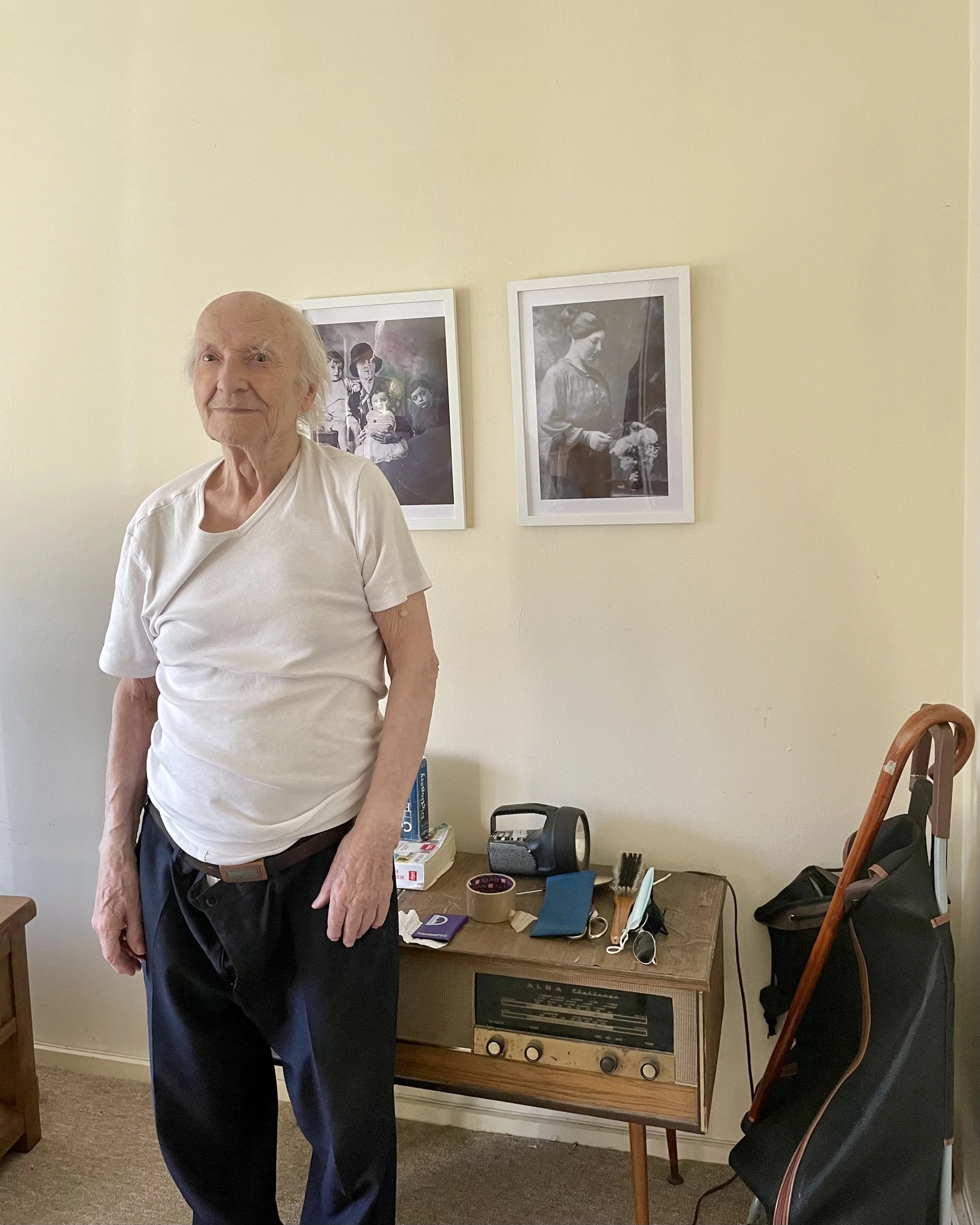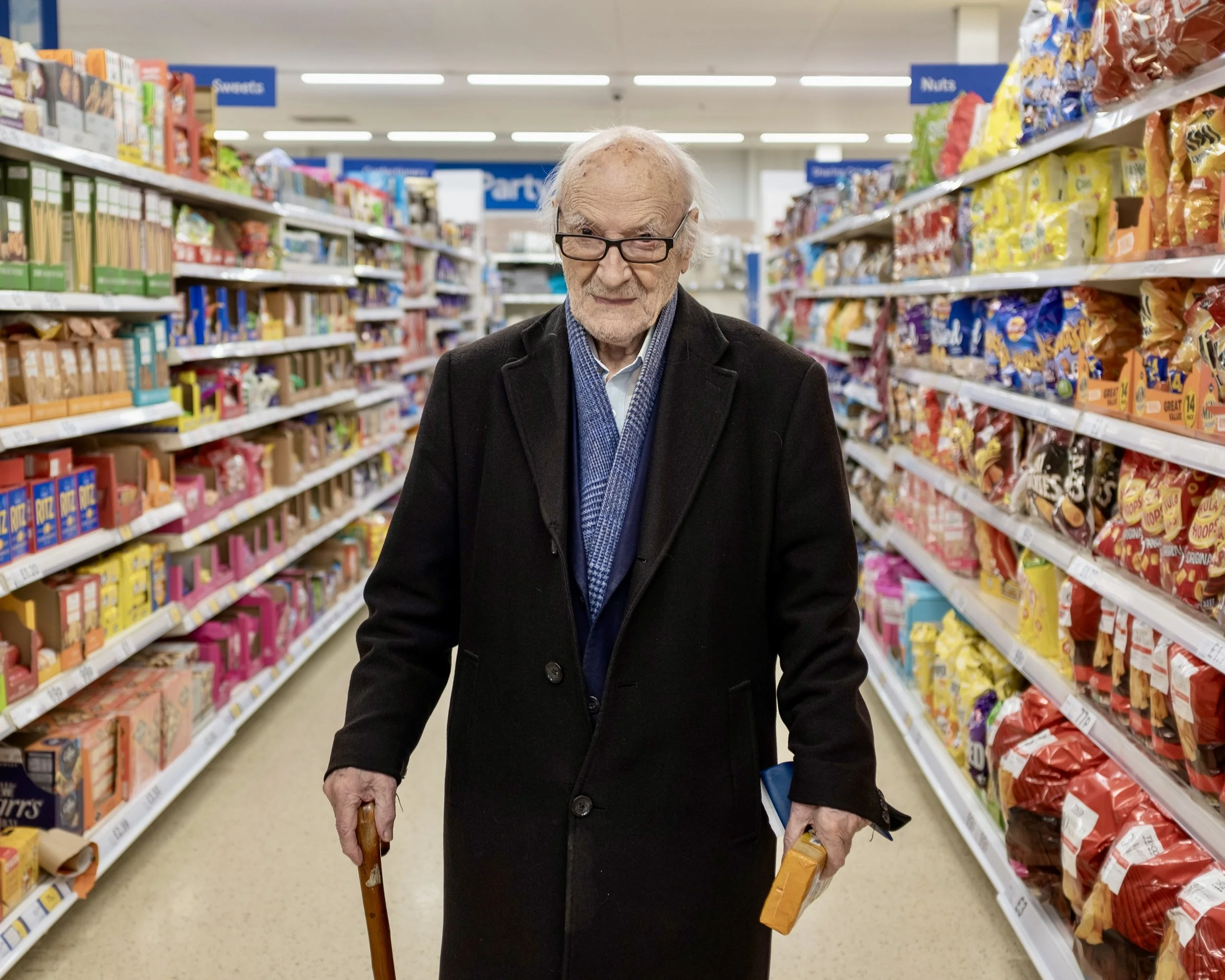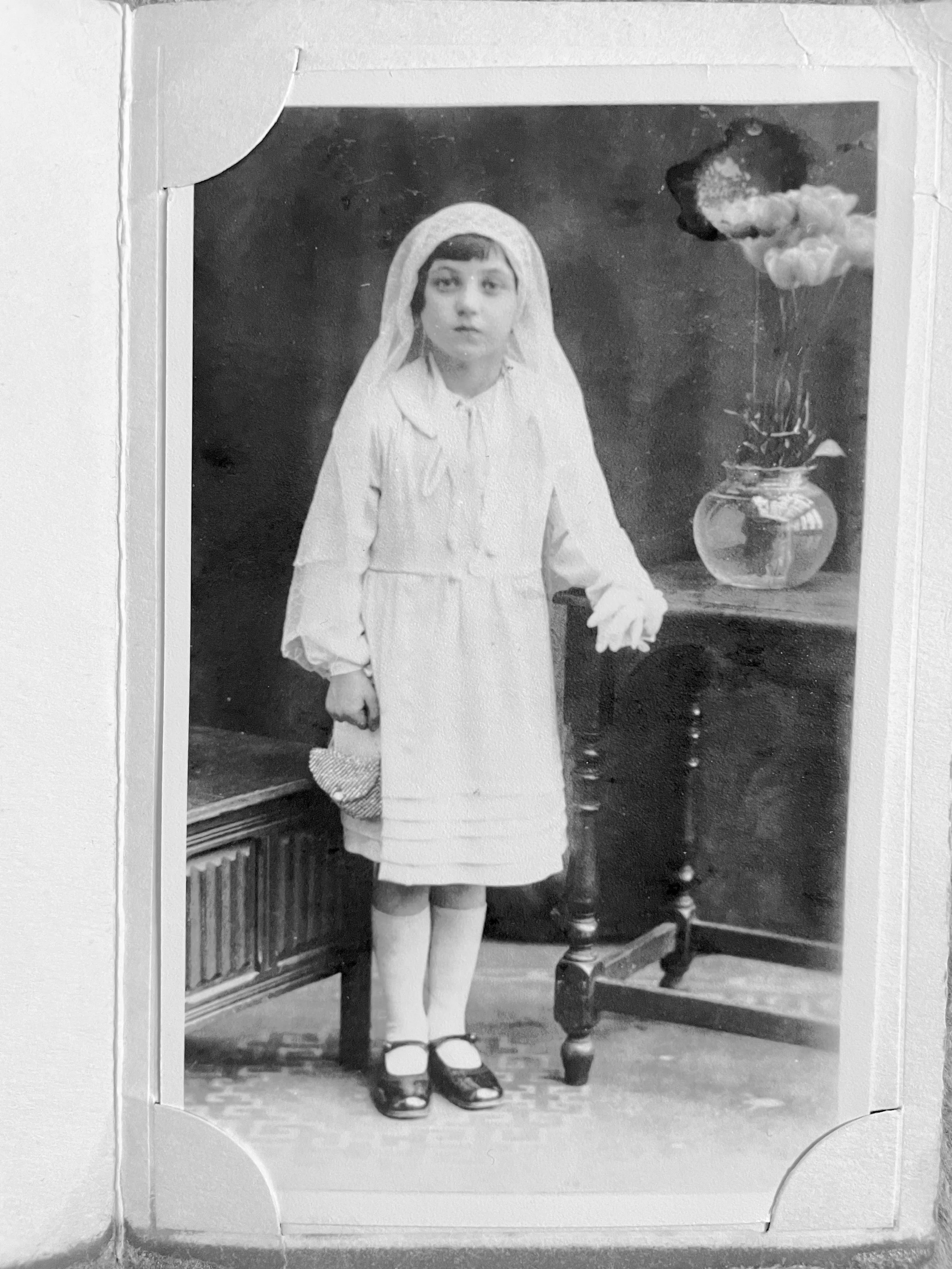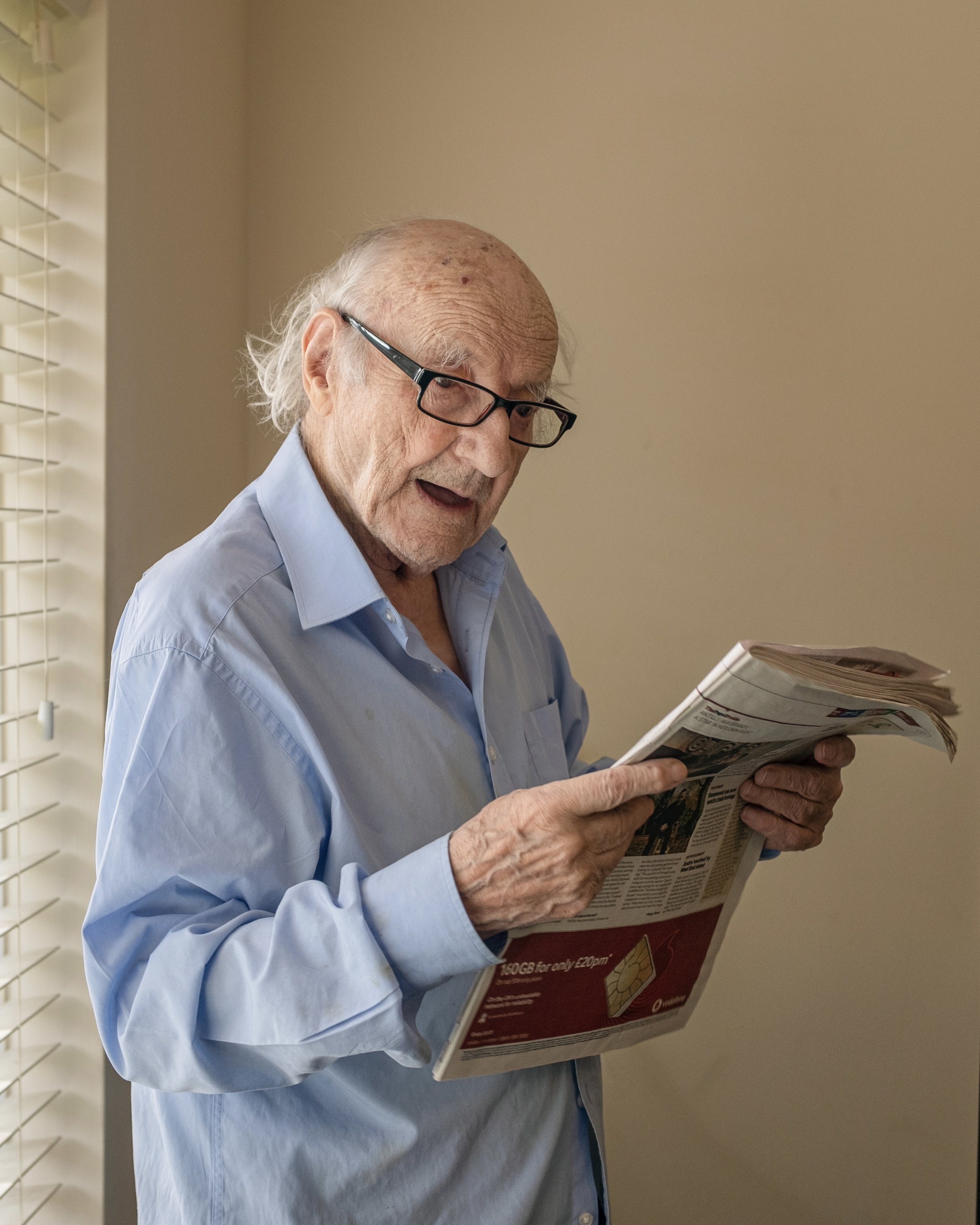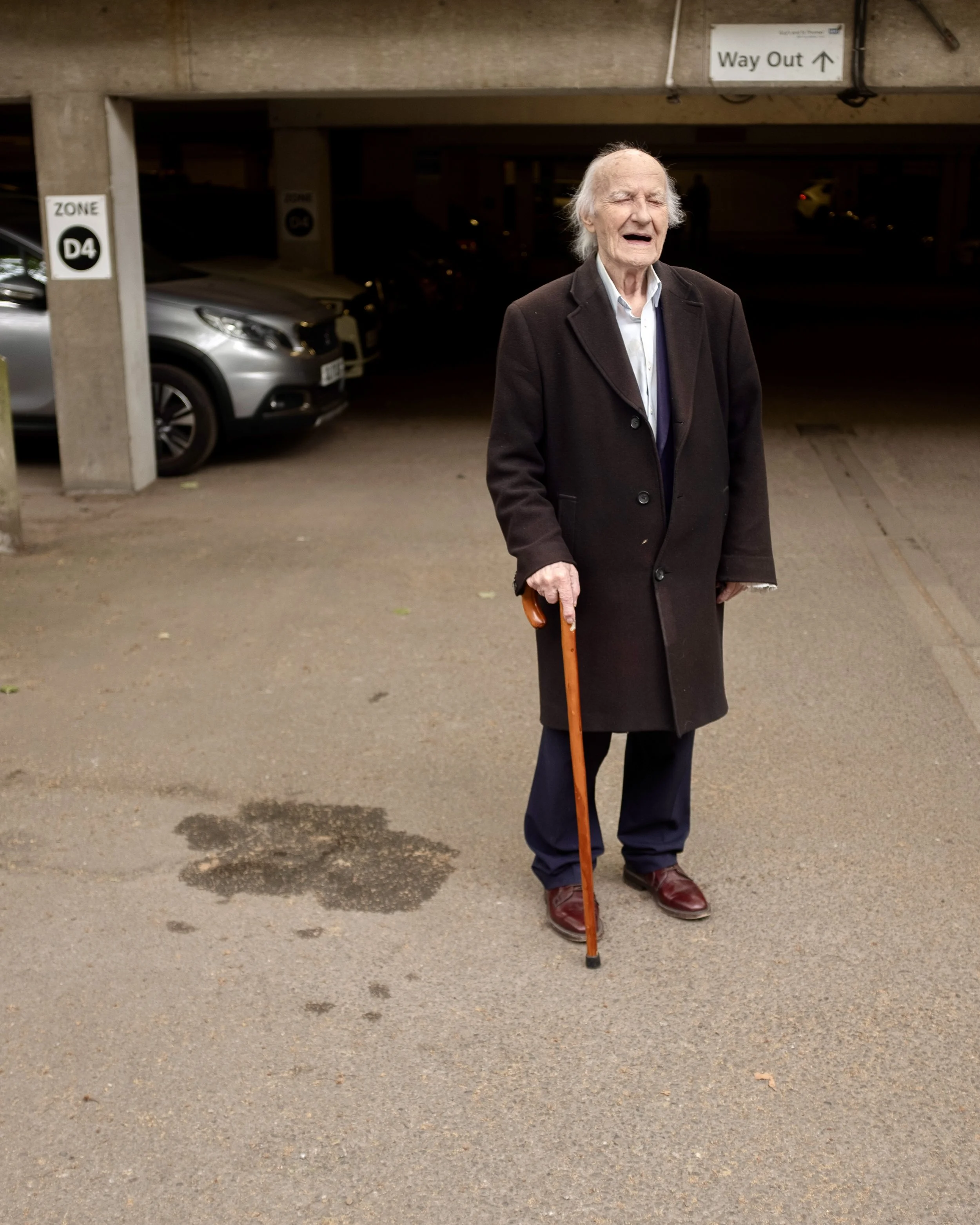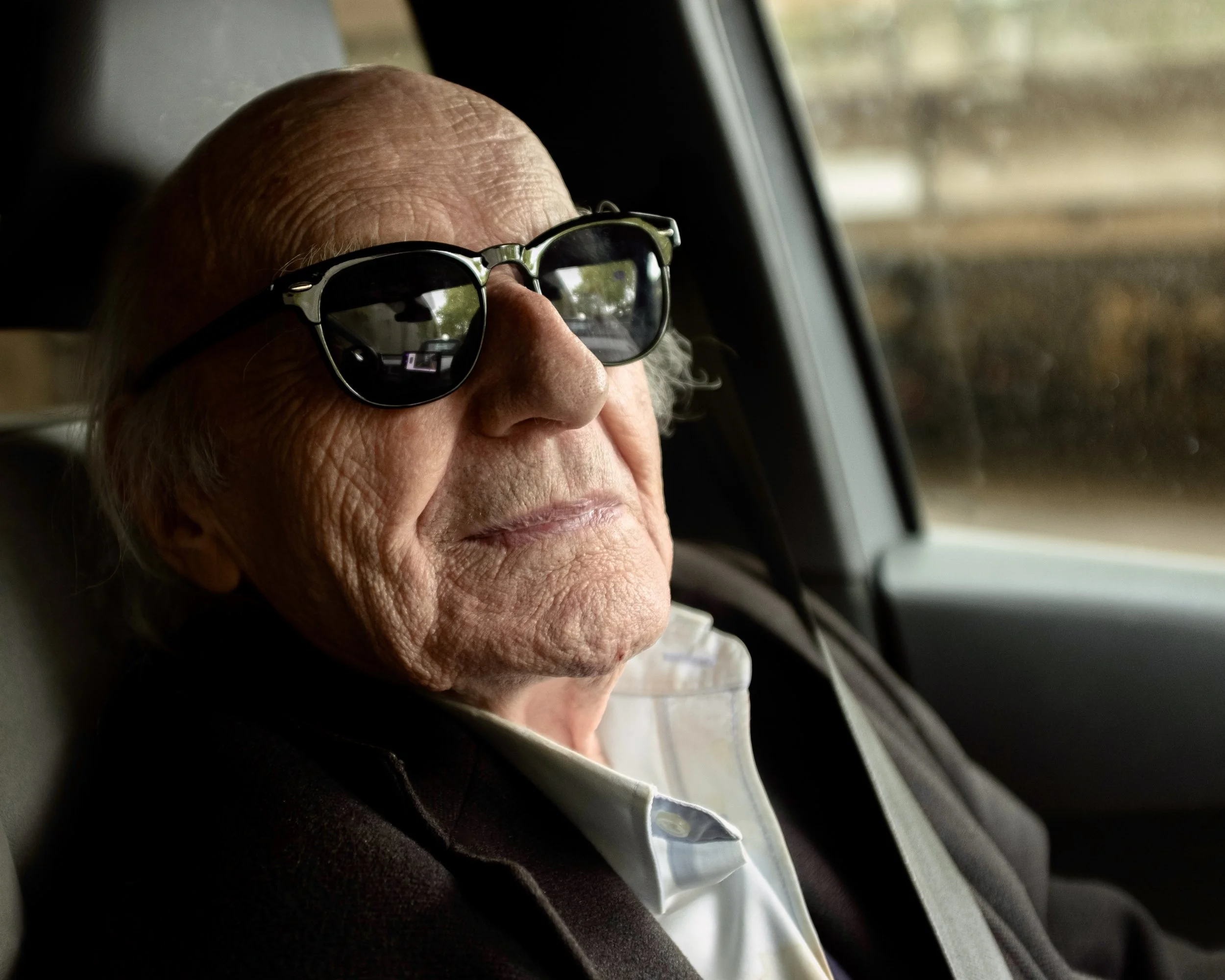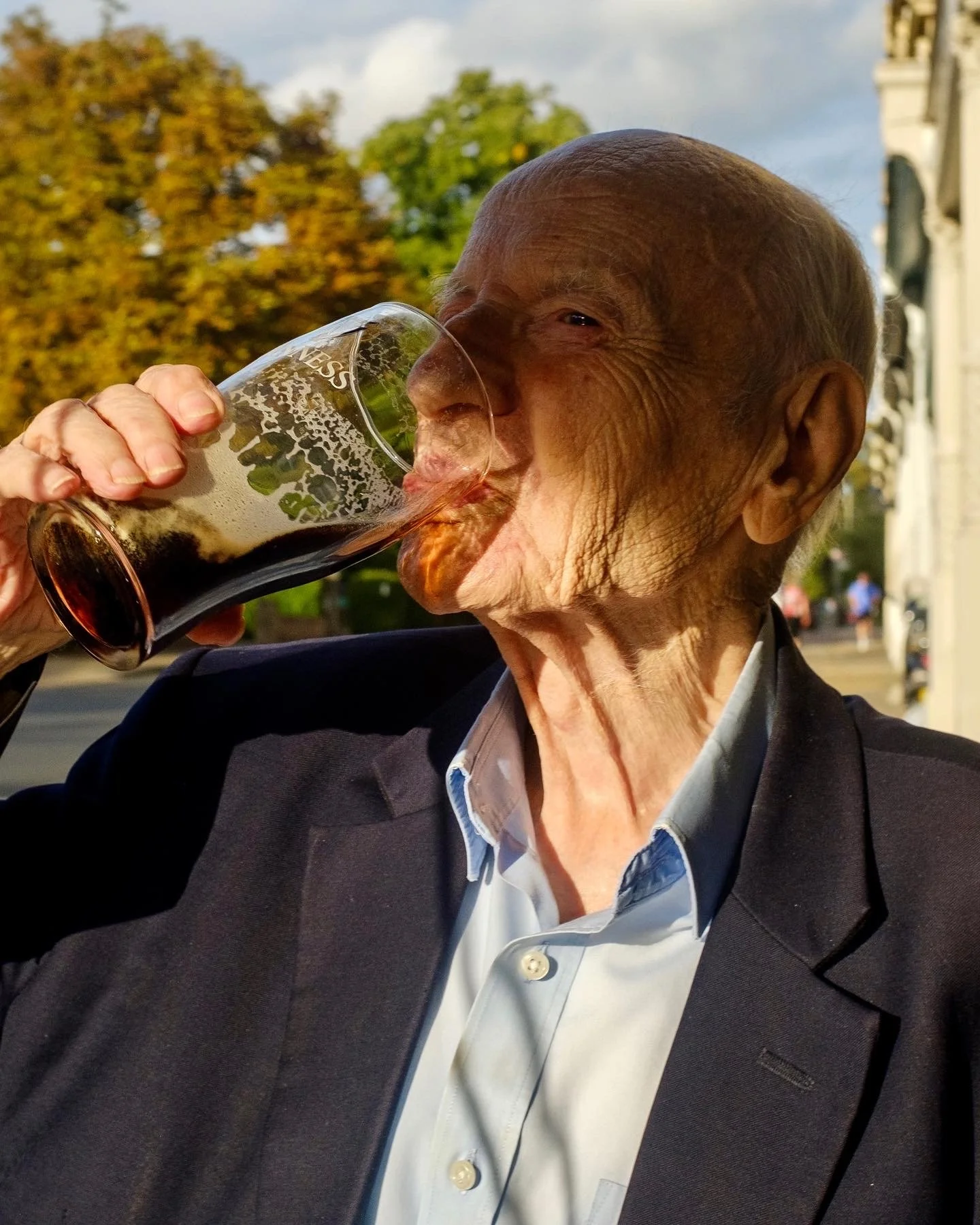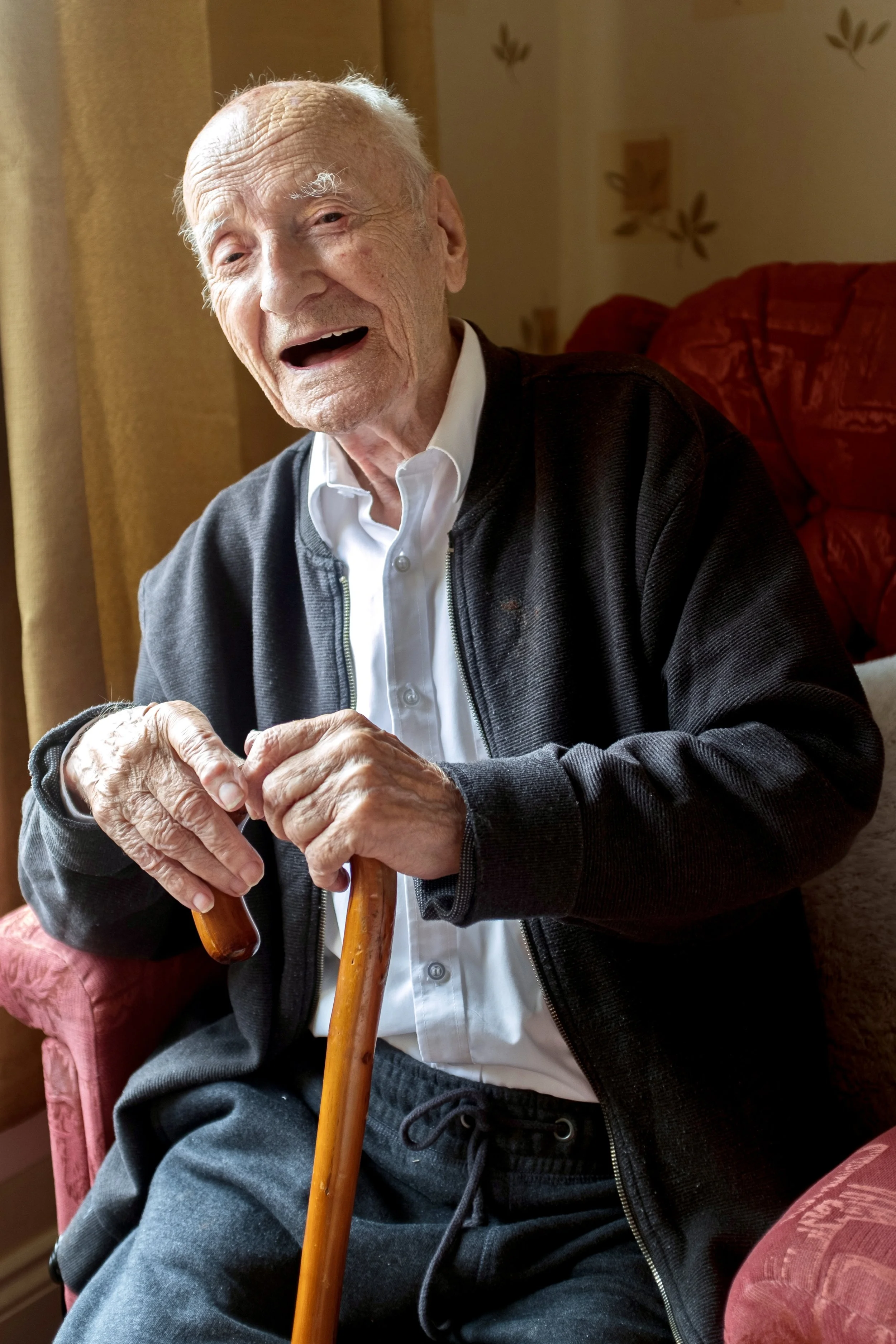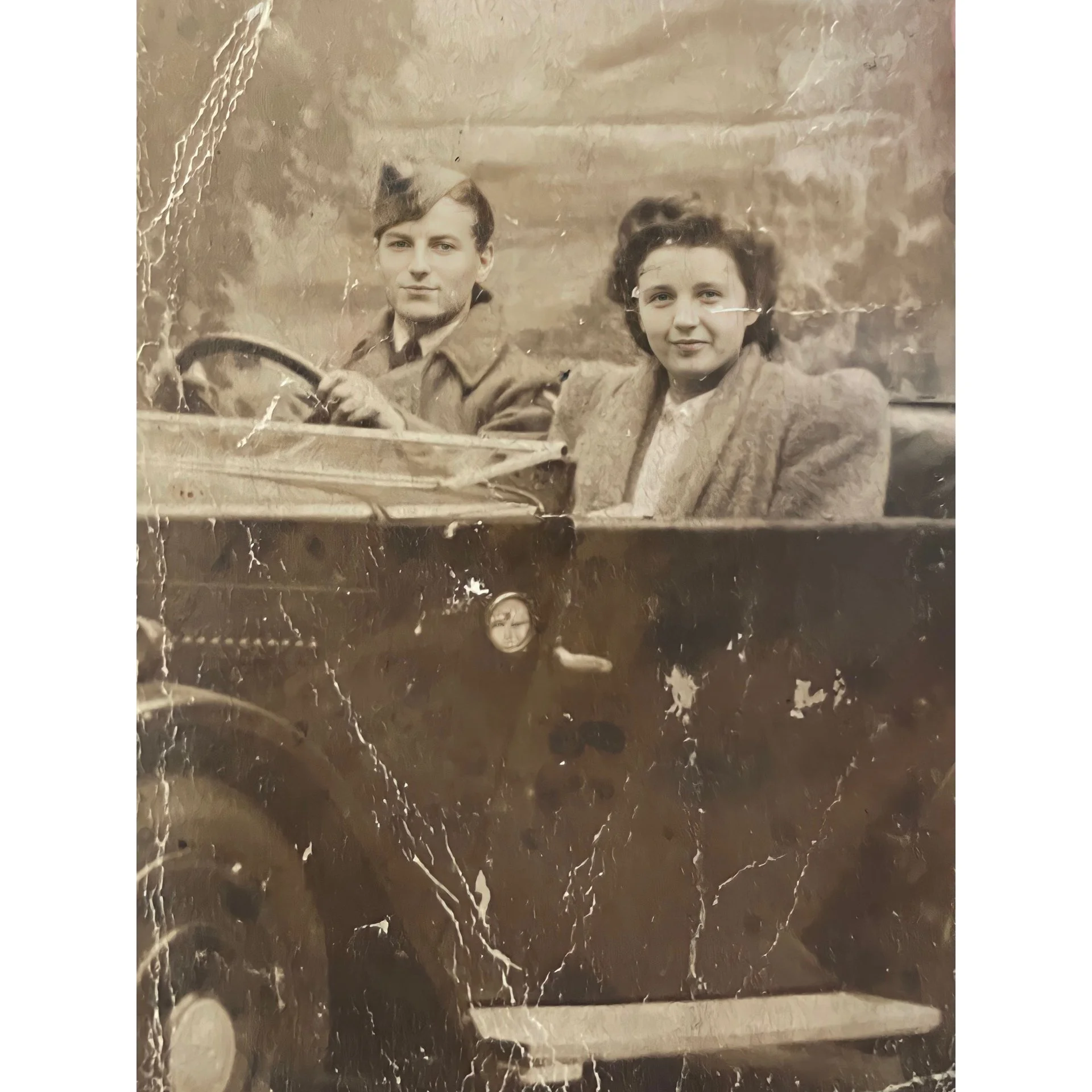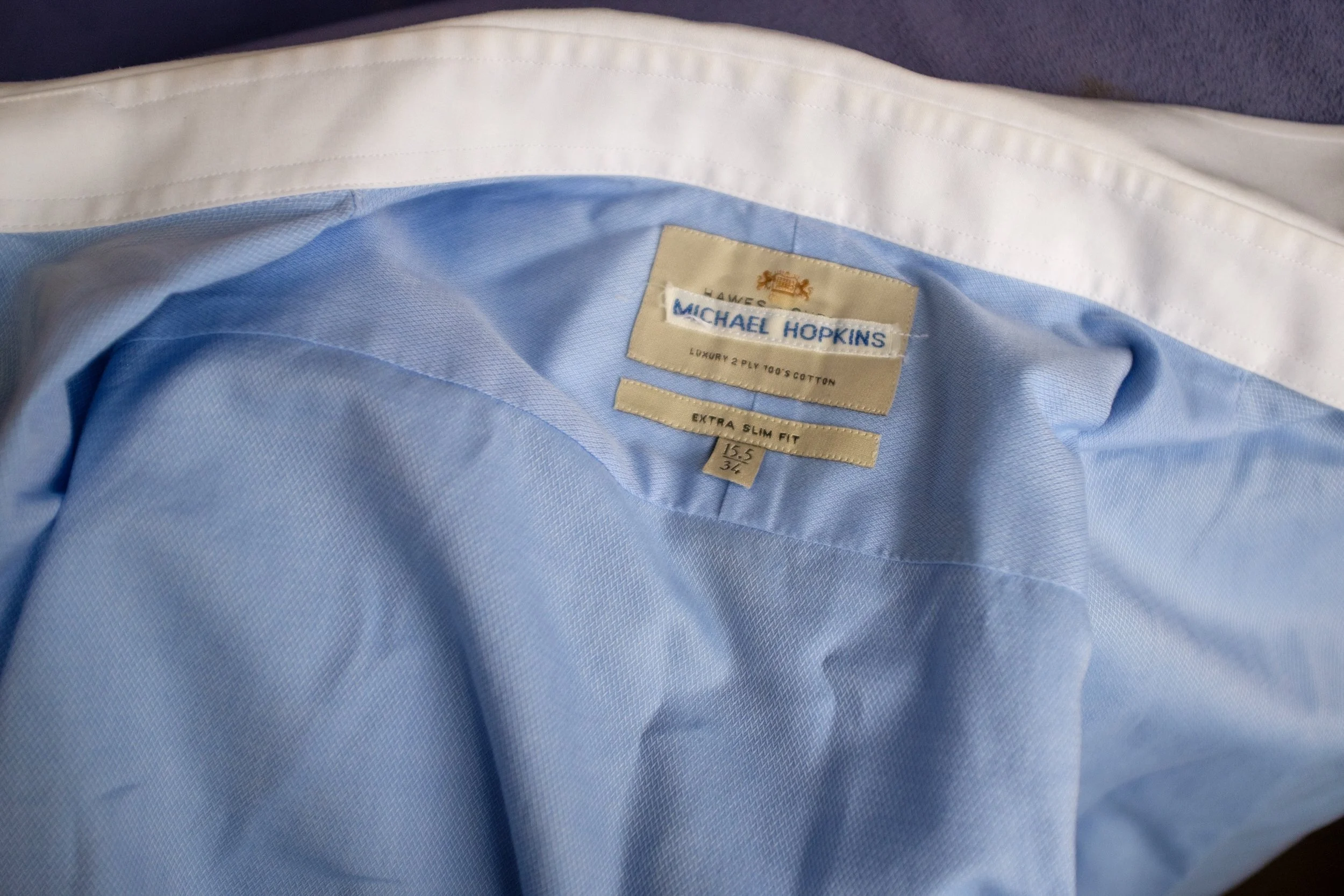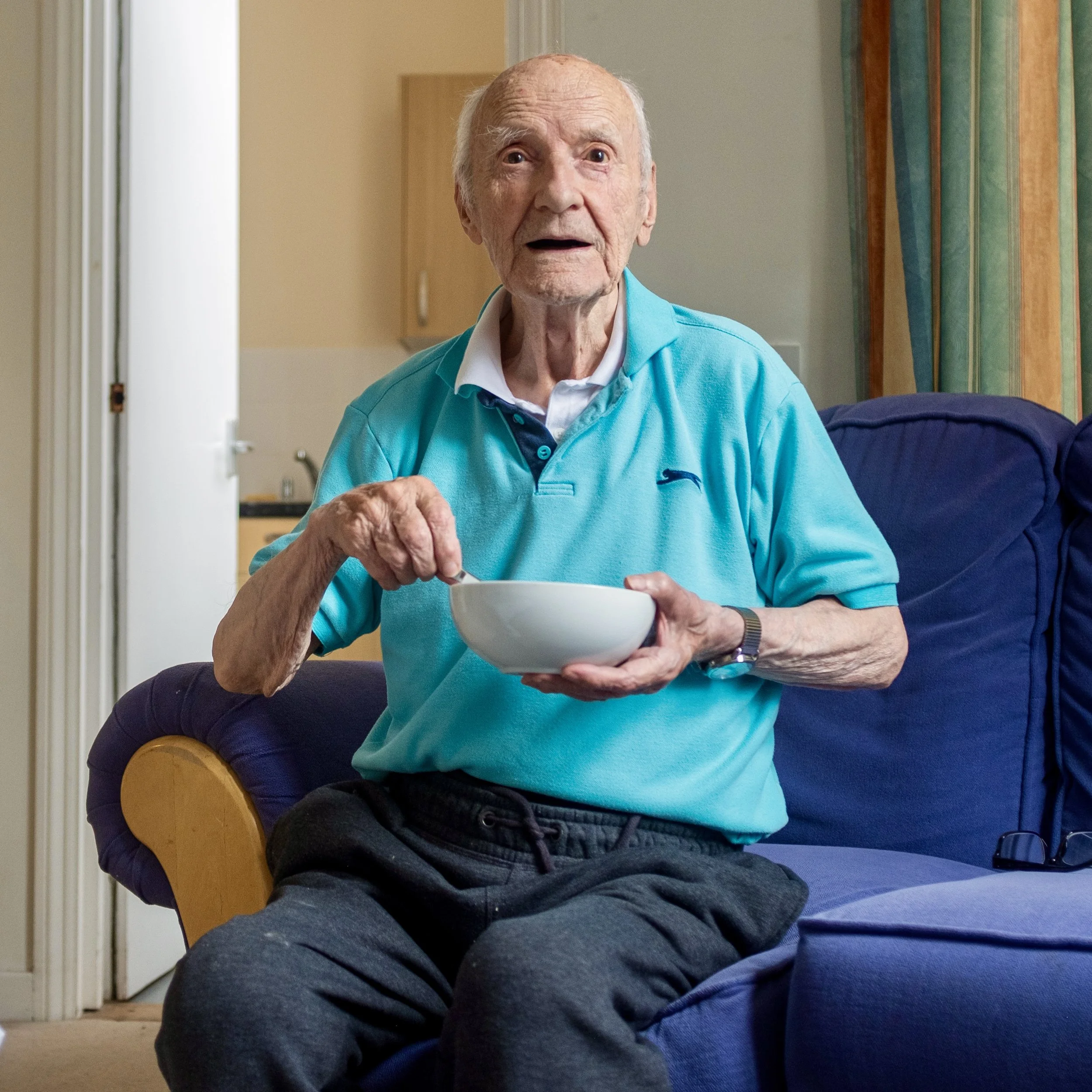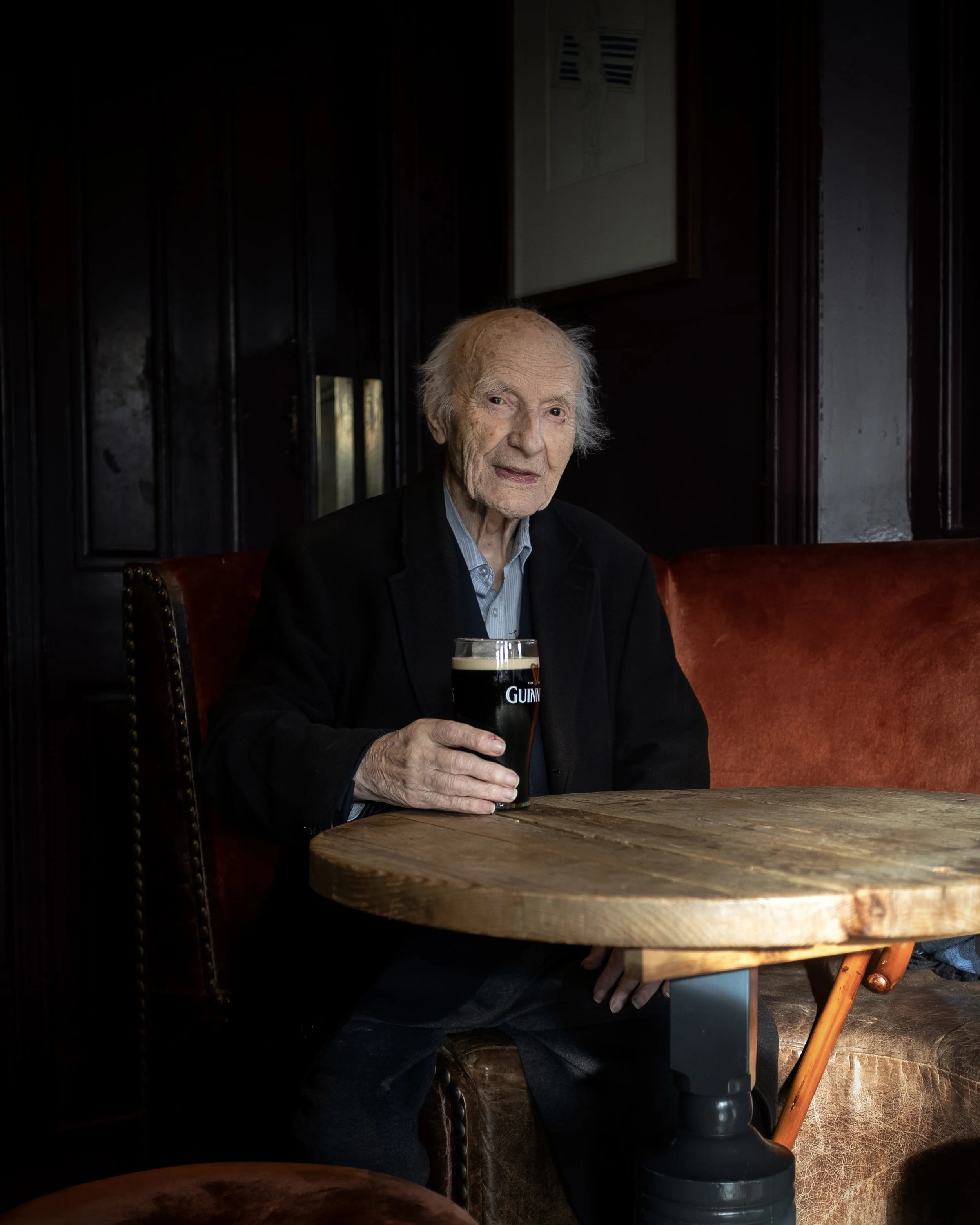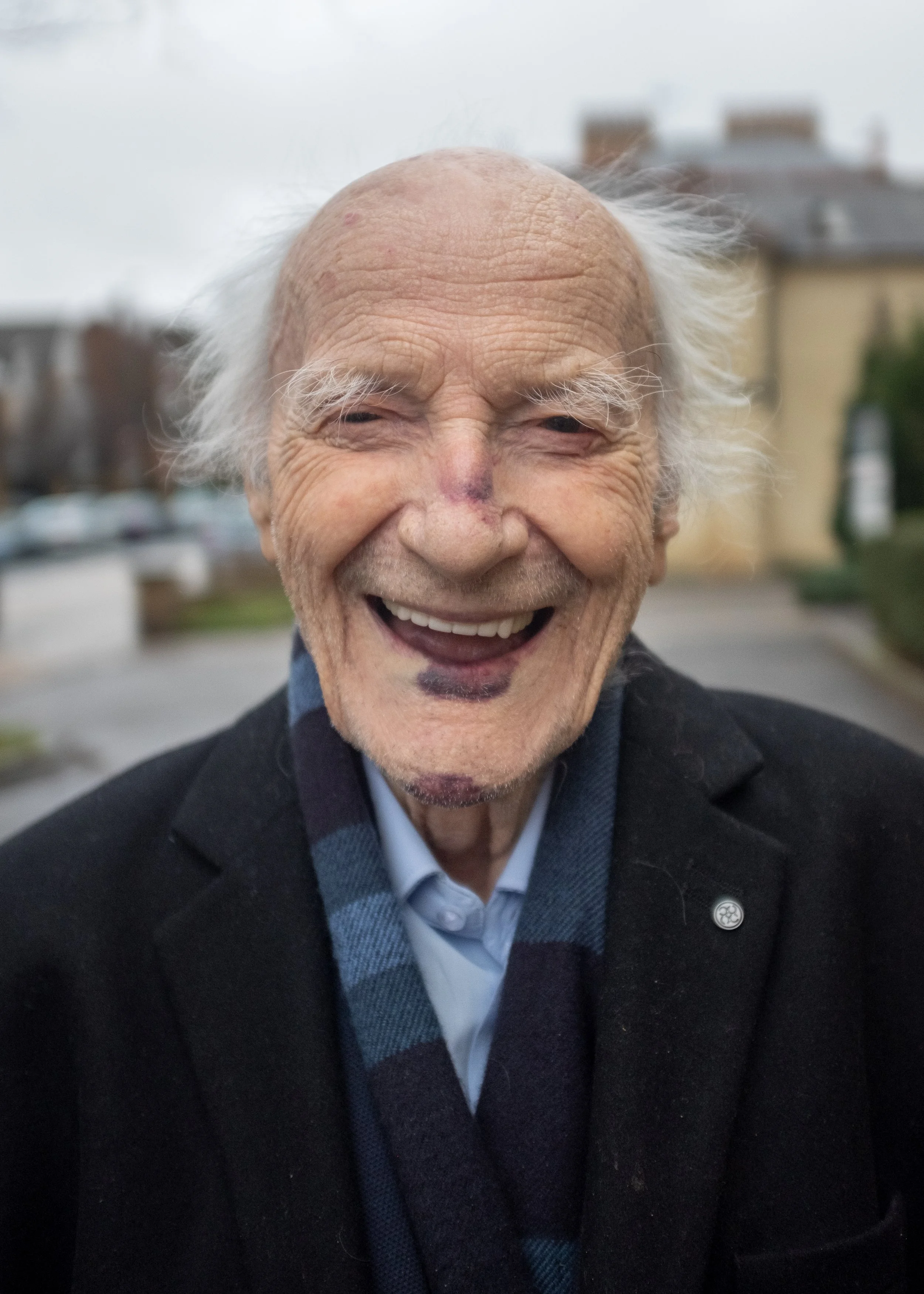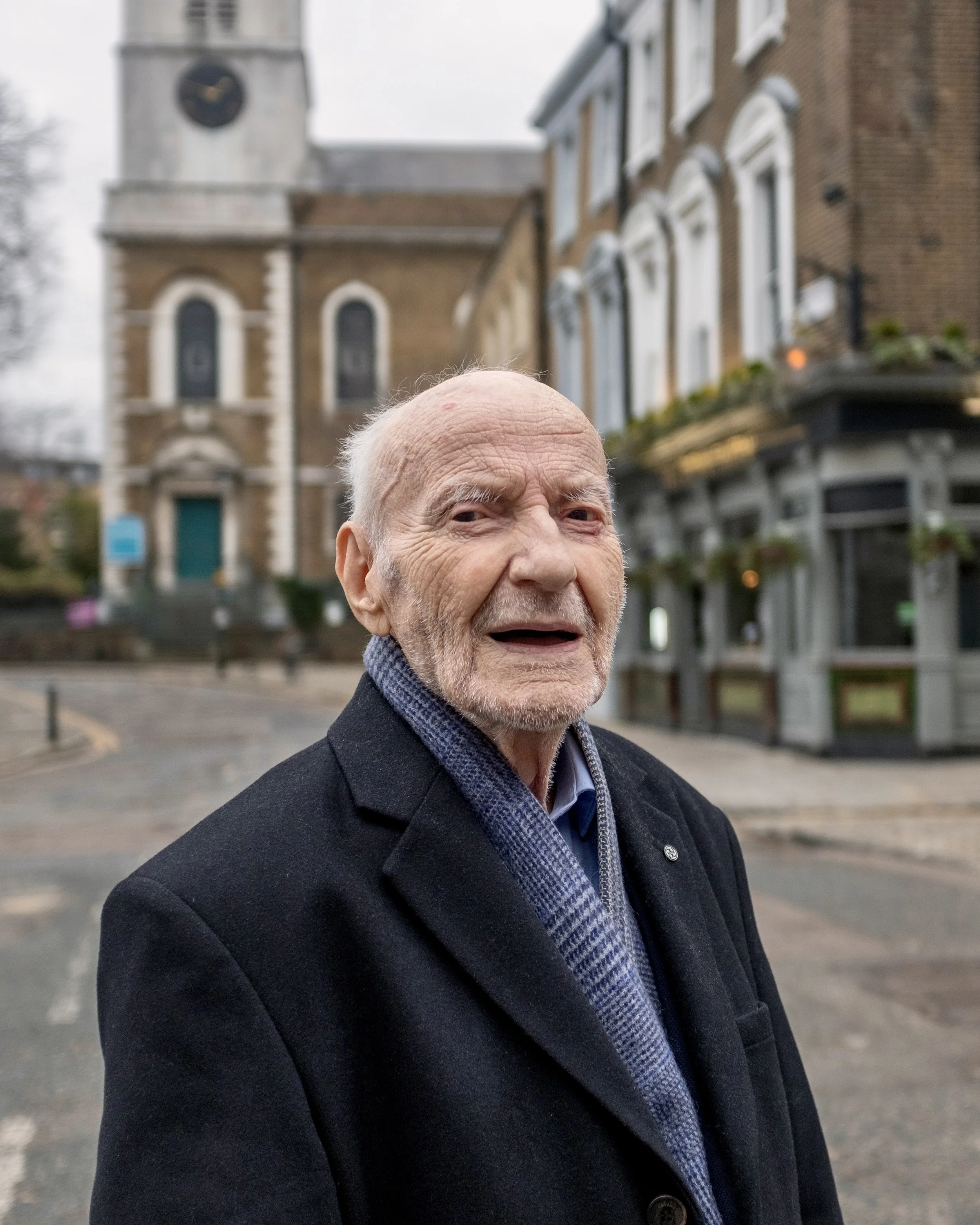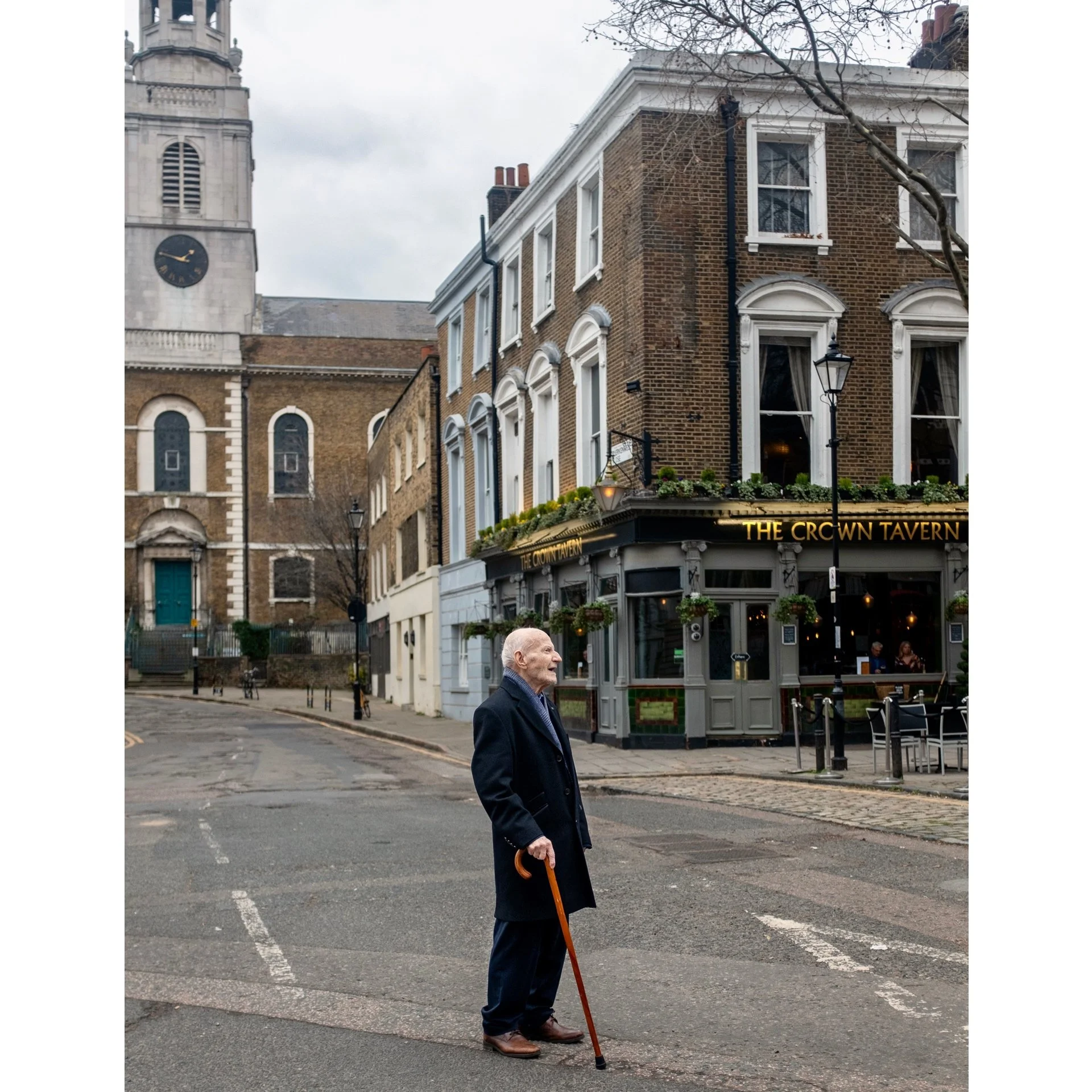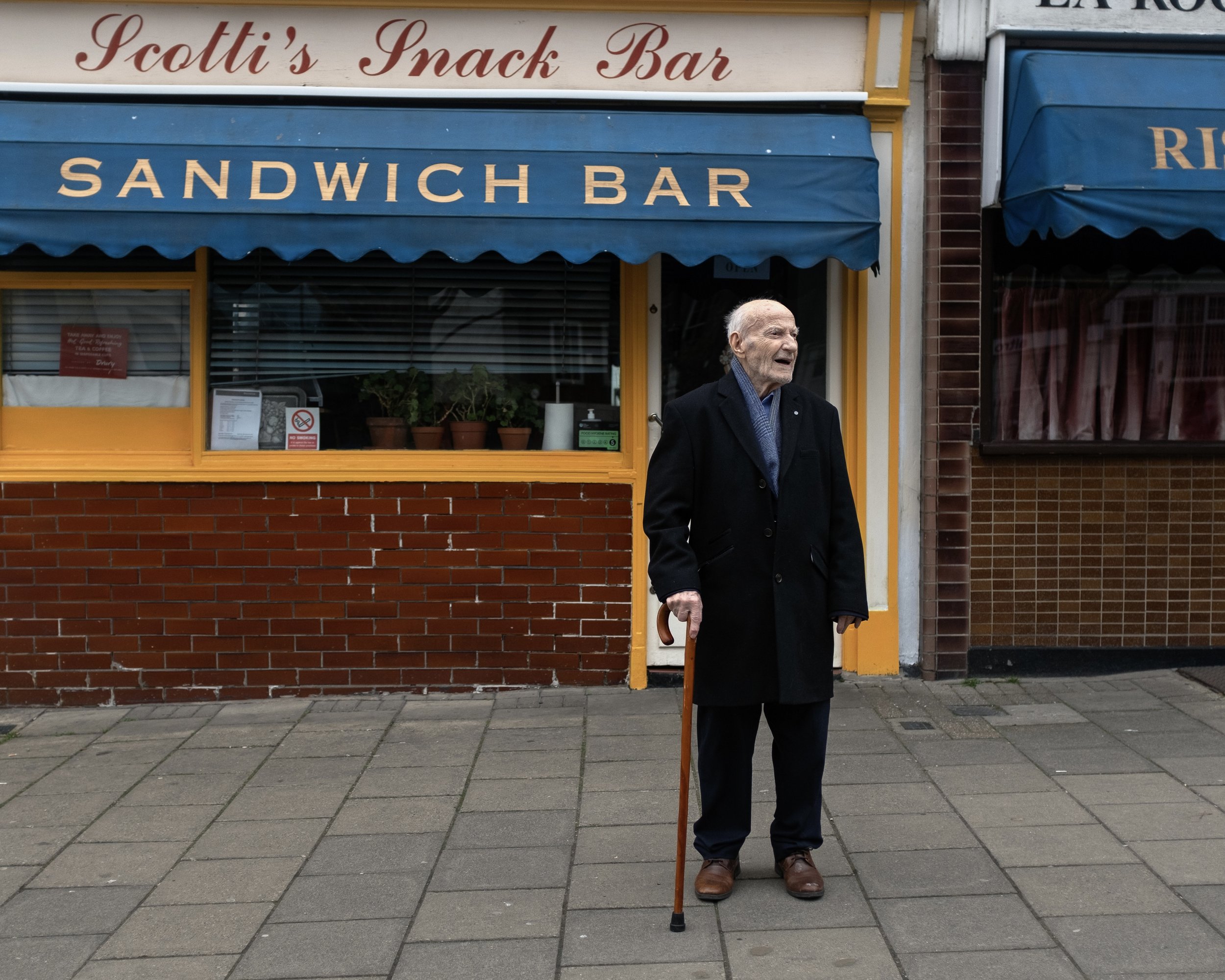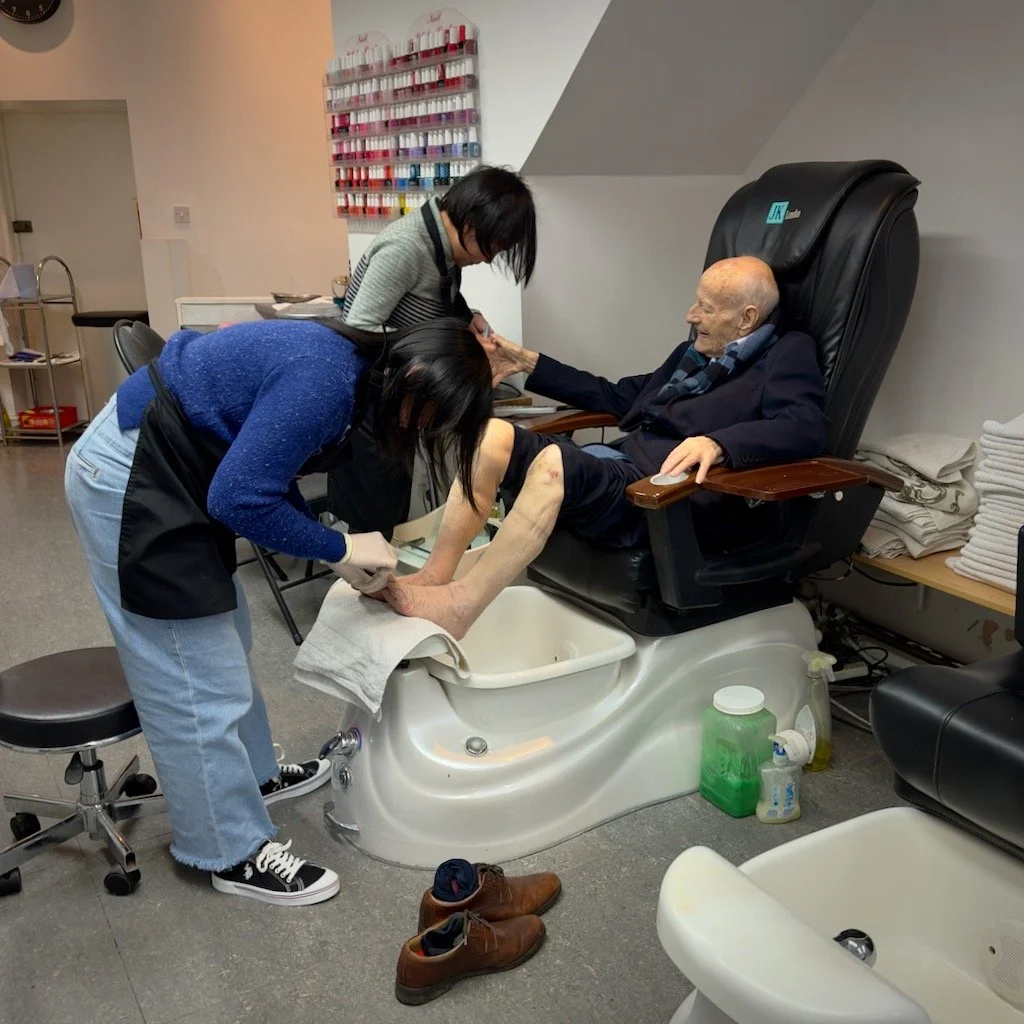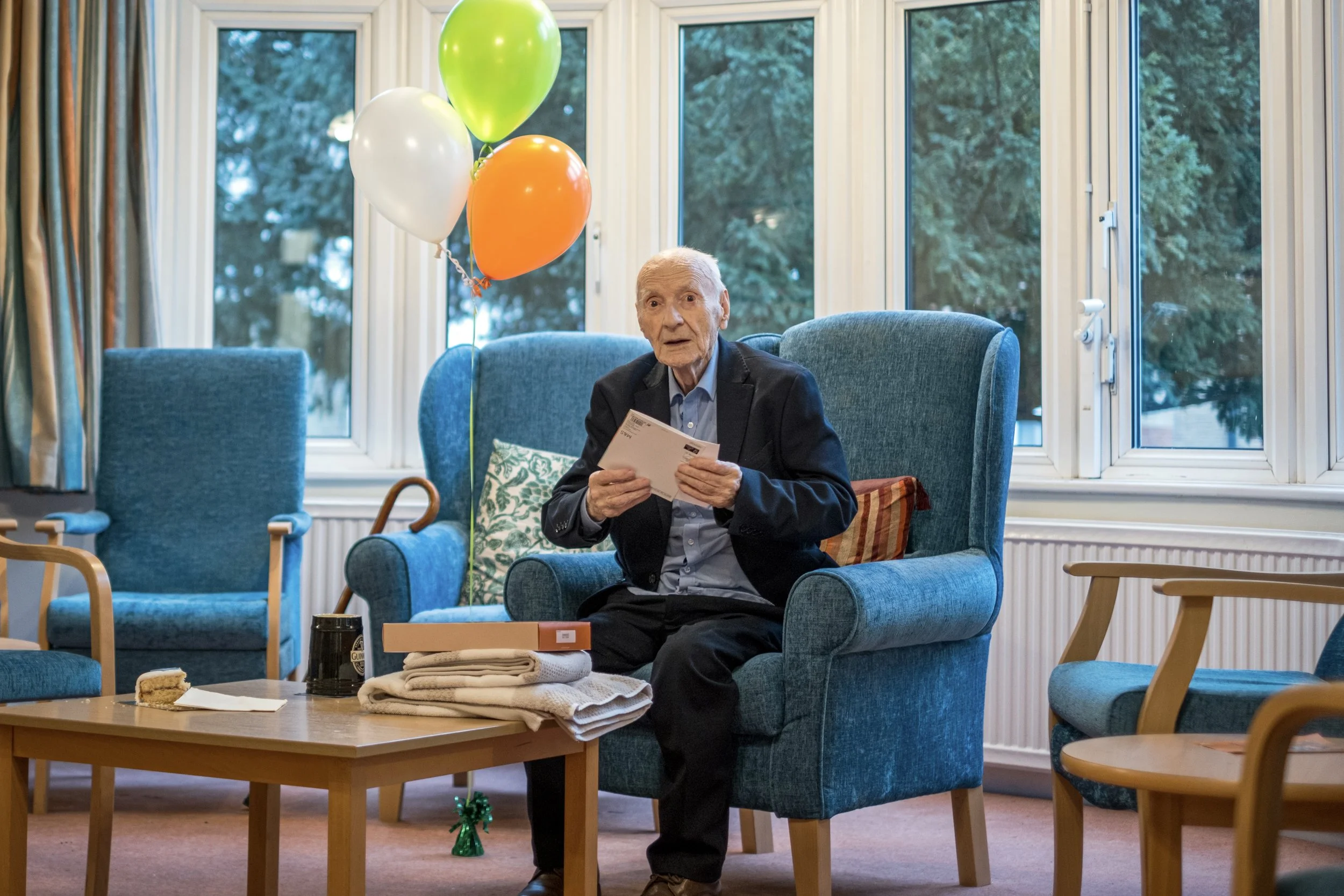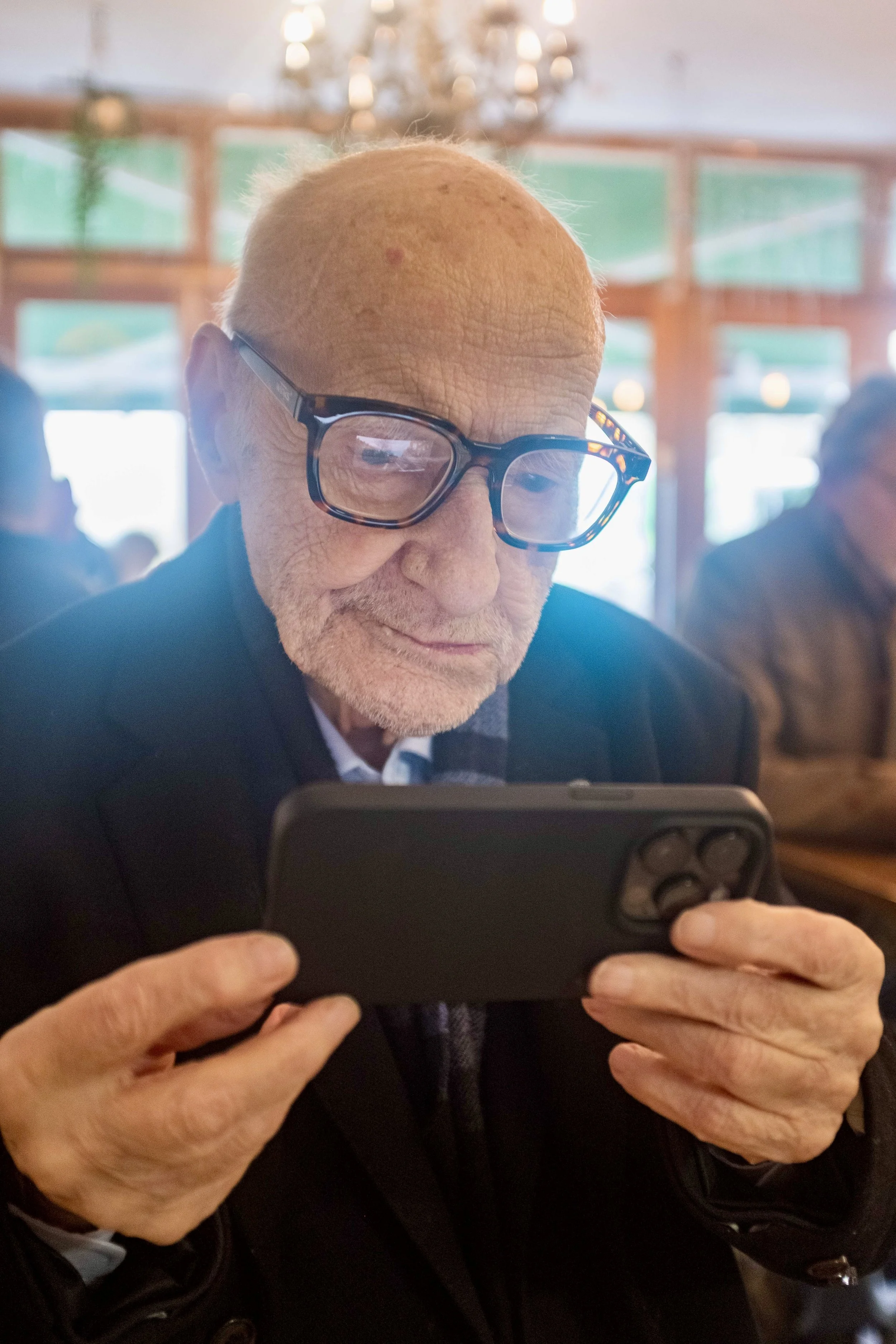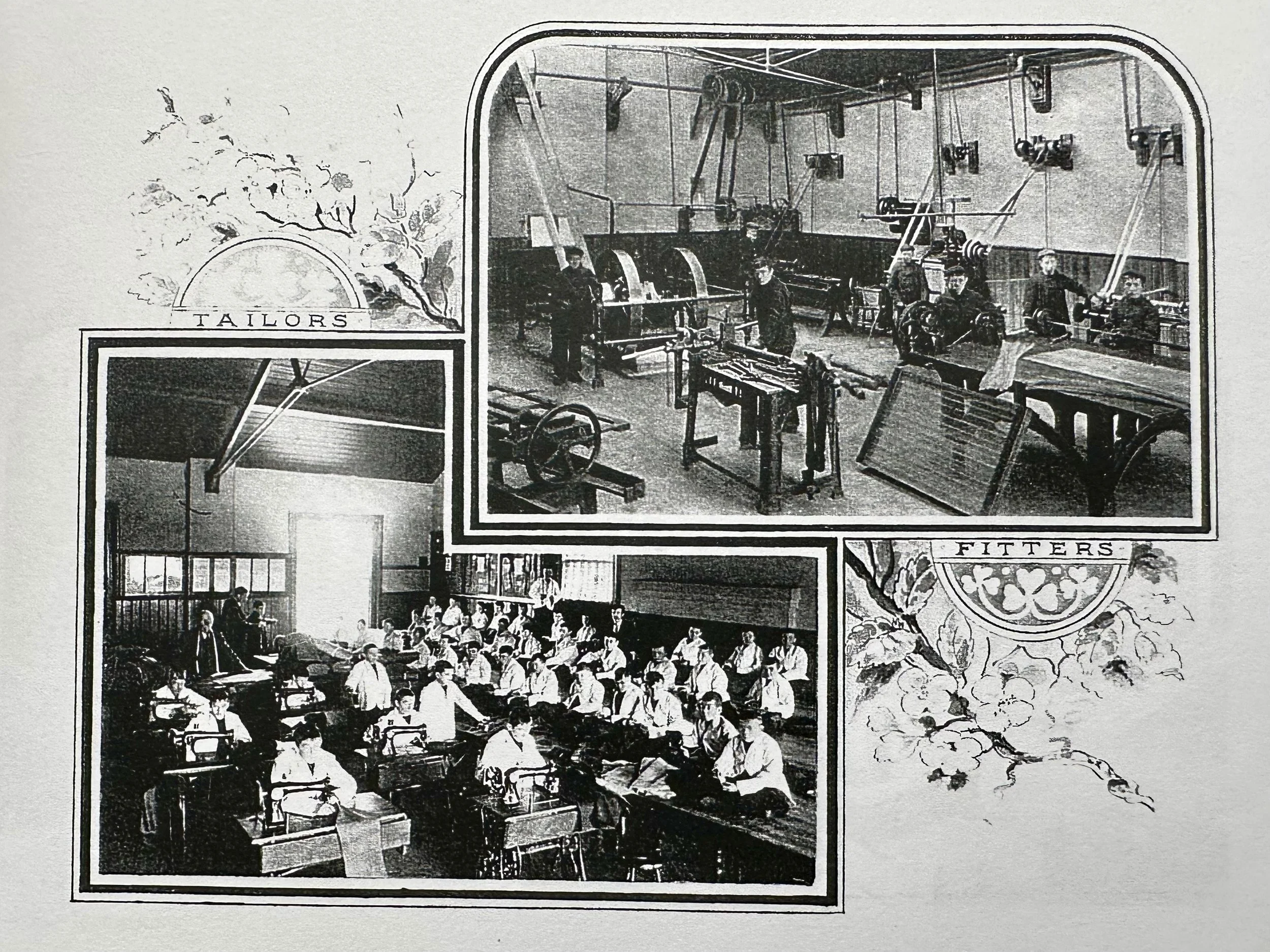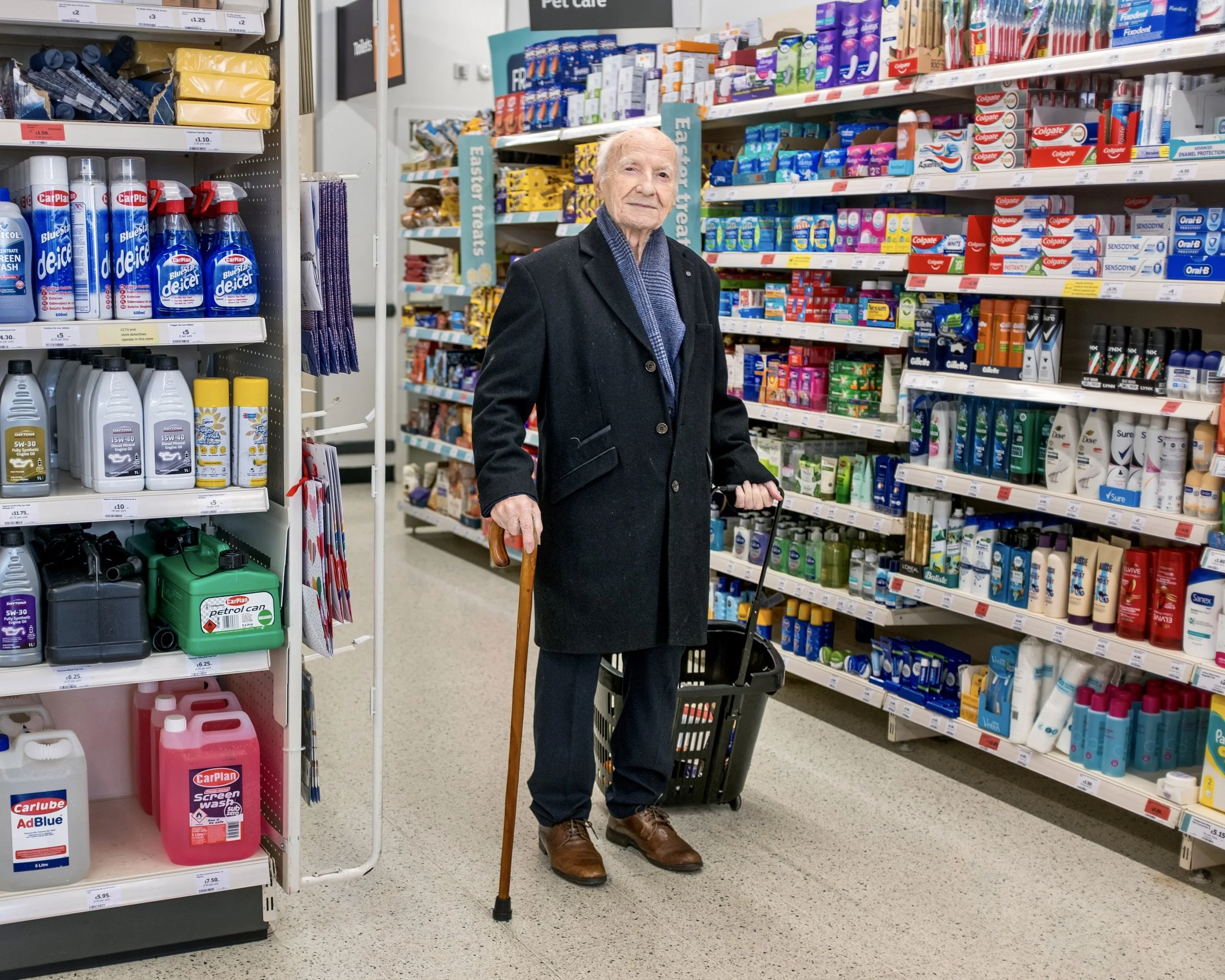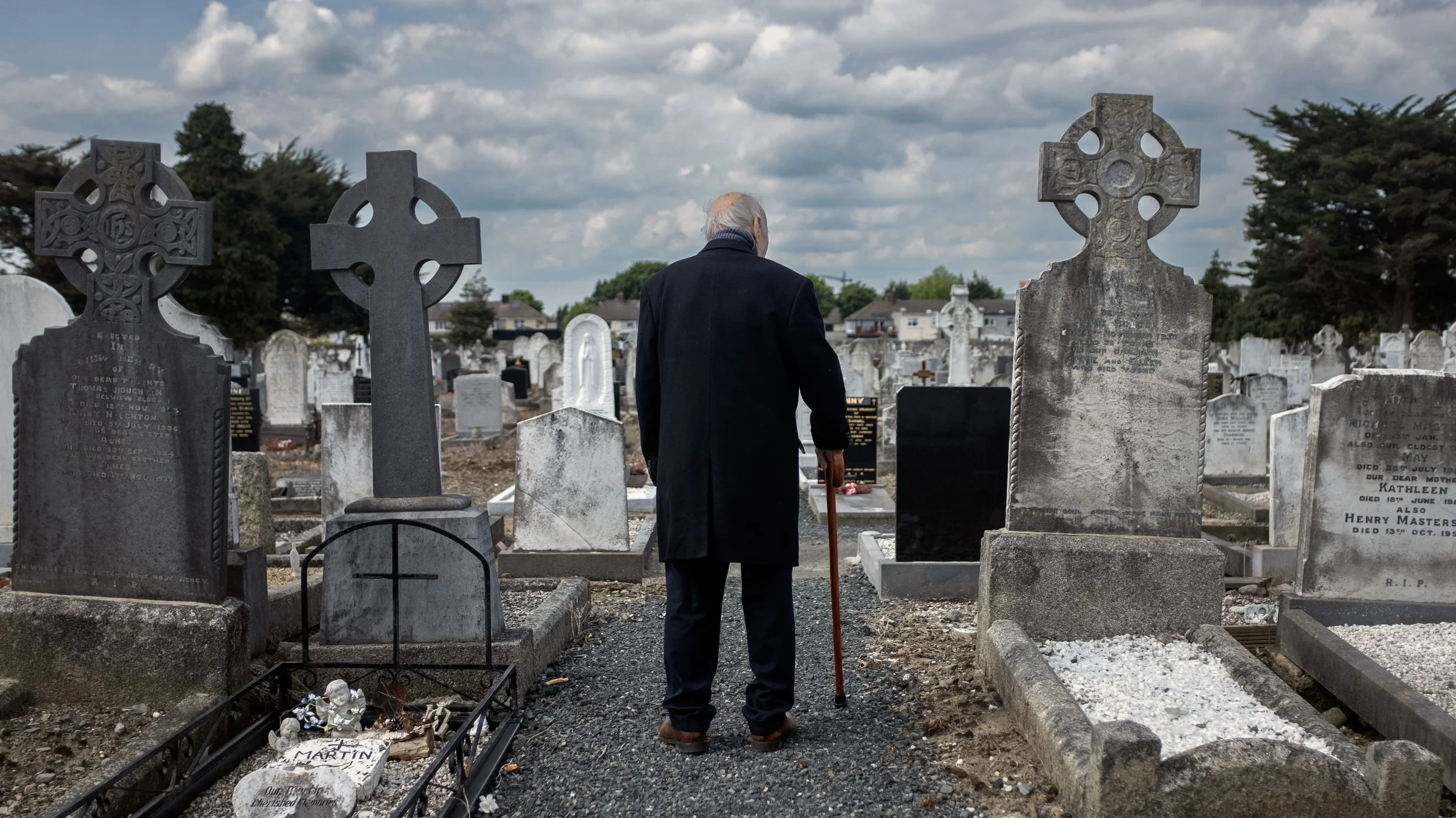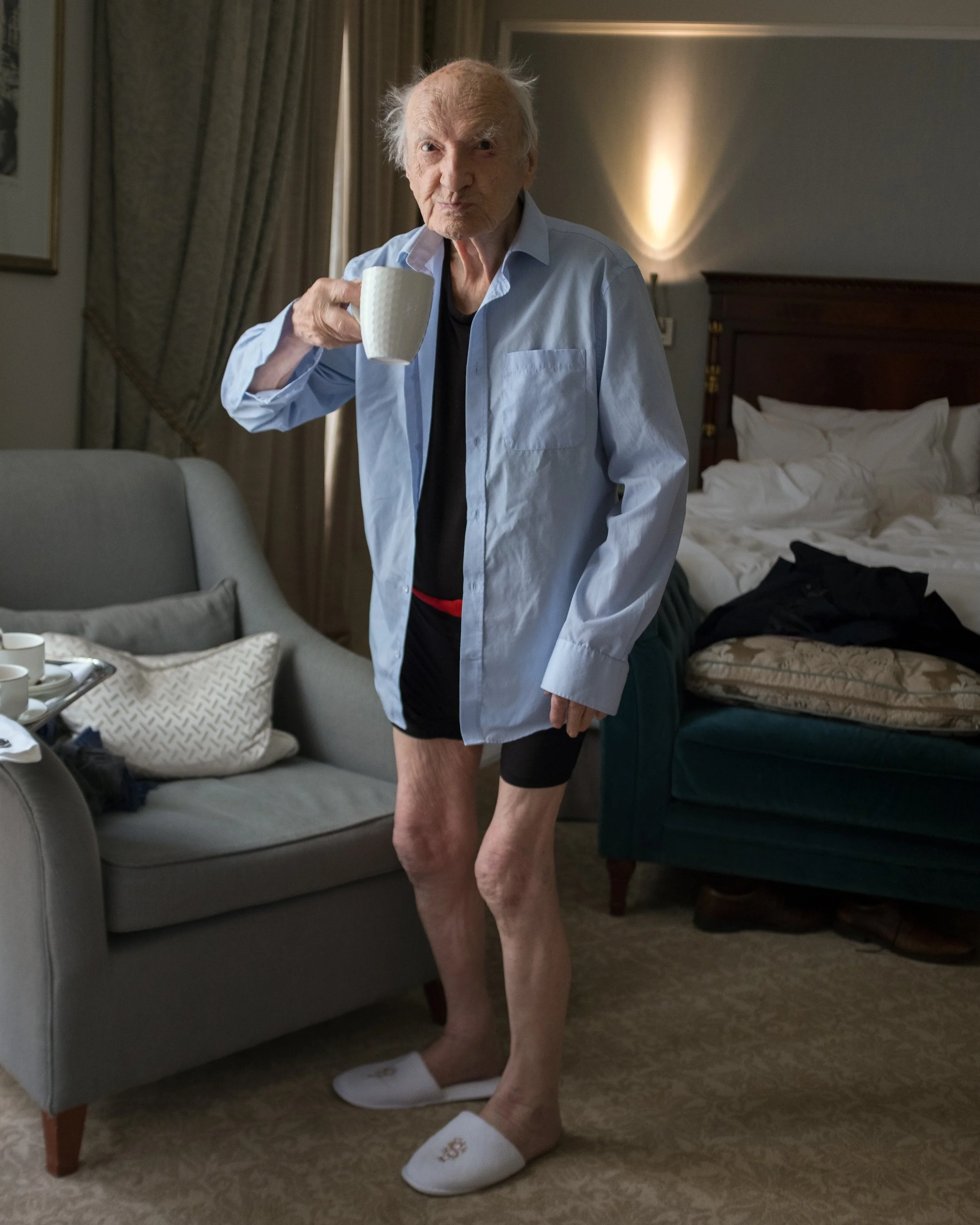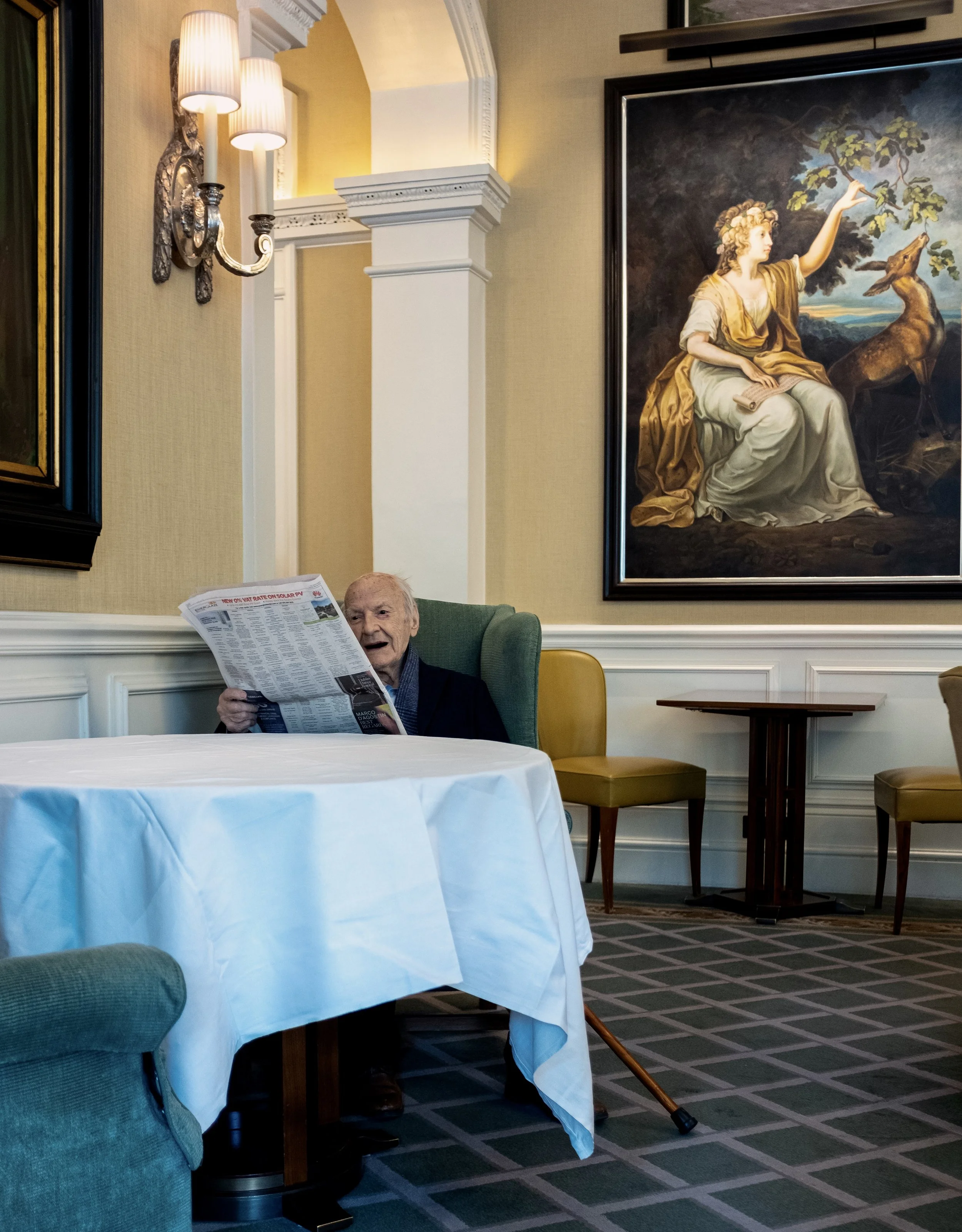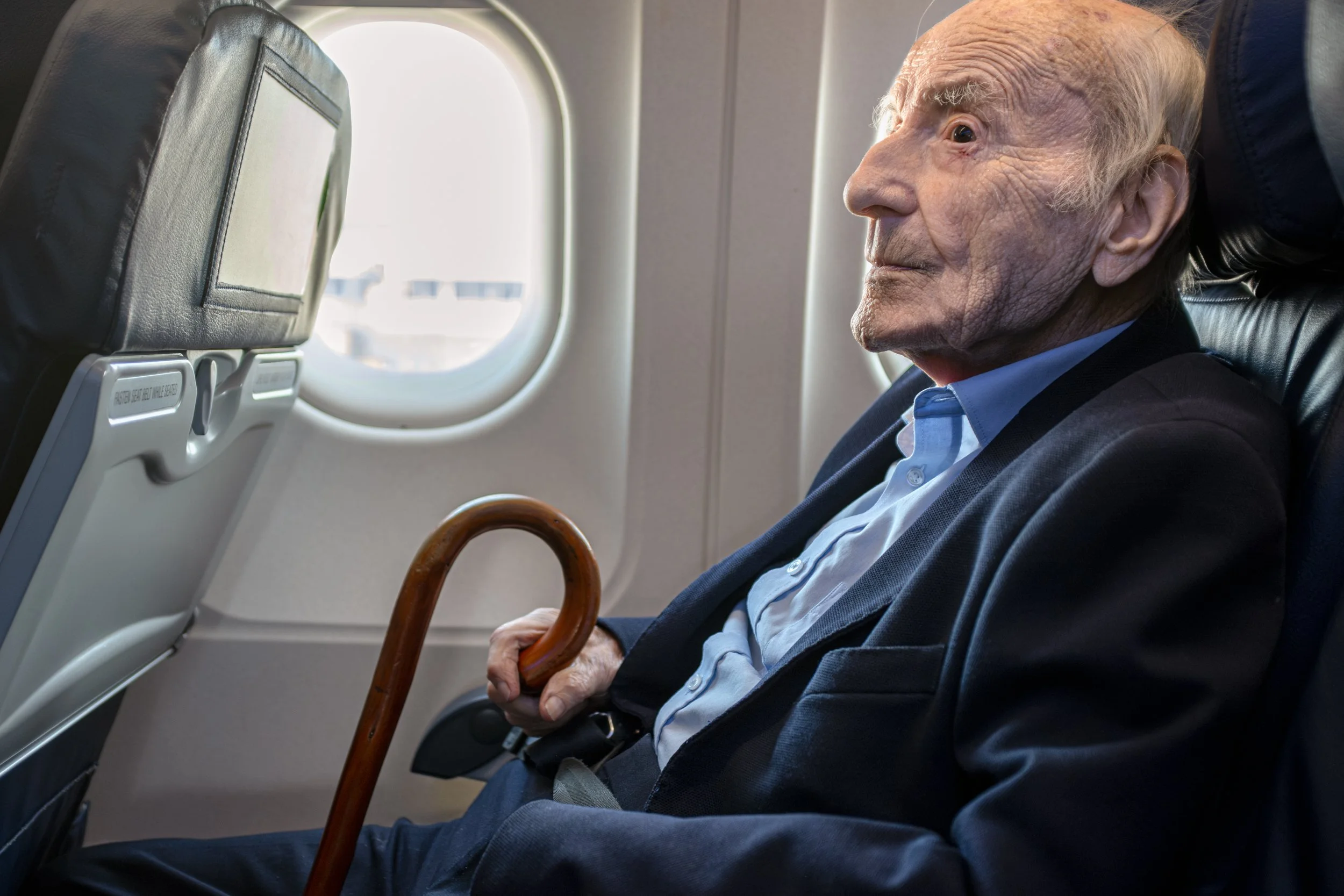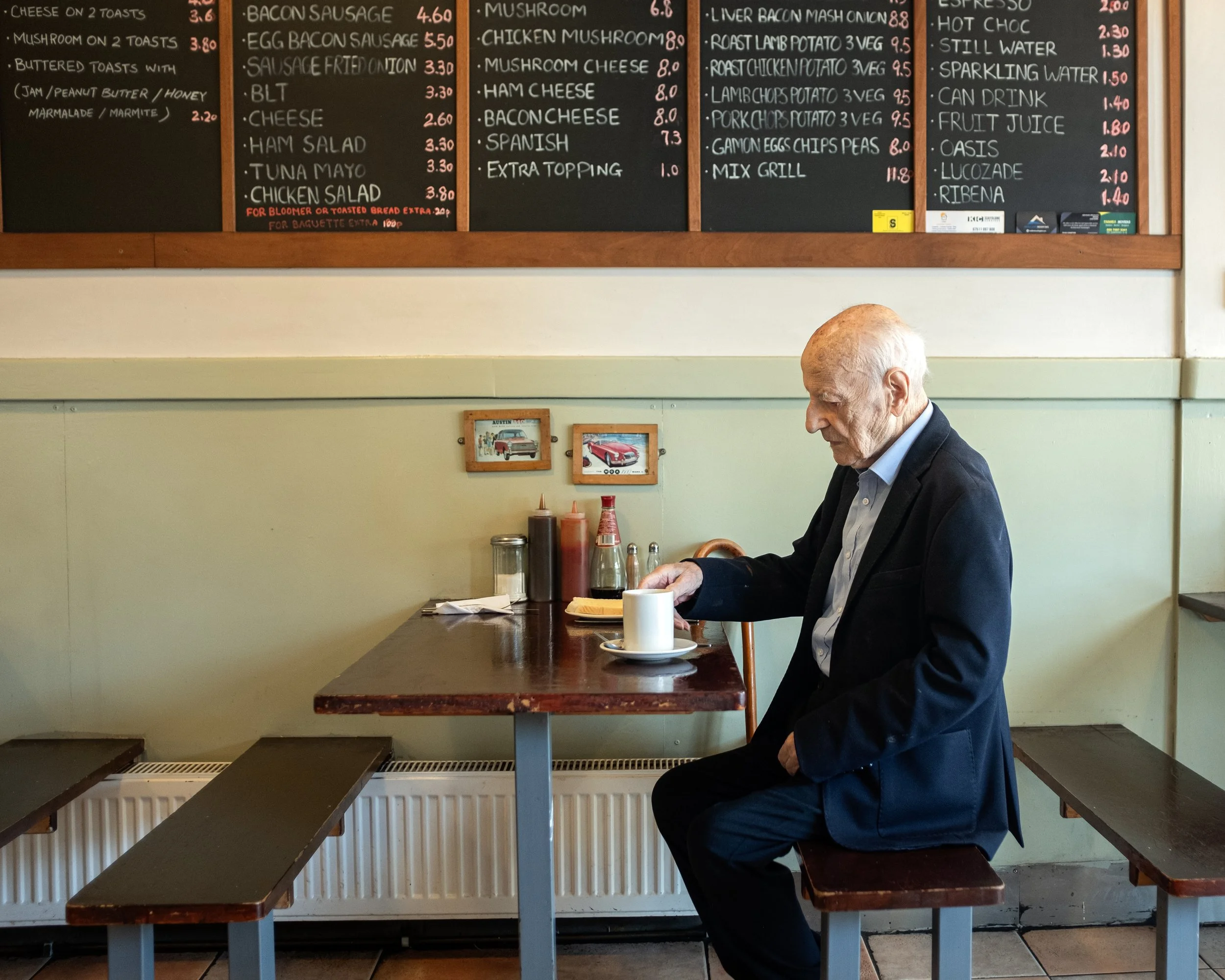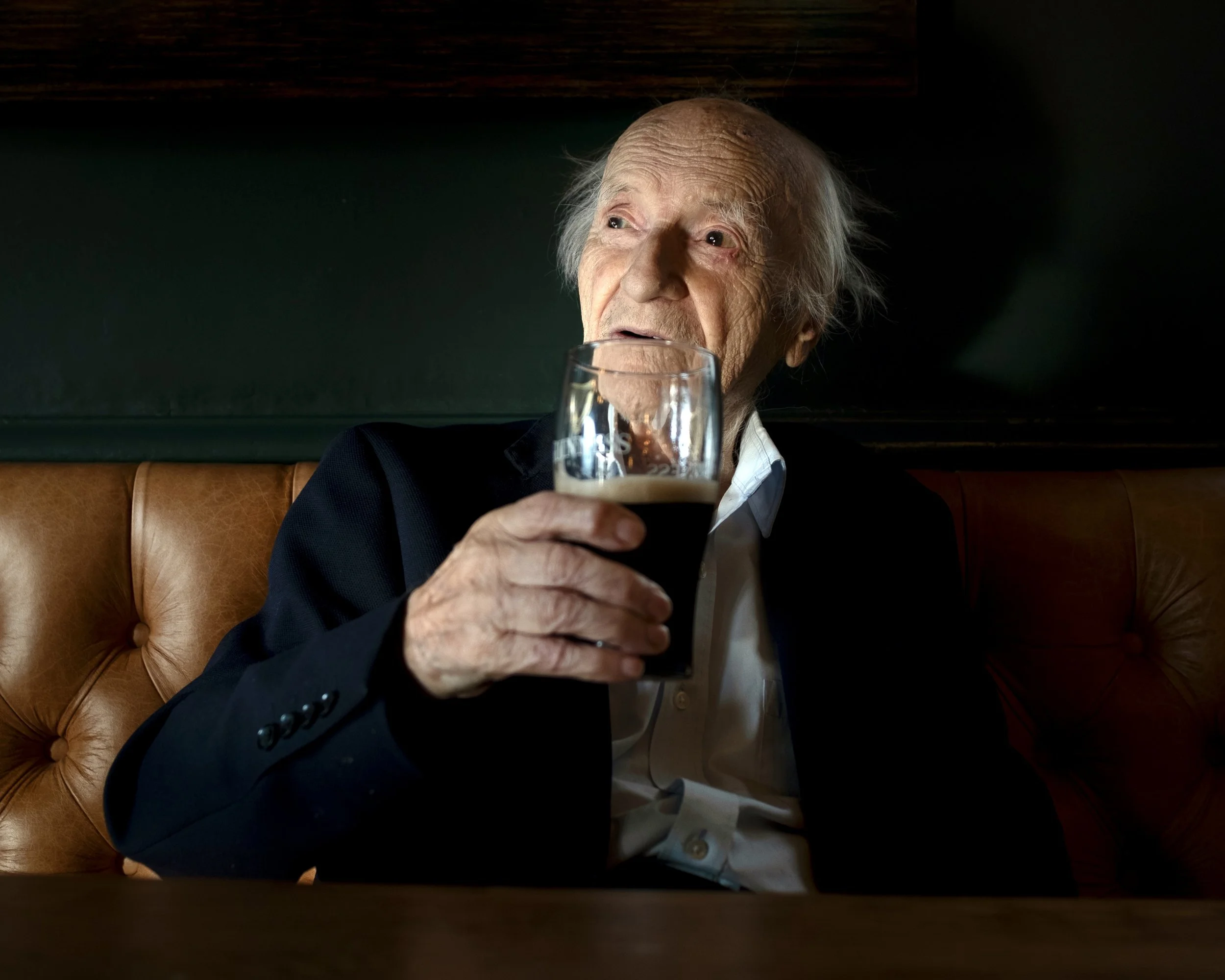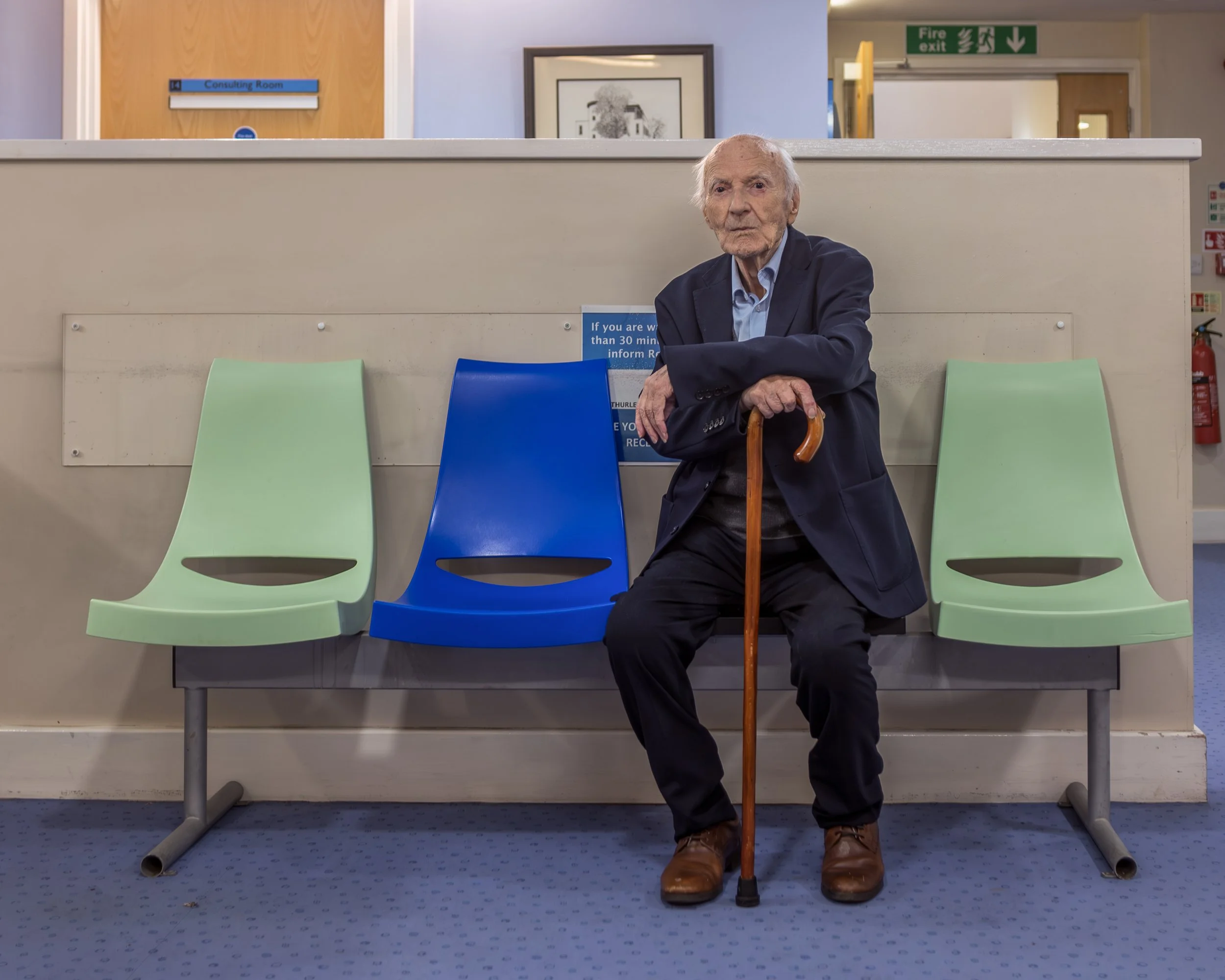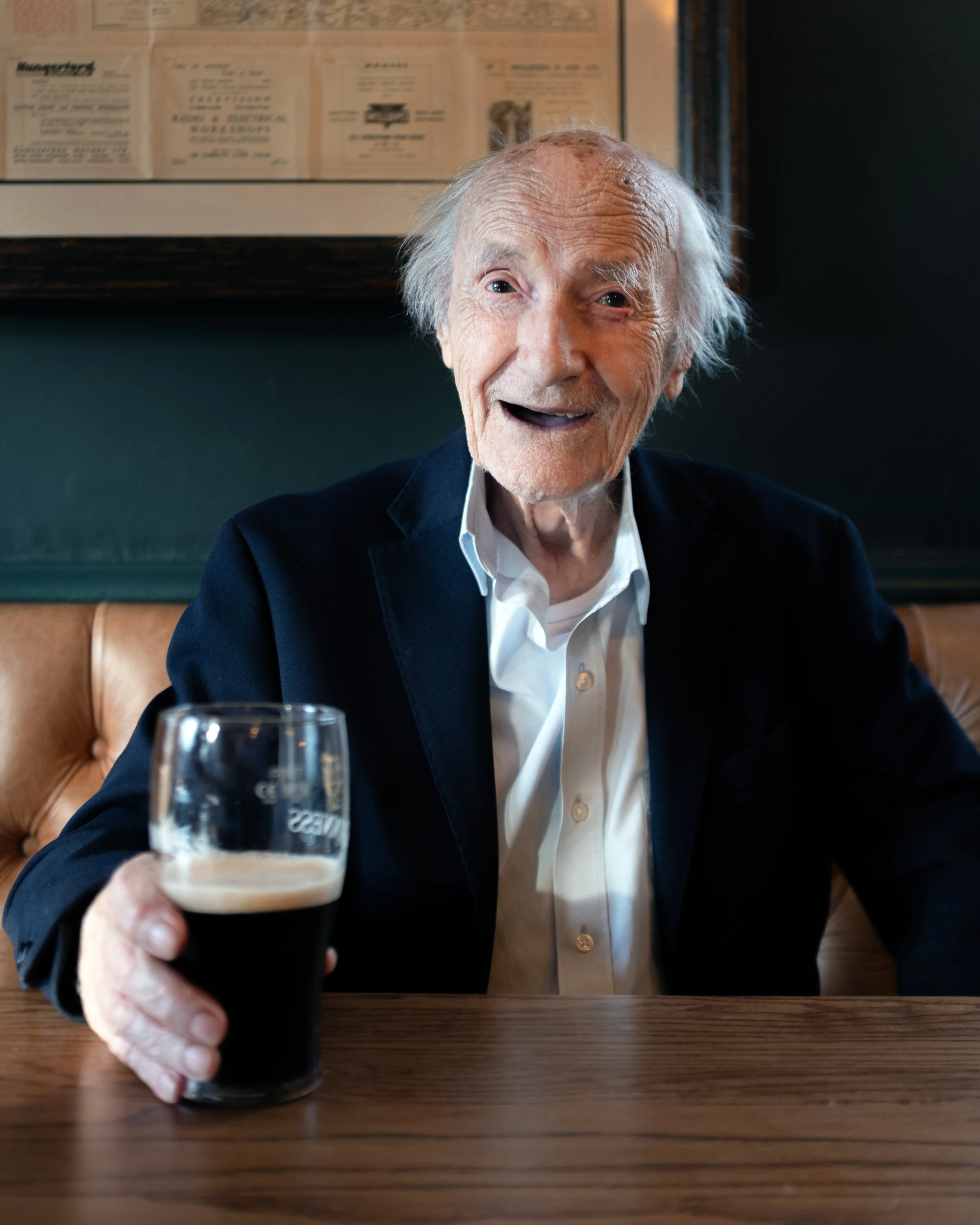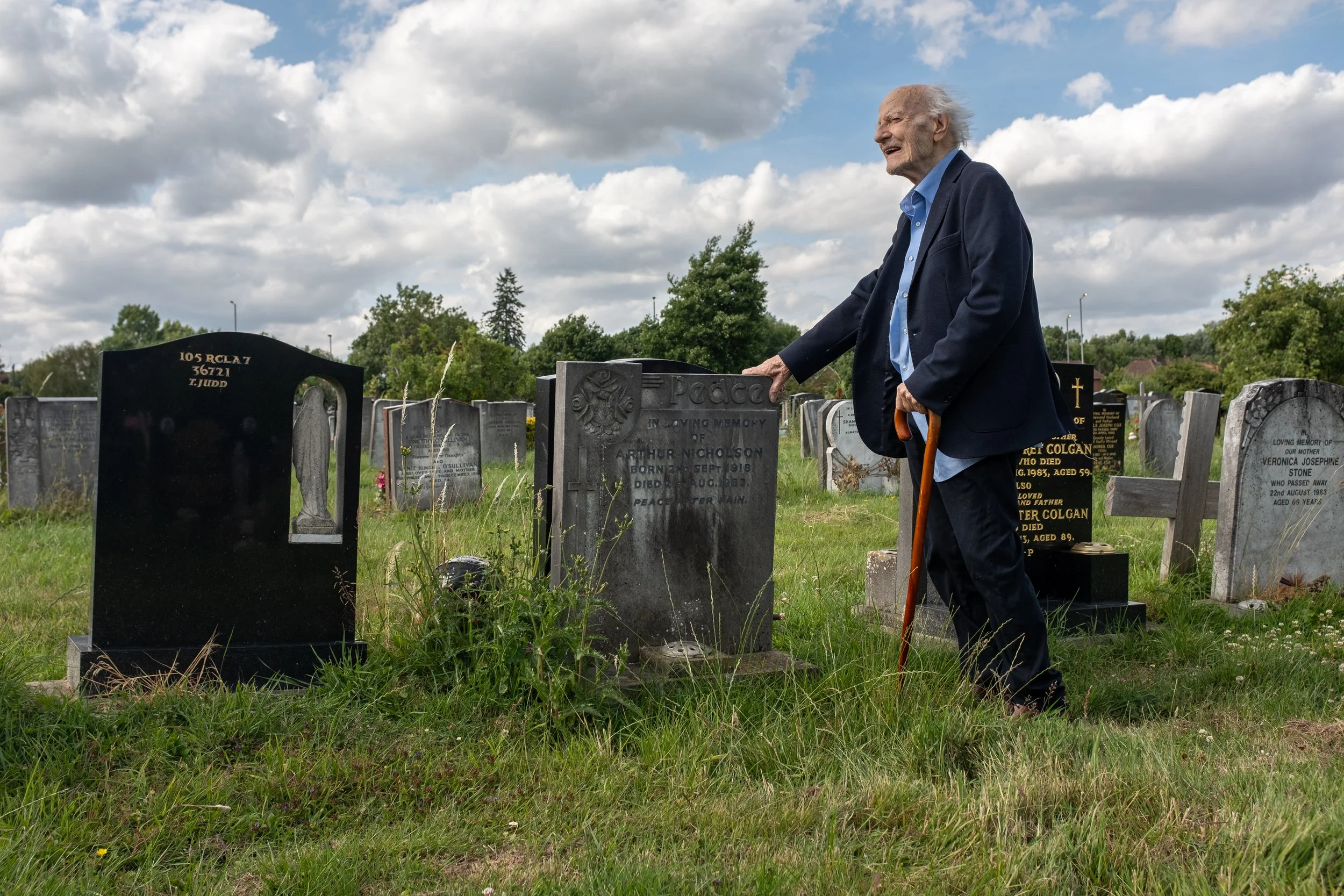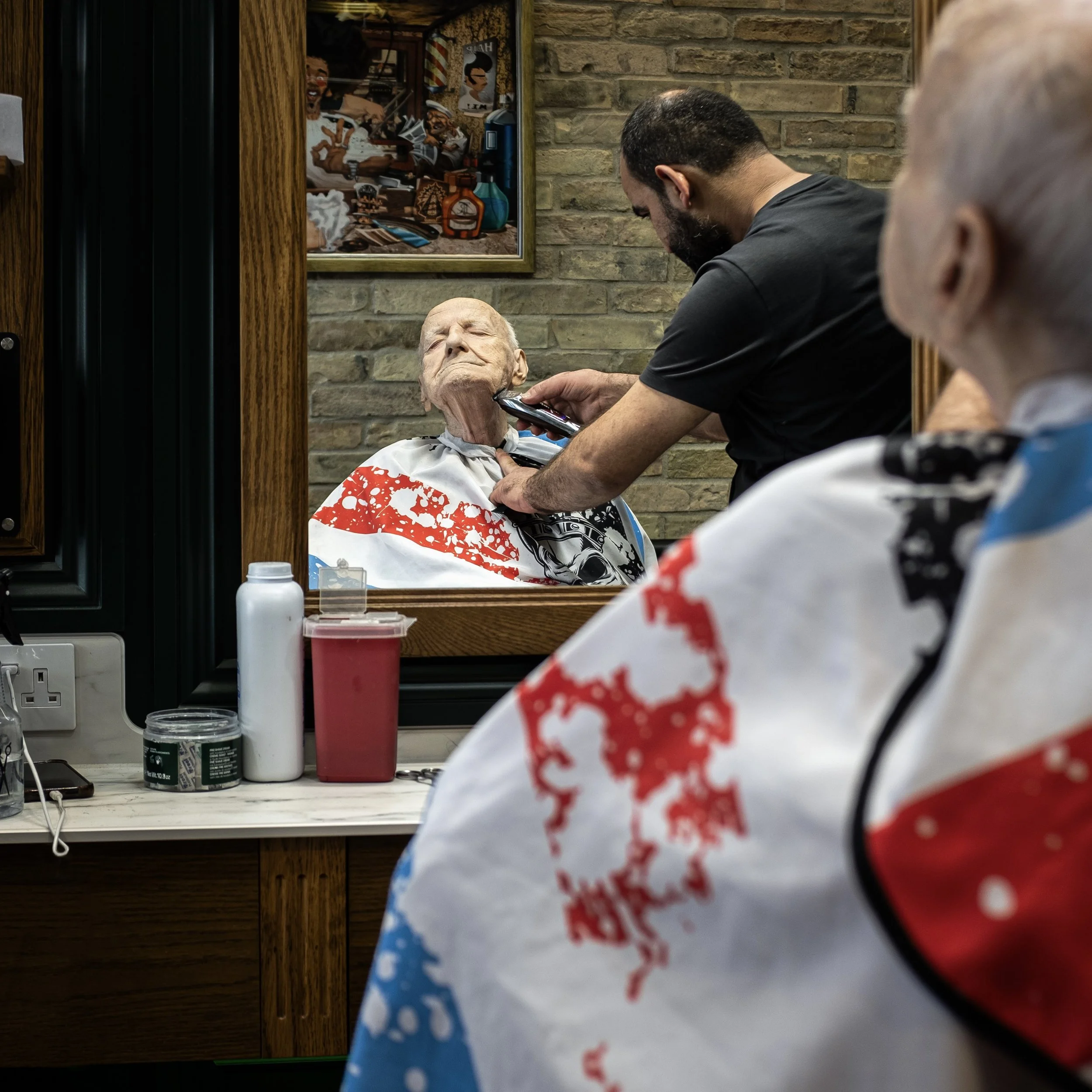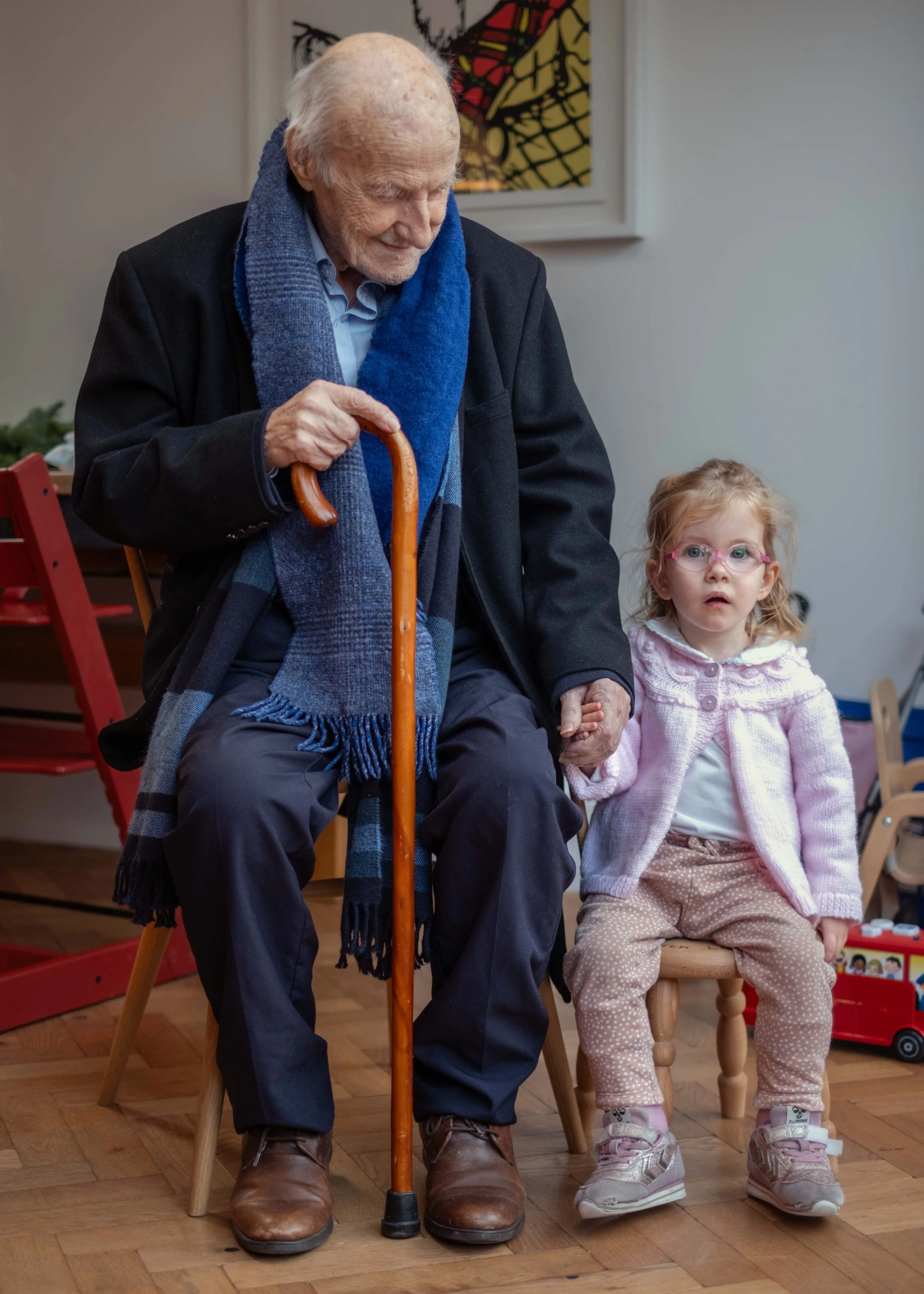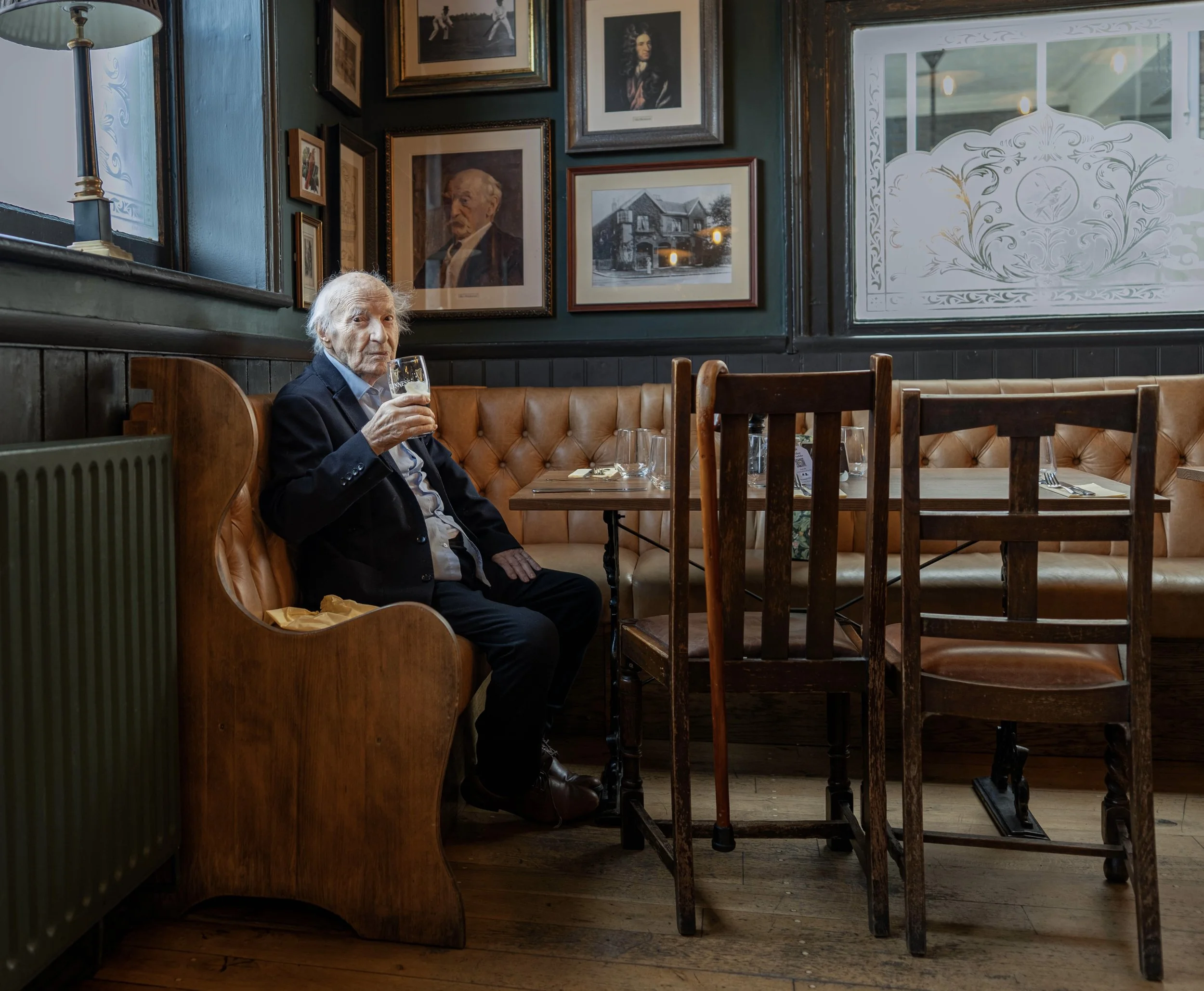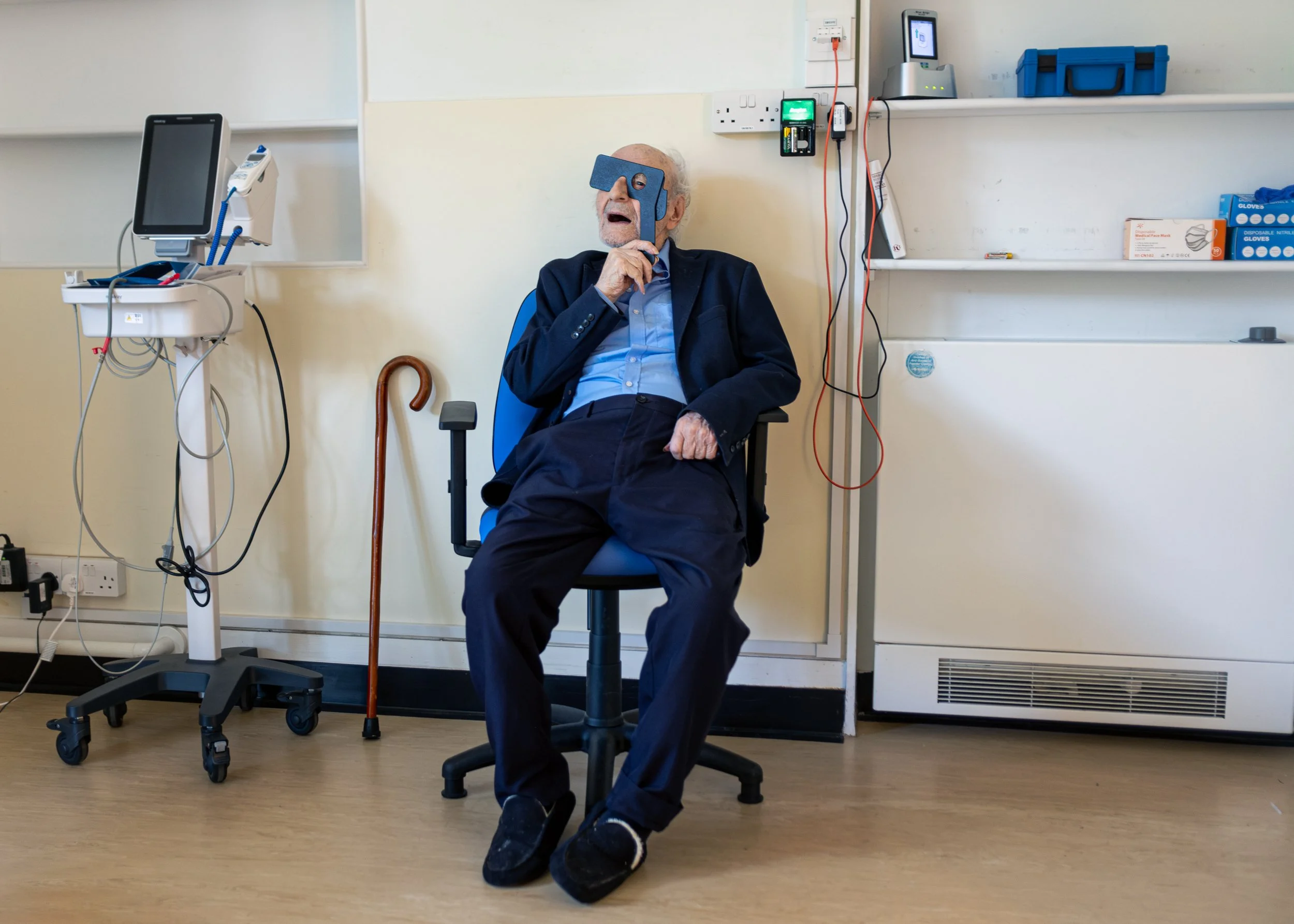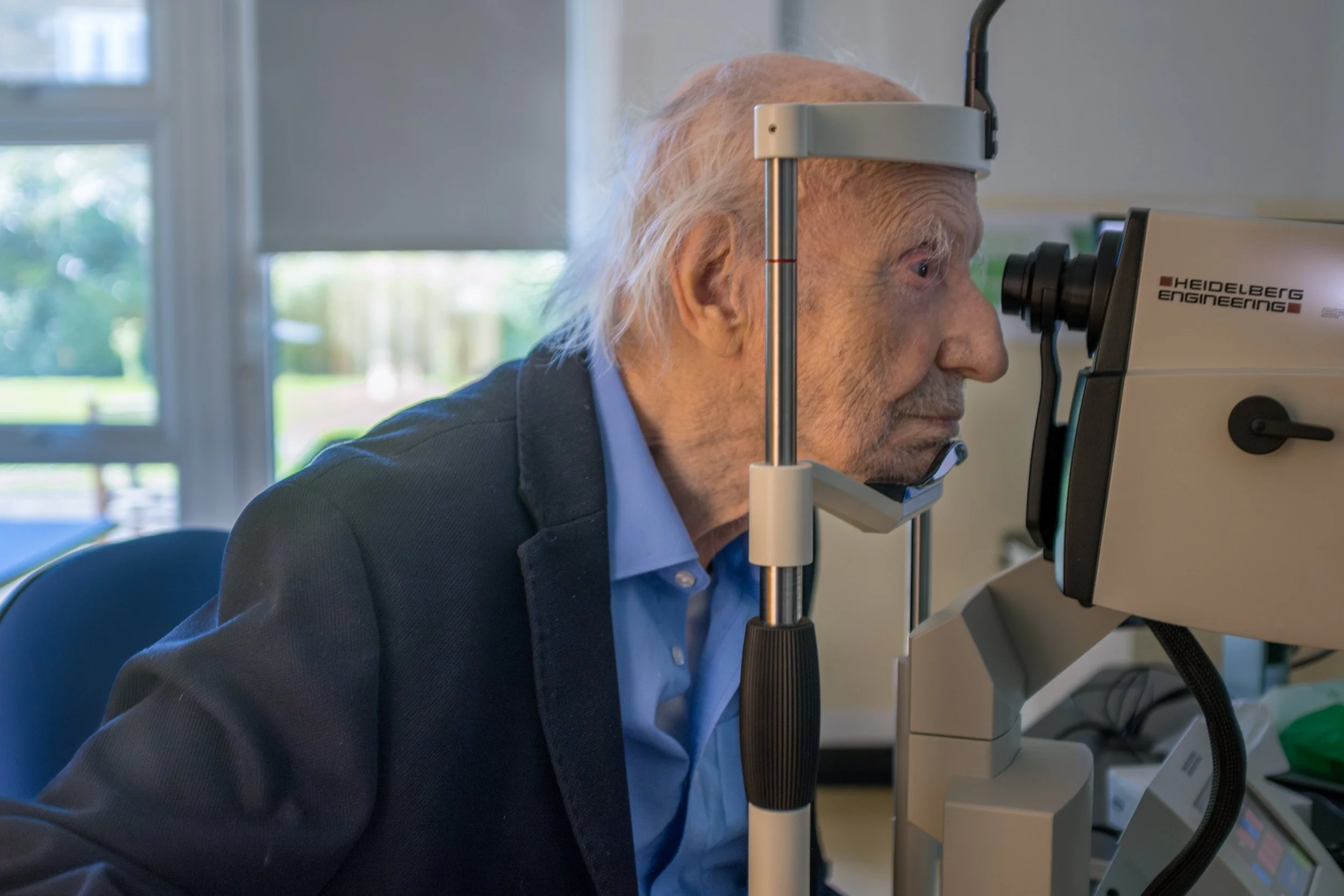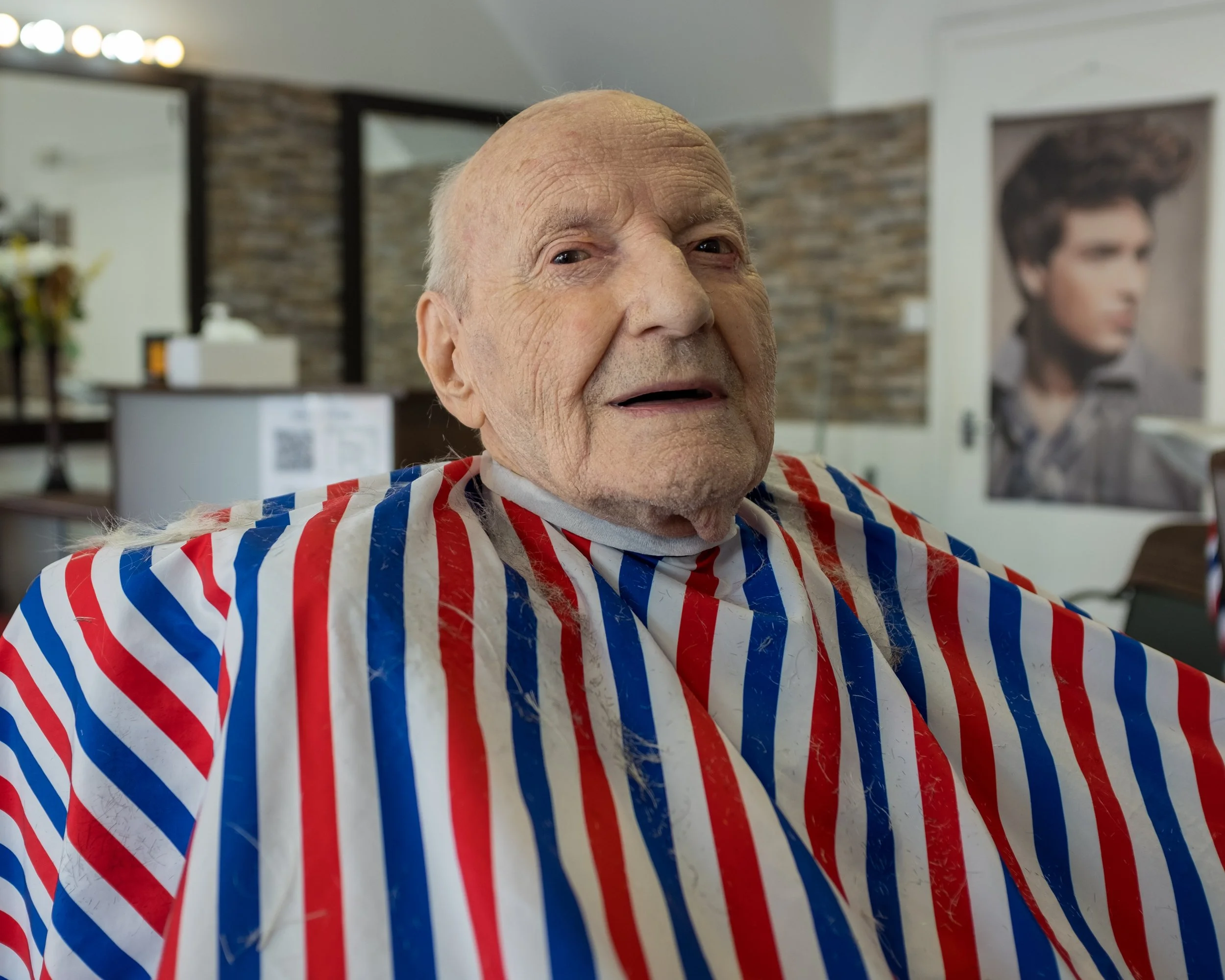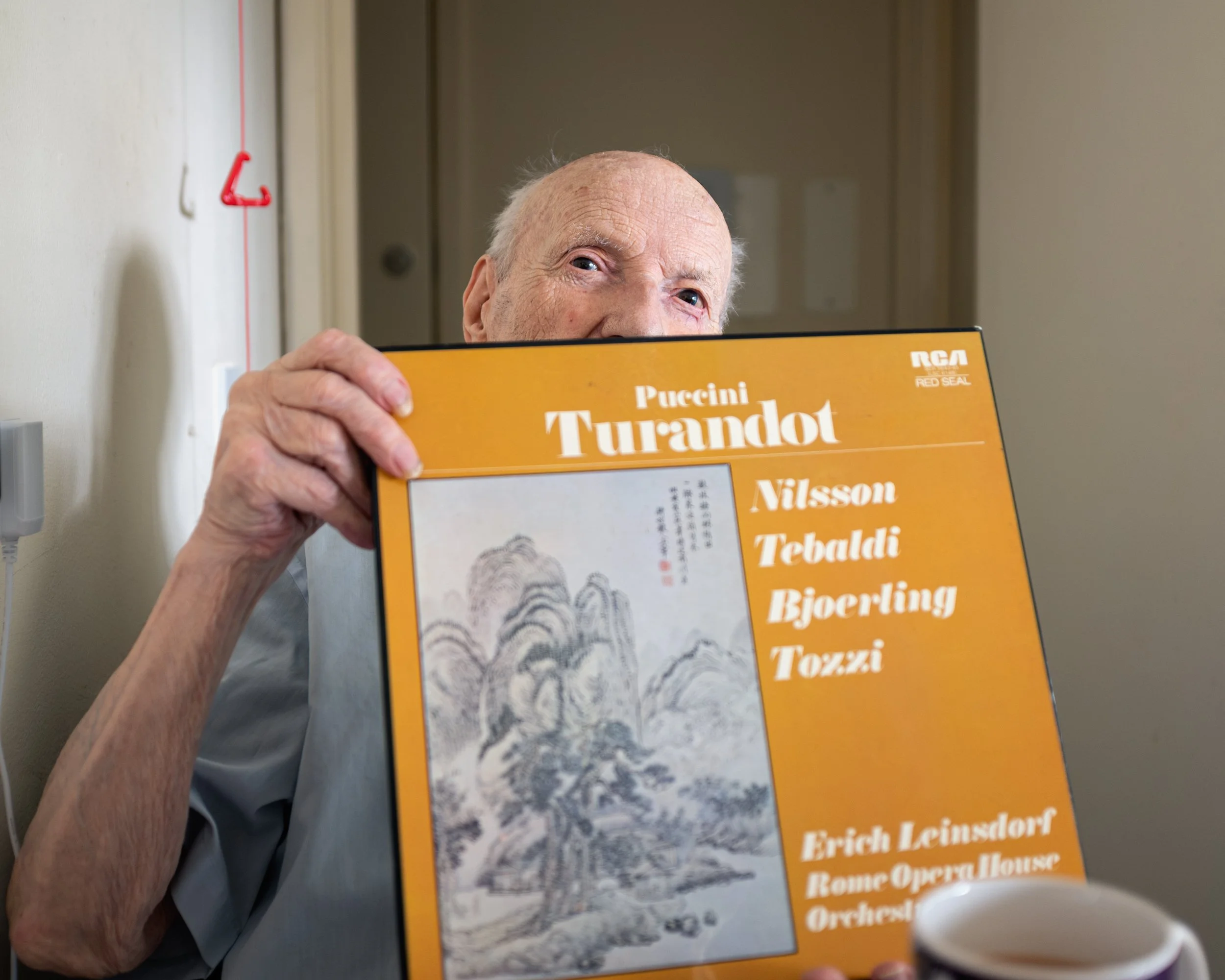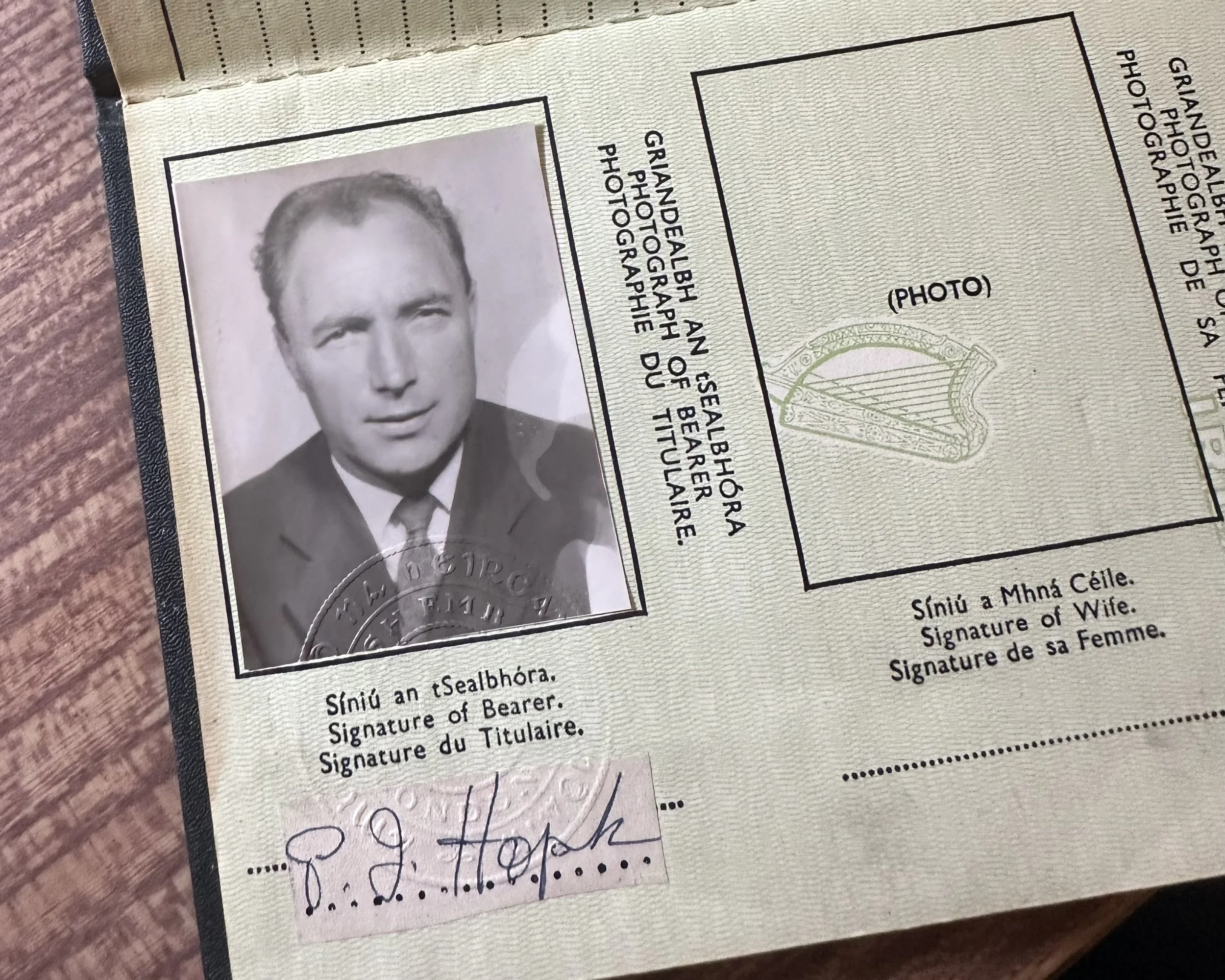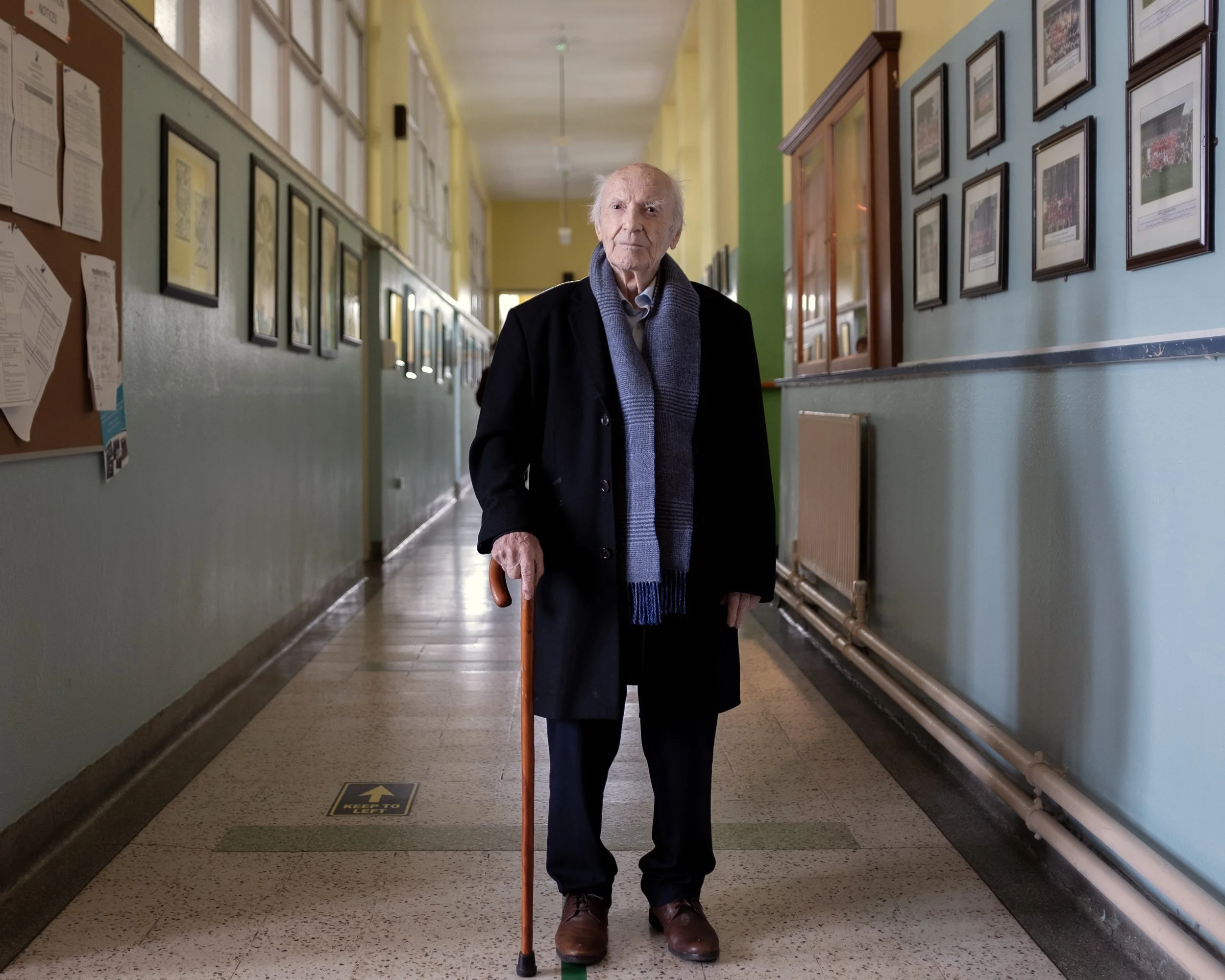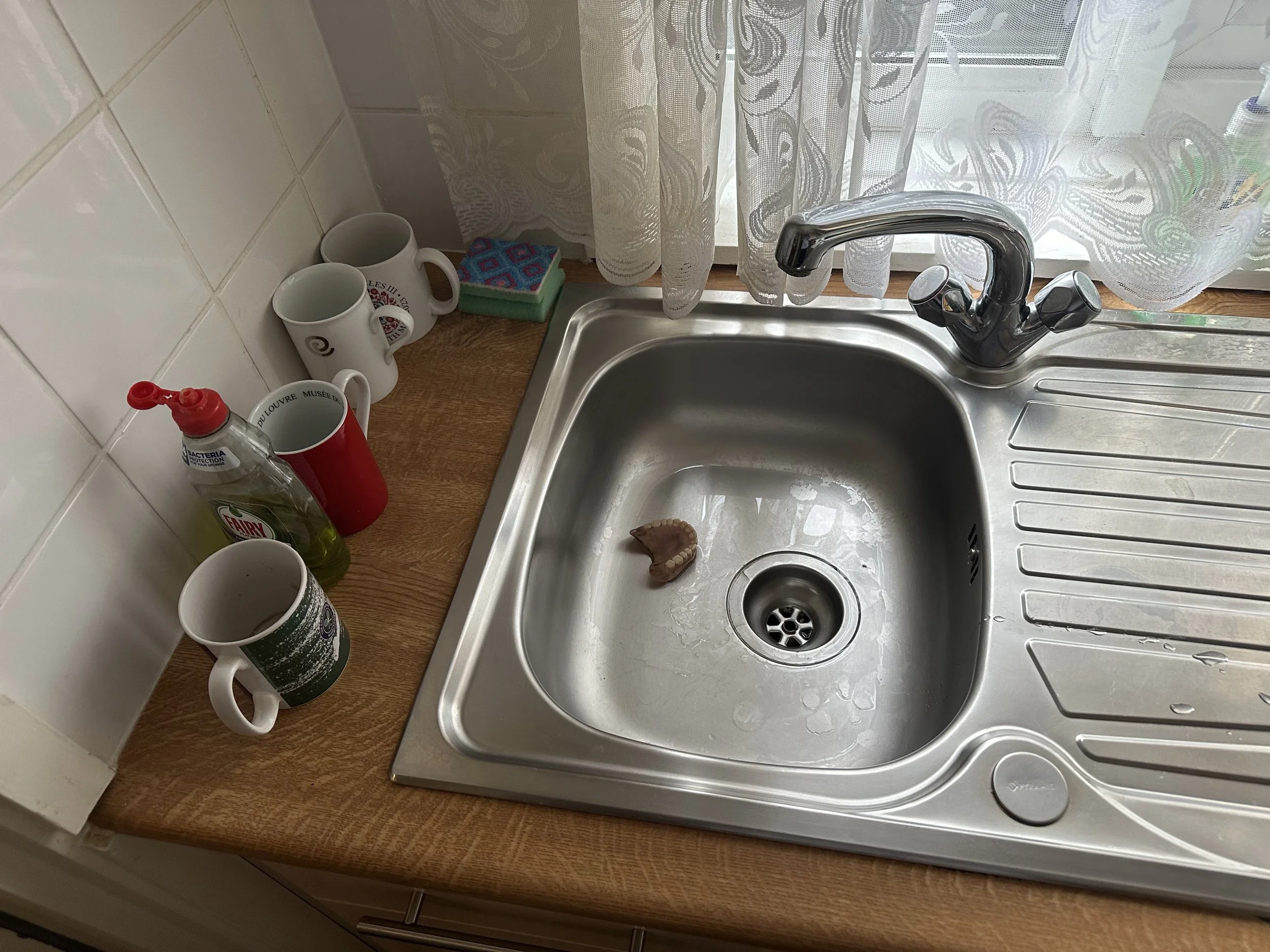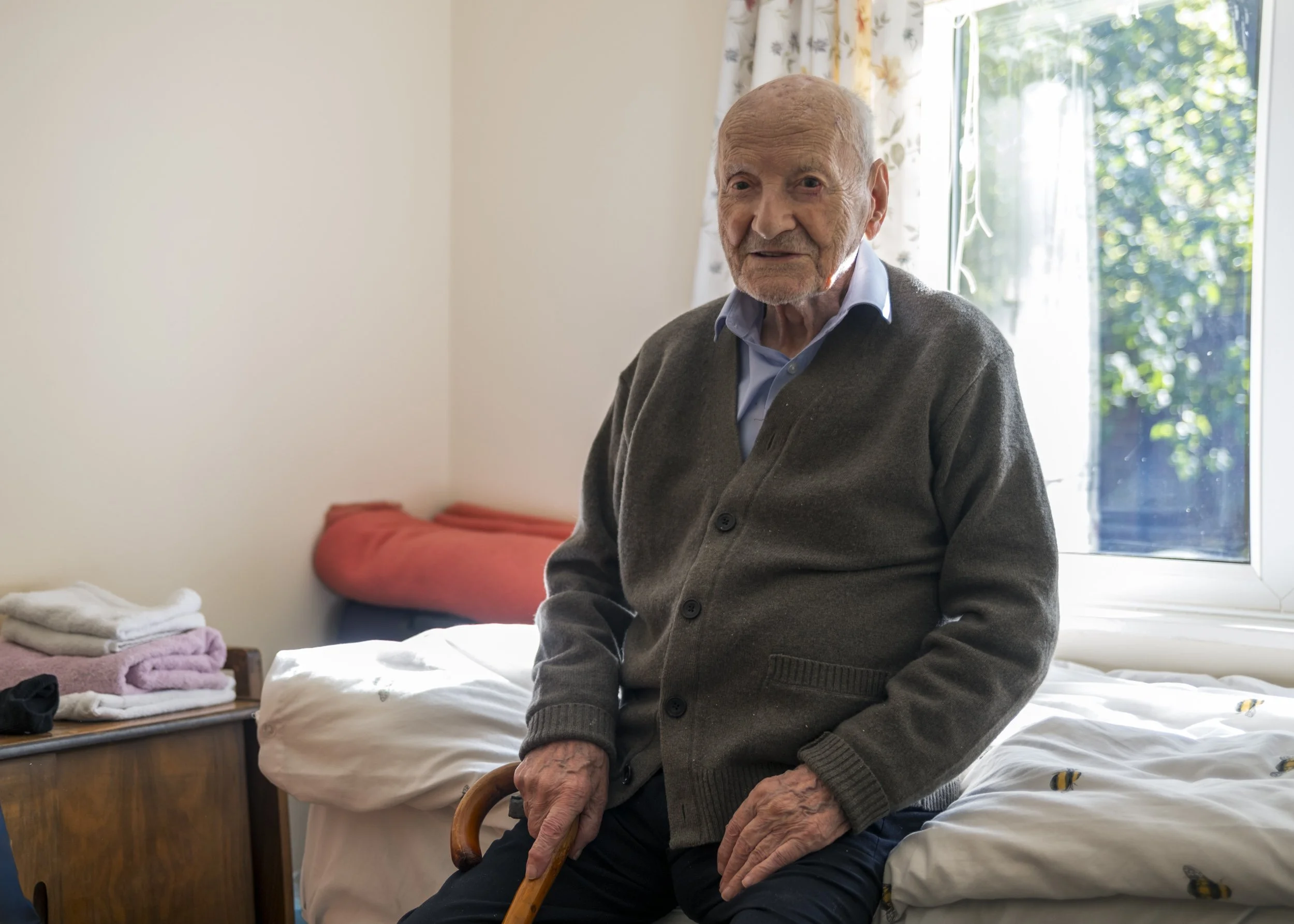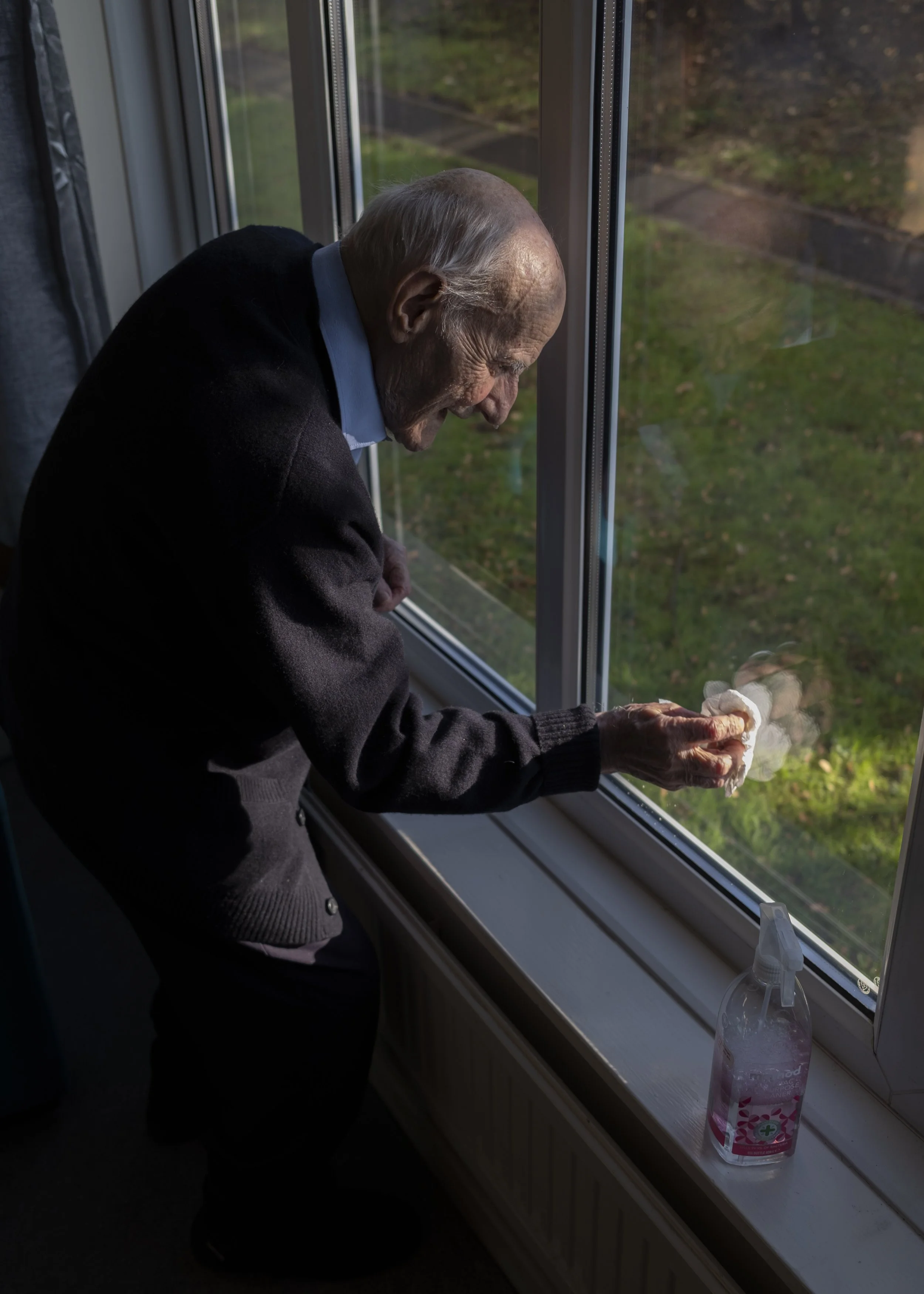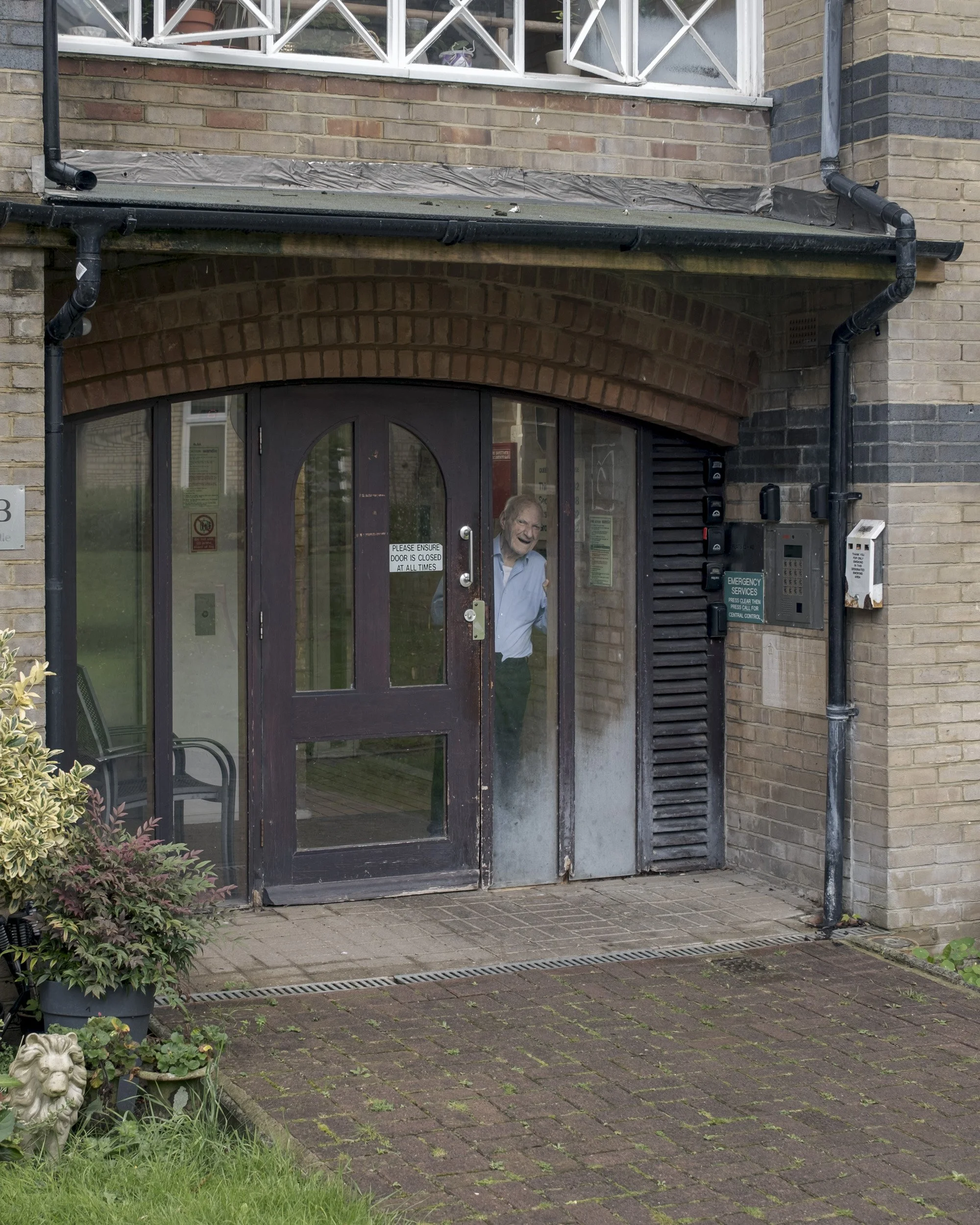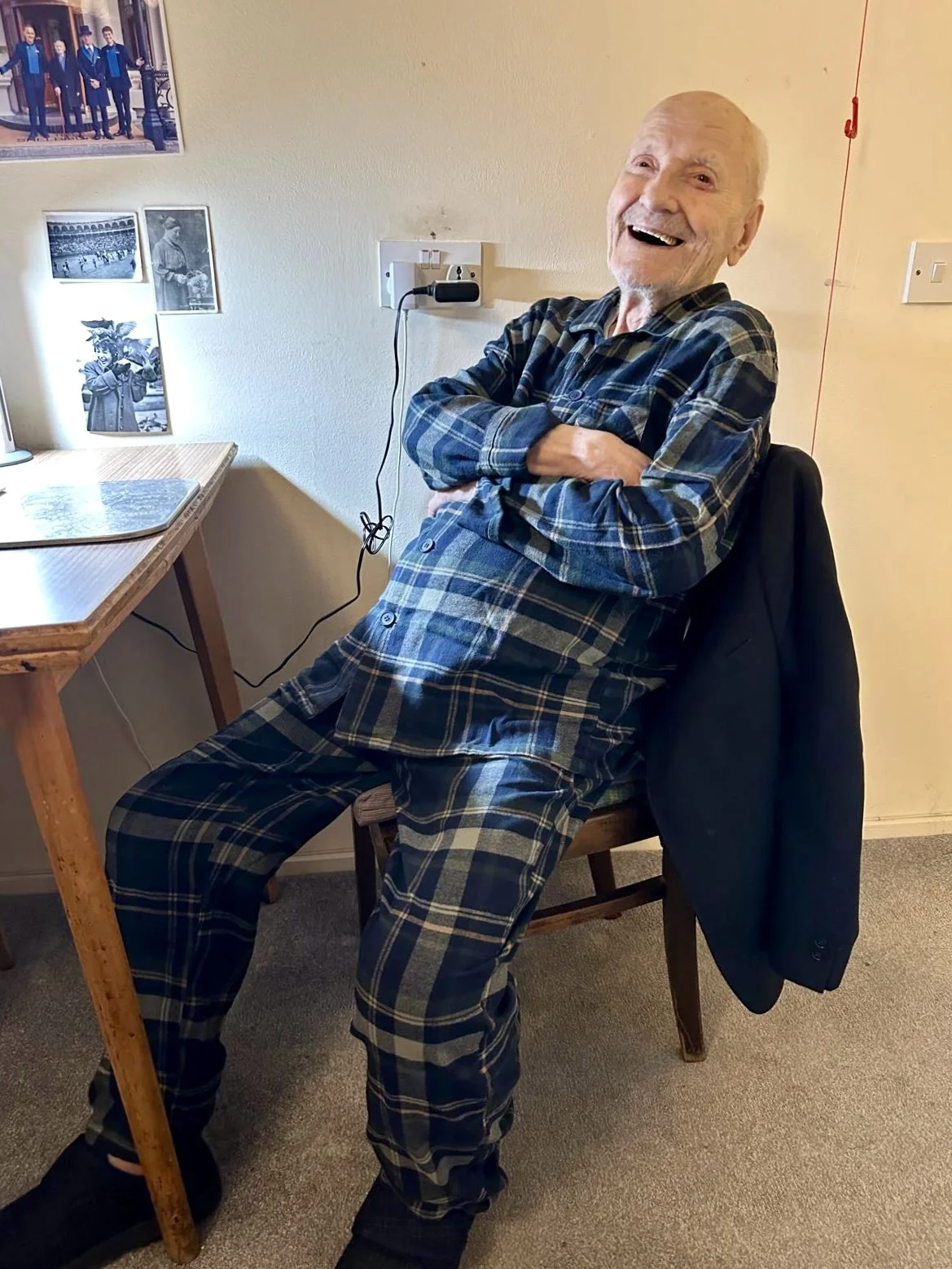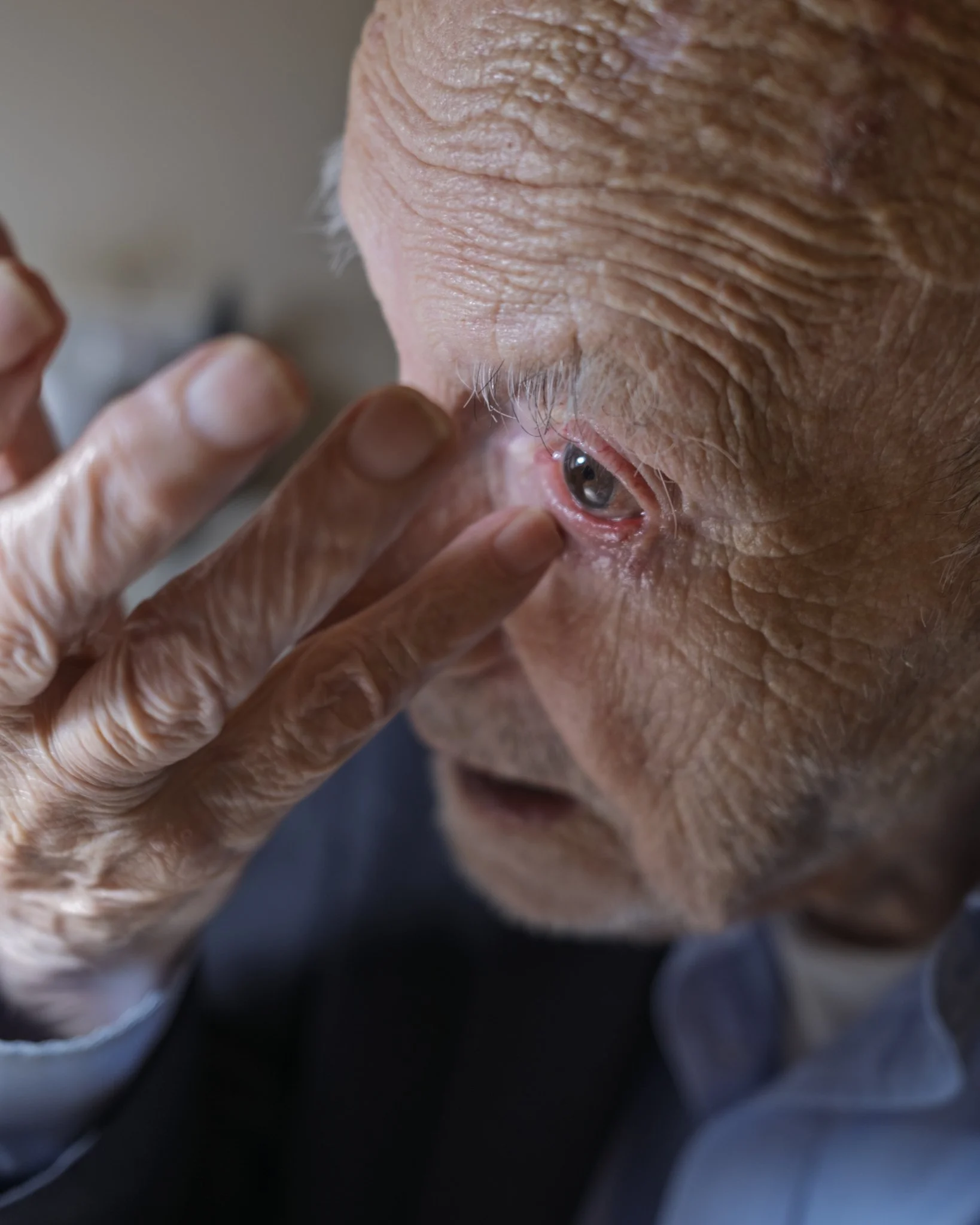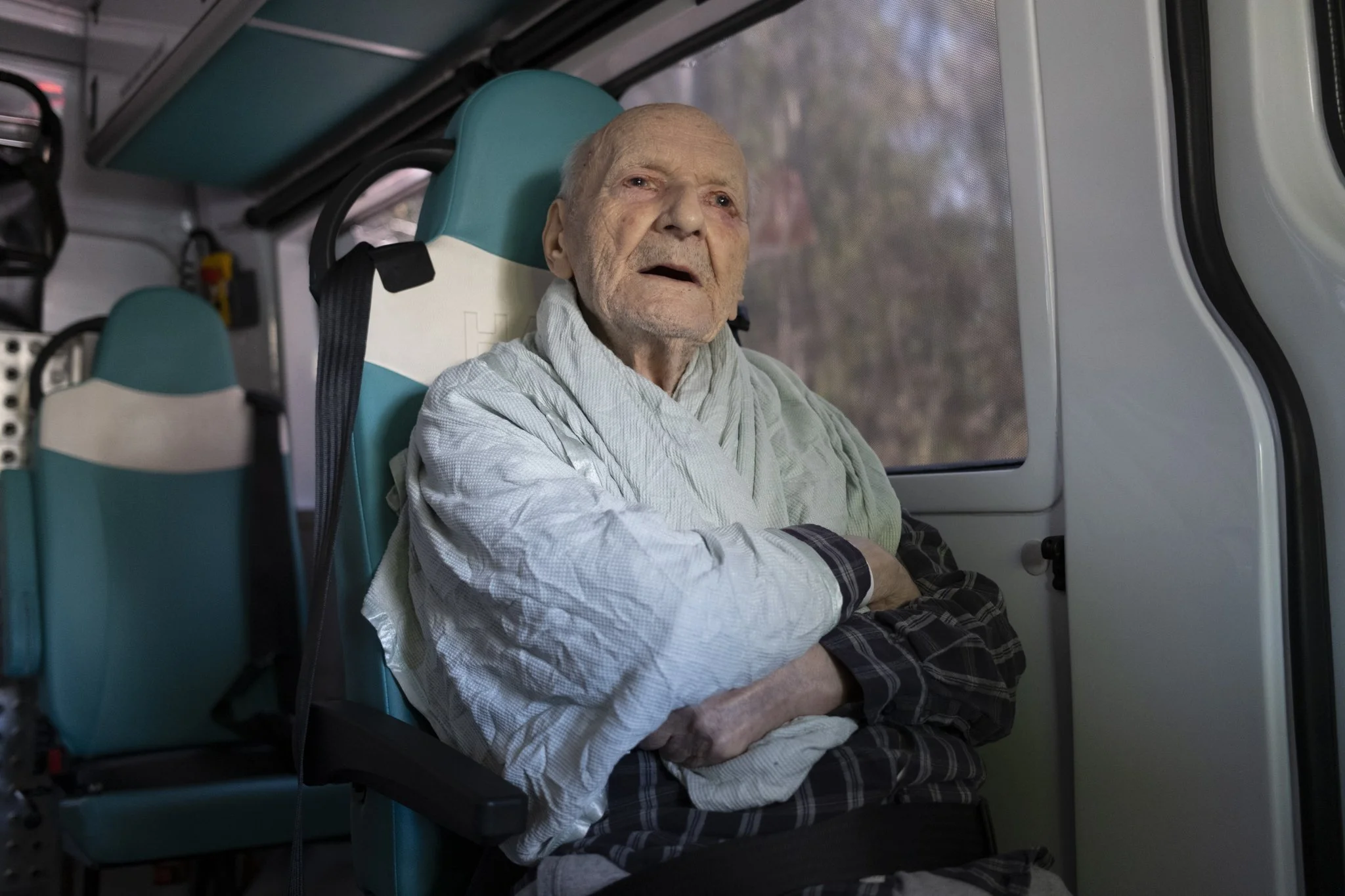Michael
Jan 2022.
I was out with my dog when I spotted Michael waiting for a bus.
I asked if I could take a shot but as I did, a bus came. This shot shows Micheal putting his arm out for the bus.
Luckily for me, it was a ‘Rail replacement bus’ so went straight past and I got a chance to have a quick chat with Michael.
Micheal was born near Dublin. He’s coming up for his 97th birthday and was out doing a bit of shopping. He told me that he cooks all his own food and likes to keep himself and his flat, which was close by, presentable .
I took another couple of shots but then, his actual bus came and Michael was gone.
Jan 19th 2022.
Micheal told me that his mother, Josephine, would bake lovely little cakes on a Sunday. This was in Dublin in the 1930s. 'The old fella' was supposed to go out and sell the cakes. "He sold a few alright, but you can guess where he went with the money?" Micheal raised his hand to demonstrate someone holding a pint of beer.
'My daddy was the villain of the story.'
Micheal smiled and said that his family mocked him when he was small - they'd say, "there he is - mammy's little pet."
Michael's dad got drunk and, when he came home from the pub, assaulted Josephine. It was a vicious assault, and when she was on the floor, he kicked her in the stomach. When Josephine’s mother found out, she boiled a pan of water and threatened to throw it over her son-in-law if he didn’t leave. He packed his bags, and he went off to live in England.
Shortly after, Josephine got TB and died at just 31. Leaving Paddy, aged 9, Michael, aged 6, and Maureen, the youngest. Their grandmother lived in a single room in a private house, so she couldn't look after Michael and his brother. Their father didn't want to know and made the boys a ward of the court. The brothers were taken in 'The Jarvy' to the nuns at St. Patricks Convent on the Kells Road in Kilkenny.
Michael remembers his first day at St Patrick’s, "They put Paddy and me in the dorm, and when I woke up in the morning, I saw my mama sitting at the end of the bed. I told Paddy, and he said there was nobody there, but I could have sworn she was."
Michael told me that the nuns treated the brothers well, but "The old fella never once came to see us."
When the brothers reached 11, they were automatically sent to the Artane Industrial School in Dublin. It was run by the Christian Brotherhood, but Michael said bitterly.' There was nothing Christian about them in my opinion.' The school was a brutal regime with kids being physically abused and much worse throughout their time there. Michael didn't go into detail about his experience. He talked of being beaten and said things were even tougher for his older brother. They taught him a trade at the school, and his was tailoring.
When he left school, he couldn't get work in Dublin, so he went to Belfast and joined the RAF. He ended up being posted to Calshot on the South Coast near Southampton. After the RAF, he came to London where he started out 'on the washing-up' in a hotel, but eventually got work in the tailoring business. He worked for 30 years in Clerkenwell Green in a factory that made uniforms for Guardsmen. They made the red tunics and the jodhpurs for the Horse Guards. Michael was the foreman, and he said it was a great place to work, and they were the best tailors around.
He wanted to show me some old photos of his work but couldn't find them. A while ago, a stranger on the street offered to help Michael carry his shopping home and, once inside his flat, started going through Michael's belongings looking for cash and things to steal. In doing so, he messed up all of Michaels papers.
The factory in Clerkenwell closed, and Michael got a job in nearby Curtain Row doing alterations to the uniforms of Chelsea Pensioners. Michael told me that alterations isn't proper tailoring, but it was 'fair work.' By this time, his brother Paddy had come down to London, and the two of them (neither ever married) ended up sharing a flat in 'The Elephant' (Elephant and Castle in South London)
About 15 years ago, Paddy became unwell, and Micheal would take him to nearby St Thomas hospital in a wheelchair. Paddy was diagnosed with Parkinson's and eventually had to go into a care home. On a visit, Michael saw Paddy without his shirt and noticed that he was covered in bruises. "The fella that was looking after him said that he fell out of his wheelchair, but I was having none of it. I took him out of there and to a new place that looked after him properly.'
Paddy passed away 12 years ago, aged 88. Shortly after, Michael received compensation for the ill-treatment he received at Artane. When he applied, he told his brother to do the same, but he refused. It wouldn't have made much difference anyway because Paddy died before any cheques were issued.
Michael is 97 soon. I asked him how he thought life had treated him. He replied, 'I know it sounds strange me being 96 and all, but the best part of my life was when my ma'am was alive.' That was 90 years ago.
11th Feb 2022.
Michaels birthday.
I took this shot on Michael’s birthday. I barely knew him back then.
I photographed a couple of the tattered photos that he had of his family and enlarged them for him. They aren’t great quality but Michael was very happy with them.
It’s only now that I look back on this shot that I realise that nobody else visited him on that day, and he didn’t receive any cards or presents.
Feb 2022.
I was driving to Sainsbury’s to get some shopping when I saw Michael at the bus stop. I pulled over and was about to say hello when he got in the car. “My Good Samaritan,” he said as he sat in the passenger seat. I was a bit taken aback but asked Micheal where he was heading, and he told me that he was also going shopping. I said that was handy as I was going to Sainsbury’s anyway. Micheal said, ‘Oh no, I only ever go to Tescos.’
It was in Tescos where I took this shot.
Once we’d finished shopping, I took Michael back to his flat.
I told Michael that people reading my previous posts about him had asked what happened to his sister Maureen.
He told me that she was also put into a convent and, as an adult, ended up living in Liverpool. They saw each other occasionally, but she passed away in her late fifties of a brain haemorrhage.
Michael added that his dad remarried quite soon after his mum died. His new wife was called Tilly, and she offered to take in all three kids, but Michael’s dad said no as he didn’t want the expense. Because of this, they remained a ward of the court and stayed in the institutions. Michaels grandmother was furious at this. She called Michael’s dad a ‘Dirty blaggard’ and said, “You went to court and swore away your own children’s lives - even an animal looks after their own.”
Michael told me that when his brother Paddy grew up, he went to see his dad in Manchester. His dad and Tilly were running a “chipper” (chip shop), and Paddy ended up working there. One night Paddy was walking home with a couple of mates when they bumped into Paddy’s dad, who was blind drunk. He got into an argument with them all and tried to kick Paddy. The other two men, who’d heard about the way he had treated his kids, set about him and gave him a ‘proper hiding.’ Paddy didn’t get involved.
Later, when Paddy told Michael what happened, Michael said, “You should’ve given the old fella a couple of kicks yourself - and a couple more from me.”
Michael’s sister Maureen
April 2022.
Even if Michael stands by the window, he can't make out the words printed on his newspaper. He only really buys it to let him know what date it is anyway.
He is now completely blind in one eye, and his other eye is bad and getting worse. He has a small cancerous lump on his bottom eyelid that he puts cream on every day. When I visit, he often asks me what day it is and can no longer read his watch.
I bought him a talking watch with big numbers, but Michael still can't really see it and the talking part is hard to understand for me, let alone a 97-year-old.
"It happened again the other day," he told me with a laugh. "I woke up and went out to get the shopping. I was waiting for a bus when a young woman came up and asked me what I was doing? What do you think I'm doing I told her, I'm standing at a bus stop with my shopping trolley; isn't it bloody obvious?" It was then that she told Michael that it was nearly midnight. "She put me right in my place," he added, "I thought it was afternoon what with it being Winter and all. She was a nice girl, though, and we had a laugh about it."
There’s a pile of letters on Michael’s sofa from the NHS regarding him seeing an eye doctor. There must be 6 or 7 appointment letters and an equal amount of letters cancelling and rescheduling the same appointments. Perhaps if the NHS management spent less time and money making and then cancelling appointments, they'd have more time and money to actually see their patients?
May 2022
Michael recalls his time as a small boy at the brutal Artane Industrial school in Dublin.
June 2022.
Micheal holding a photo of Paddy that I blew up from a badly damaged passport photo.
Michael remembers his grandfather winning a pig's head at cards. It was boiled, and the meat was a family treat.
Food was scarce, and Michael got Rickets despite his mum often giving him a spoon of cold liver oil and sugar. He still has a bit of a cowboy walk due to his legs being bowed from the complaint.
Michael remembers visiting his mum, who had TB, in the tactlessly named 'Home for the dying.' He sat on her bed in the ward, which directly overlooked the cemetery, and she would say, 'I will be in there soon.'
Michael was 6 when she died. He constantly prayed, hoping she was up in heaven.
His dad didn't want him or his older brother Paddy, so they were sent to the brutal Artane Industrial School, where they had mass twice a day - It was a strict religious upbringing.
Michael is 97 now and often says he doesn't have long. Despite this, he isn't religious. "I have no faith, but nature always replenishes itself.”
Unlike many priests at the school, Brother Columbus never struck the kids. Instead, he fervently preached about women's wickedness. 'stay away from those vipers - they will lead you to the burning gates of hell.'
Perhaps that's why neither Michael nor Paddy ever married. But they had each other. Losing their mum so young drew the brothers together.
They often worked the same jobs. Washing dishes in the same hotel or working on the same building sites. Eventually, they became tailors and got a flat in the Elephant and Castle, where they lived together for 30 years.
They had a routine. Paddy would peel the spuds and chop the veg before going to the pub while Micheal stayed and did the cooking. Once the food was in the oven, he'd join Paddy for a pint.
They never argued and stayed together until Paddy got sick and it became too much for the then 80-year-old Michael to care for his wheelchair-bound brother.
Paddy went into a care home where he was abused by the staff, which must have been awful considering he was regularly beaten at school at the start of his life.
I asked Micheal who he misses most, his mum or brother. He thought about this for a long time and said, 'It has to be Paddy; after all, we shared a whole life together.'
June 2022.
I took this shot of Michael while he was waiting to see the eye specialist at St Thomas's Hospital in London. Every six weeks or so, the doctors inject drugs directly into his eye. It won’t reverse his sight loss but hopefully it will stop it getting too much worse. During Covid, Michael missed several appointments and his eyesight deteriorated.
While we waited to see the specialist, he told me that he's been getting quite a few visitors to his flat lately.
He got chatting to a woman outside the supermarket and since then, she has come around a few times and cooked some food for Michael. He’s given her a key which I said was very trusting but Michael assured me that he thinks she’s legit.
He told me that he's also getting visited by someone who must be from the council as, according to Micheal, they are always taking lots of notes.
He said someone came early in the morning and said that they would make him breakfast. Micheal sent them packing, saying that he's perfectly capable of putting his porridge into the microwave himself.
The other day at about 6pm, another notetaker told Michael that he should be putting his pyjamas on. Michael said, "It's six o'clock in the bloody afternoon. I'm not going to bed yet. I'm feckin' 97, not 7.”
He laughed and said, "I told them that next time they come, they might as well stay in the corridor and take their notes - because they are not coming into my flat anymore."
Immediately after the injection in his eye. Michael was very sensitive to light. This only lasts a couple of hours.
He was told to wear sunglasses but he forgot his. Luckily I had a pair in the car.
July 2022
The NHS have done their upmost to stop Michael from going completely blind but his eyesight is now incredibly poor. I bought him a magnifying glass hoping that it would allow him read the newspaper, but sadly, it didn’t really help.
August 2022.
Michael deserved this pint. We'd both just been through an incredibly stressful situation. We went to buy him a pair of trousers…
M&S in Colliers Wood is as big as a football pitch. There were virtually no customers, and I couldn't see any staff.
The women's stuff was by the door, so I guessed the men's were at the back. It was easy for me to walk the 150 yards or so, but for 97-year-old Micheal, it was a mini-marathon.
When we finally made it to the trousers, they were women's. It was then we discovered that the men's stuff was actually upstairs. The escalators were way back by the entrance. 15 laborious mins later, we made it to the upper floor. Micheal was already exhausted.
The choice of trousers was bewildering: straight, skinny, formal, relaxed, etc. The size labels must've been made by that person who can write the Lord's Prayer on a grain of rice; they were so small I could barely read them, and Michael, who's nearly blind, had no hope.
Being an ex-tailor, he knew his size, so after much frustrating rummaging, I found 3 different pairs. We then had to search for the changing rooms.
There were no staff there, so we just went in. Watching Micheal attempting to put on trousers in the small cubicle was heartbreaking. As he sat in his white y-fronts struggling, I was reminded of when my kids were tiny, trying to get changed by themselves after swimming. It took forever, and none of the trousers fitted. A 34-inch waist in one style was too big, yet the same size in another was too small. Nothing made much sense, and I could feel my blood pressure rising.
I told Michael not to move, rushed off, and got another 3 pairs. After a further 15 mins of changing, he found the perfect fit.
As we waited by the unmanned "Pay Here" desk, Michael told me that buying trousers used to be easy. You'd go into a shop, the assistant measured you up and then handed you a few pairs. You'd pick the ones you liked and then leave. The whole thing took 5 mins.
Finally, we got to pay. My parking ticket said we'd spent 75 minutes in M&S.
Michael looked at me and said, "Thanks; I could never have done that alone." He was right.
Modern life ain't easy when you are old.
There's been a long term a cockroach infestation at the end of Michaels block. Now they are all over his flat.
I've contacted his landlord, Wandle Housing, several times and all they seem to do is put down a coupe of traps in the communal hallway.
There's no caretaker in Michaels block. There's just an intercom in the lobby that connects to a call-centre. The people who eventually answer when I buzz are friendly, but nobody is taking the extent of the infestation in Michaels home seriously enough.
I put the above video on Instagram and there was quite a response. It ended up going into a tabloid newspaper and had the desired effect of getting Wandle Housing to come an address the problem.
September 2022
Wandle Housing are working hard to sort out 97-year-old Michaels cockroach problem. They even paid for him to stay in a hotel while the work takes place.
He loved the idea of the hotel. But being almost blind and suffering from dementia, it didn’t turn out to be the right place for Michael. He awoke in the night and got confused. Simple things like keycards and the unfamiliar hotel TV were too much for him. The hotel staff didn’t know how to handle the situation either.
I managed to get him into a care home. It was short notice, but they kindly agreed to take Michael.
So far, his treatment has been incredible. He’s been showered, shaved and given proper food three times a day. He’s already benefiting from the company of the nurses, care staff, and other residents.
He physically looks different - he seems healthier and happier than I have ever seen him.
Unfortunately, Michael doesn’t want to stay. His mum died when he was small, and his dad disowned him.
Because of this, Michael spent most of his childhood in institutions and he doesn’t want to live in another.
Knowing his past, this is understandable.
It’s a pity because seeing him like this has made me realise that he wasn’t coping with independent living. He barely ate and was always in danger of falling and because of his dementia, being exploited by unscrupulous people on the streets. He was also lonely, which he certainly isn’t at the moment.
Michael is a frail old man - but inside he’s the same Michael he’s always been - a once virile and active man who enjoyed smoking, drinking and the company of women.
He still loves a joke and a pint and although he keeps telling me he hasn’t got long to live, like most of us, he doesn’t really believe that one day, he will be no more.
Losing one’s independence is hard for anyone to come to terms with, and Michael has taught me that it doesn’t get any easier just because you are 97.
It’s difficult to know what’s best for Michael.
The care home are getting a doctor to give him a check-up, and he will be assigned a social worker who can help him navigate this situation.
In the meantime, it’s great that he’s being looked after so well.
Michael never learn to drive. This was taken in a photo studio on Blackpool Pier. It was a very badly damaged photo, so I ran it through an enhancement App.
October 2022
Michael discharged himself from the care home.
Wandle Housing who are Michaels landlord, have rehoused him in a flat that is very close to his old one.
They cannot sort out his cockroach problem (see previous posts) because the flat next door has a sitting tenant who hoards food and her flat has become overrun with cockroaches. The housing association are waiting for a court order so they can gain access to fumigate the place. There’s no point in doing anything to Michael’s until this issue has been resolved.
His new flat is actually so much nicer than his old one. It’s in a much better and safer location and Wandle have made it comfortable for him but Michael is determined to move back to his old place. Ironically, when he was living in his old flat, he always said how much he wanted to leave. I think he’s just one of those people that always wants to be somewhere else.
He’s back to surviving on biscuits and one-pot porridge, as he can’t use the cooker or microwave.
He also hasn’t had a shower in 5 weeks as he doesn’t know how to use the shower - he says he will have one when he moves back to his old flat.
He now has carers coming in but he won’t let them do anything for him apart from make him a cup of tea but only if they have one too.
I asked why he left the care home. He said, “They were always cooking my food, making my bed, and washing my clothes - I don’t need all that looking after.”
He does seem to be quite happy though and is pleased to be living on his own again. I guess to Michael, living on a diet of biscuits is a small price to pay for his freedom.
Michael told me that he’d rather be in the cemetery than back in a care home.
December 2022
Michael is surprised that he has outlived both his brother and sister. He was the ‘runt of the litter’ and was always in an out of hospital when he was small as he had rickets.
Both his siblings had a genetic condition called ‘Meleda Disease’ which is a rare skin disorder characterised by dry, thick patches of skin on the palms of the hands and soles of the feet. They inherited this from their father who always wore gloves.
Michael for some reason, was spared this. He thinks it was he was born in February and his siblings were both born in November. This doesn’t seem likely, but Michael insists that this is the case.
Father Renan was a spiteful man. He was one of the teachers at the Artane Industrial school where Michael and his brother Paddy were sent after their mother died. He would mock the appearance of Paddy’s palms as he held out his hands, waiting to be caned and would call him, ‘Monkey Paws,’ in front of the class.
Just repeating this story about his brother made Micheal angry and he told me that ‘The bastard deserved shooting, but not as much as Father Lynch did’
Michael then told me about Father Connie Lynch, who once got hit in the face by a snowball thrown by one of the kids. He gave the boy such a beating that he had to go to the schools infirmary and after a few days, he died. This was before Michael went to the school but the older boys remembered the kids mum running across the playground screaming ‘you murdered my boy’ after she found out.
Father Lynch was acquitted of murder and got his old job back. Michael said that the priest was ‘as quiet as a mouse after that.’
Artane was a tough school. It wasn’t just for kids like Michael and Paddy who had lost their mother. The school was also for kids that were tearaways and many of them were bought up on the streets. At night, the priests patrolled in pairs for their own safety.
Michael wasn’t treated as badly as a lot of the boys. He was lucky because his main teacher was from Mayo which was where Michaels dad came from. Because of this, he thinks he received less harsh treatment. Michael told me there’s a ‘Hopkins Street’ in the town. I looked it up and sure enough, there is a Hopkins Road Castlebar, Mayo.
Unlike his mothers side of the family who were very kind and gentle people, especially his mum who was, ‘the most inoffensive person you could meet.’ His dads family in Mayo were a very rough and harsh bunch.
Michael showed me a faint scar on his forehead. He got it when he was five while visiting his paternal grandmother in Mayo.
He fell over and spilt blood everywhere which made his grandmother furious. Instead of consoling the five year old, she said to Michael’s mum, “I wouldn’t have those kids of yours if you gave me £500.” Michael still remembers being upset by this 92 years later.
I said that perhaps his grandmothers behaviour explains why his father was so heartless. Michael paused and said, ‘D’you know, you are probably right, I never thought of that before ‘
December 2022
Michael remembers Christmas lunch at The Artane Industrial School.
Christmas Day 2022
I took Michael for a quick pint on Christmas Day. We didn't go to the usual pub because they'd offered him a free Christmas lunch which he had refused to accept. He told me, "I don't need charity."
When I got to his flat to pick him up, he said a stranger had just left. She had filled his fridge with Xmas food. He said that he'd offered to pay her for it but that she wouldn't take his money. He didn't seem that pleased by the kind gesture as he had just been shopping anyway.
In the months I've known Micheal, he's told me about many instances where strangers have helped him out on the streets. People carry his bags, help him cross the road, and help him in the shops and on public transport. I can't see how he'd get by if it weren't for all these acts of kindness. He often gets lost, but some stranger always seems willing to take the time to get him home safely.
On Christmas Eve, he got lost while shopping on the Walworth Road and was driven home by the police. He said it was '2 very young coppers', and they took him to his flat and made him a cup of tea. He offered them money, but they refused to accept it.
Whenever anyone helps Michael, he offers them money. He even tries to tip the shop assistant at Sainsbury's for packing his bag. He is always trying to put tenners into my jacket pocket.
When we got to the pub, Michael started talking about his watch. A charity worker gave it to him, and he has never liked it.
He'd been complaining about it for ages, and when he first told me this a few months ago, I bought him a watch too, but he never wore it.
As we drank our Guinness, he showed me the new watch he'd bought on Xmas Eve on the Walworth Road (before getting lost and rescued by the police). It was a cheap-looking thing that had seen better days and whoever sold it to him charged him £60, a complete rip-off. He was wearing it upside down and told me it was 6.30 when it was around midday.
Even though the watch was more or less useless, Michael liked it, and now I've got to know him quite well; it's clear to see why. He likes it because it wasn't given to him. He'd gone out and bought it himself with his own cash.
Michael has virtually lost his eyesight, much of his mobility and memory, and is just one fall away from the hospital or worse, but the one thing he hasn't lost is his pride.
January 2023.
January 2023.
Michael got hit by a car the other day. The car was reversing just as Michael decided to cross the road and it knocked him off balance.
The driver took him home. She tried to take him to the hospital, but he refused. He wouldn't let her phone a doctor, but he let her call me.
When I got to his flat, the driver was much more upset about the whole thing than Micheal. I guess it’s not every day that you knock over a 97-year old in your car.
I had a quick look at Michael, and he seemed fine apart from a possible broken nose and a few bruises to his knees and face. He assured me he hadn't banged his head and reiterated that he wouldn't go to the hospital as “Once I go in there, I will never come out again.”
He eventually allowed me to take him to the Balham medical centre who were brilliant. A doctor thoroughly examined him and said he was fine.
The next day, the car driver called in on Michael and said she would visit him regularly. She bought him a new clock with big numbers that also tells him what day it is. To nearly blind Michael, this is a godsend, and I think he has rather taken to her. He even joked, "It was a piece of luck that I got run over."
The accident happened two weeks ago, and Michael has fully recovered.
It's extraordinary how quickly the bruises and swelling to his face disappeared. A friend of mine broke their nose recently, and even though they are half Michael's age, the bruising took so much longer to go away. Perhaps this explains Michael's longevity. Maybe he just has really good genes, and his body can heal faster than the average person. I've no idea, but his recovery was quite remarkable.
A couple of days ago, the car driver visited again. She bought him some flowers to brighten up his room. As a 97-year-old working-class bloke, Michael thought this was quite funny, "What do I want flowers for? I'll be pushing them up myself soon enough."
February 2023.
Michael often talks about his years at 'The Uniform' in Clerkenwell Green. He has told me so many stories about the people who worked at the factory that I've always meant to go and look at the place myself. So last weekend, I drove to Clerkenwell and took Michael with me.
Michael is a tough working-class bloke. He doesn't get emotional, but when we stood in the middle of the deserted street opposite where he once worked, he did go very quiet. I left him alone for a while to let him take it all in.
He told me that the place is so different from what he remembered but also very much the same.
The factory has been demolished. It is now a modern building that houses a marketing agency for social media influencers.
The post office is now apartments. The florist, butchers and betting office have all gone. All that's left is the pub where he used to get a pint of Guinness for 40p (Now £5.50). The cafe is still there (Below), but apparently, it's closing down soon.
As I took a few shots of Michael, a woman approached, asking how to get to Exmouth Market. I said I wasn't sure, but Michael interrupted and, despite not having been there for nearly 30 years, gave precise directions, including street names and how long it would take her to walk the route.
Michael gets lost the whole time around his flat in Balham but still knows Clerkenwell like the back of his hand. The human brain is such an extraordinary thing.
Michael remembers this cafe but it’s about to close for good.
February 2023.
Michael is too blind to cut his own toenails, so I took him to a local nail bar. They did an excellent job and only charged £15.
February 2023
Michael celebrated his 98th on the 11th.
The driver who reversed into him had bought him a cake and some balloons in the colour of the Irish flag which he was delighted with.
A couple of women from the nunnery also came and bought him some towels and a box of chocolates.
I got him a Guinness mug and a can of Guinness and later, I took him to the pub for another.
He had a good day.
I messed up the shot of him blowing out the candles on his cake. It was a shame as it would have made a great photo, but Michael was just too quick for me.
He said the last time he got to blow out candles on a cake he was 6 years old and that was 92 years ago.
Feb 2023
At 98, Michael tends to repeat the same stories again and again.
Fortunately, he is a brilliant storyteller.
Before he utters a word, he always leans towards me conspiratorial way and glances around the room to check that nobody else is listening (even if we are alone). It always makes me feel like he's about to tell me something important.
He starts every story with a hook, something that writers learn but which, to Michael, just comes naturally. For example, 'I was taught by Christian Brothers, but let me tell you, there was nothing Christian about them, the bastards.'
Then there's the detail he goes into when describing a situation. He puts you right there, seeing it all through his eyes. His wry observations and use of language make his stories enjoyable, no matter how many times I have heard them before.
Michael struggles to remember what day it is. Yet he can describe the walk home from work back in Dublin over 80 years ago in the most minute detail. He's repeated this so many times that I could probably find my own way around the part of the city despite never having been there.
On one of these walks home, Michael passed St Kevin's church, in Harrington St, where he was Christened.
At school, he had to go to mass twice a day, but since starting work, he hadn't been at all. For some reason, on that day, he decided to go into the church to confess.
He remembers nervously entering the church and seeing the priest standing there. In Michael's words, "I could see straight away that he was a pompous bastard alright. He just glared at me and pointed at the confession box like I was a criminal or something".
Micheal went in and was plucking up the courage to confess when the priest shouted irritably, "Well, just get on with it, boy."
Micheal has never told me what he was about to say to the priest during that confession. Perhaps it's something that is still bothering him today.
He was a 16-year-old boy with no parents who had a terrible time at a brutal school and clearly, had something on his mind.
But when Michael got that response, he simply got up and walked out of the church and, for the last 80 years, hasn't been back since.
I showed Michael a Google Streetview of the church on my phone and he recognised it straight away. “That’s the place” he told me, “I wonder if the bastard priest is still there?”
Unless he’s in the graveyard, I very much doubt it.
March 2023
One of Michael's first jobs was working in a tailors.
He lost his job when he accidentally caught his boss groping a women that was operating a sewing machine. It was an embarrassing moment, and the next day, the boss, who was a married man, sacked him.
Michael went back to Father Ambrose at the Artane Industrial School and told him what had happened. Unlike many Christian Brothers at the school who were notoriously cruel, Father Ambrose was a decent guy and used his influence to get the boys jobs when they left Artane.
Michael was trained as a tailor at the Artane Industrial School in Dublin.
He got Michael an apprenticeship at a Jesuit college making Soutanes. The Soutane is a sort of cloak worn by the clergy. It was a good job, and Micheal lived in a dorm with the other apprentices.
The Christian Brother that taught Michael was also a kind man, and Michael enjoyed the work. Being a religious organisation, Michael was supposed to go to mass every day, but he never went.
By then, his grandmother lived in a home for the poor near the Guinness factory in St James’s. Michael would visit her, and they would often go to see his mum's grave in The Mount Jerome Cemetery.
By then, his grandmother was an elderly woman, and Michael remembers her singing, "Bring back, bring back, bring back my Martin to me", as she passed her first son's grave (Michael's uncle). She had buried both her children and had nobody to look after her as she got older. Michael's brother Paddy had moved to England, and his sister, Maureen worked in Belfast.
On Guy Fawkes night, 1944, Michael's grandmother died. He admits that when they took him to see her body laid out, he 'cried like a baby'. Michaels's mother had died when he was 6, his dad had abandoned him, and his brother and sister were away working. Now his grandmother had died, he was all alone.
It was just Michael and the Christian Brother from the college at her funeral.
The next day Michael was back making the Soutanes when the head priest called him into his office. He said, "Michael, we've noticed that you haven't been going to mass, so we will have to let you go."
It was the day after he'd buried his grandmother and Michael was out of work and homeless. He was 19 years old and had no idea what to do. It was a cold November night, and he felt utterly alone and desperate; he was freezing.
A policeman spotted him and asked him what the matter was. After Michael told him, the policeman took him to the police station and sat him in front of the fire with a cup of tea. Probably because his father was one, Michael has never been a big fan of the police, but Michael told me that this constable was a real gentleman. He said Michael could spend the night in the warm and, if he wanted to lie down, stay in a cell. Michael refused the cell but stayed all night in front of the fire.
The next morning the policeman told him he should join the armed forces. He'd get good pay and somewhere to stay. Michael took his advice and went to Belfast and joined the RAF.
After telling me this story, Michael said, "It was good advice, and I will always be grateful. In a million years, I'd never expect a copper to have more compassion than a priest. But there you go, there's just no telling with some people."
March 2023
Michael insists on doing his own shopping
A carer recently told 98-year-old Micheal that some other clients she visits barely leave their chairs. They watch TV all day and depend on their carers for everything. She said that one man wouldn’t even lift his foot so she could put his slippers on.
On the other hand, Micheal wishes the carers would just leave him alone. He keeps telling them they don’t need to come as he is quite capable of looking after himself.
He does keep his kitchen spotless and makes his bed every day. But the carers actually help him quite a lot. They clean his bathroom, help with shopping and, most importantly, check that he’s okay. It’s only March, and already Michael has had a fall, been hit by a car, and has managed to get lost on several occasions, so having carers keeping an eye on him is important.
He told me that his brother Paddy, who Michael lived with for most of his life, was very different. Once he retired, he barely left the flat apart from going to the pub, where he would sit in silence and read the paper. Micheal told me, “Paddy was monosyllabic and always kept himself to himself.” Paddy’s health declined rapidly after retirement. It wasn’t long before he was in a wheelchair, then a care home, and then the graveyard.
If Michael can think of any excuse to go out, he will take it. He walks to the shops most days to buy the paper even though he is too blind to read it. He is also incredibly chatty and sociable and will talk to anyone who will listen. You will struggle to get a word in when conversing with him.
Perhaps that’s the secret to a long life - get out of the house and talk to people.
May 2023
I finally managed to take Michael back to Dublin to see his mum’s grave.
She died in 1931 when Michael was six, and he has since spent the majority of his life living in England.
Taking 98-year-old Michael on a plane and around the city was a nerve-racking experience. Luckily, Dubliner and extremely nice bloke, Brendan, who I met via Instagram, drove us around the city, which meant Michael got to see so much more than he would've done if it was just me.
Brendan had already contacted Mount Jerome Cemetery, so we knew exactly where Michael’s mum was buried. For a while, Micheal was standing on the exact spot, but whatever markings were put on Michael's mum’s grave had been lost to the elements over the last 90 years, so he wasn’t sure it was right. His family couldn’t afford a gravestone.
I wrote to The Shelbourne Hotel and told them that when Michael was a boy, his gran used to stand outside with him and say, “That’s where the gentry drink”. The Shelbourne replied and gave us a huge discount on the room, which was incredibly generous of them. It was also a real treat for Michael. He never dreamed that he’d ever set foot in such a luxurious hotel, let alone actually stay there.
We also took Michael to his old pub, the place where he first worked at 15, and Stephen’s Green Park, where he used to go with his gran on his days off from the Artane Industrial School, where the Christian Brothers often beat him. The school is now a regular school, and the headmaster very kindly showed us around.
Michael really enjoyed the experience of returning to Dublin. But as you will see at the end of the film, like many of the Irish I have interviewed who came to England, he has mixed feelings about whether or not it is his home.
Michael looking for his mum’s grave at Mt Jerome Cemetery.
When Michael was small, he stood outside the luxury Shelbourne Hotel with his grandmother. She told him, “That’s where the gentry stay.” Michael never dreamed that one day, he would be a guest there.
He’s too blind actually to read the newspaper.
June 2023
Michael in ‘Noodle Cafe’ in Balham.
Michael’s opinion on some Wandsworth eating spots.
Noodle Cafe in Balham. Sausage, grilled tomato, egg and bread. “Tasty in here, and the bread is nice and soft.” (Michael lost his bottom set of false teeth years ago, so he can’t manage anything too crunchy).
Seascape fish and chips in Balham. “It’s a great Chipper, but I’m never going to manage all this.” (he did)
Harringtons Pie & Mash in Tooting. He seemed to enjoy it once he’d mushed it all up with a spoon. “It’s a bit like an Irish stew, really.”
Gail’s in Balham. “The tea isn’t weak; it’s helpless.” But he loved the sausage roll.
The Nightingale Pub in Balham. “The best chips I’ve ever tasted. Very good Guinness, too.” He also absolutely loves their apple and strawberry crumble.
McDonald’s Wandsworth Roundabout. Michael didn’t really know what to make of the place. He thought it was brand new and was a Scottish cafe. He had a Sausage & Egg McMuffin, which he deconstructed but kept snapping the plastic forks, which he found infuriating. He did say that the place seemed very clean.
Stadium Cafe in Summerstown. “£4.50 for a breakfast is very reasonable.”
Of the above, his firm favourite is the Nightingale Pub. He worked in “a chipper” up in Manchester for a while, so his loving their chips is praise indeed.
July 2023
Michael was always complaining of an uncomfortable feeling in his groin. He wouldn’t go into much detail, but he kept telling me it was bothering him.
I told him that he should let me take him to the doctor. He was reluctant to go for several reasons.
Firstly, he wanted to have a good wash beforehand. At the time, he was living in temporary accommodation that only had a shower, which he couldn't use as it was unsafe for a 98-year-old. The carer offered to help, but Michael refused to let her see him undressed.
He told me that instead, he would go to the public baths to have a soak.
I told Michael that since people now have bathrooms at home, public baths no longer exist. Michael found this incomprehensible.
Another reason he was reluctant to see the doctor was that the discomfort he was experiencing was in a personal place. He wasn’t keen on a doctor, particularly a female one, having a look in that area.
Finally, Michael was also terrified of being admitted to the hospital as he was sure that, at his age, once you go in, you never come out again.
I bought him some baby wipes, which he said were great for getting him clean. He then finally agreed to go to the surgery.
The doctor was brilliant. She took his blood pressure, which was perfect. His heart rate was good, and she was amazed that at 98, he wasn’t on any medication whatsoever.
She then asked if anything was worrying him, and after a long pause, Michael mentioned the lump in his groin.
The doctor examined him in a discreet way that prevented him from getting embarrassed. It turned out that the lump was just a hernia. The fact that it wasn’t hurting when she pressed meant that it was nothing to worry about and, at his age, certainly not worth him going to hospital for an operation.
Michael was hugely relieved and grateful that the doctor had examined him in a way that maintained his dignity.
A couple of months later, we were in the pub, and he told me that since he learnt that the lump in his groin was nothing to worry about, it hardly bothered him.
He then admitted that at the time, he was secretly concerned he was growing a third testicle; he then joked, “Which would be pointless because nowadays, I don’t have much use for the other two anyway.”
August 2023
Michael isn’t in the least bit bothered by graveyards.
Michael was six when his mum died. “The old fella didn’t want us”, so Micheal and his brother Paddy were sent to a children’s home in Kilkenny and their little sister Maureen to another in Dublin.
The kids visited their grandmother in the tiny room she rented on the last Sunday of every month. Micheal never got to see his little sister a great deal.
He remembers her being quite a tearaway. She had severe mood changes and would often fly into a rage over something quite trivial.
Their aunty Bridget would call her ‘A little tinker.’ This wasn’t said with any affection, and even now, over 90 years later, Michael is still affronted by this.
The family were very poor. All the siblings left Ireland in search of work. Micheal always stayed close to his brother Paddy, but they lost touch with their little sister.
One day, Michael cut his hand in the factory where he worked and was told to go to the hospital to get it bandaged. He remembers coming out of Embankment Tube Station and noticing a woman walking ahead of him. Something about her hair seemed familiar. Sure enough, it was Maureen. She was working as a chambermaid in a London hotel and had just finished work. The pair hadn’t seen each other in over ten years.
They went straight to a pub near Piccadilly Circus and had ‘quite a few’ because they had a lot of catching up to do.
Maureen had married a Cockney called Arthur. He was an electrician, and they were living just off York Road behind Kings Cross.
That night, Michael told Paddy, and all three of them would occasionally meet up. Maureen still had her temper; sometimes, she refused to answer the door when her brothers visited.
Maureen had inherited the same condition that Paddy and their father had. ‘Meleda Disease’ is a rare skin disorder characterised by dry, thick patches of skin on the palms of the hands and soles of the feet. Michael believes that because of this, Maureen didn’t want children.
One day, Arthur asked Michael to accompany him to a chemist in Leicester Square. When inside, Arthur confronted the chemist with a packet of pills he had found in the Maureens’ handbag. it turned out that they were contraceptives.
The couple never did have kids, and Arthur died in his mid-sixties. About eight years later, Maurteen had a brain haemorrhage and passed away too. Maureen was only in her mid-sixties, so both her elder brothers attended her funeral.
Michael still remembers the service but couldn’t remember where his sister was buried. He’s 98, so the funeral was a long time ago.
After a lot of searching, I finally managed to find Maureen and Arthur’s grave in St Pancras Cemetry, which is way out in North London. (There’s no room in the actual St Pancras for a graveyard).
It was hard to find where they were buried because although Michael called his sister Maureen, her actual name was Mary. It’s very common for Irish people to use a different name in daily life to the one that they were Christened with.
Despite his age, Michael isn’t in the least bit bothered about being in a cemetery - he was rather enjoying walking around the place.
When we finally found the grave, he did go very quiet. Arthurs’s name was carved into the gravestone, but Maureens’ was not. Being her only next of kin, it would probably have been down to Paddy and Michael to organise this after the funeral. Perhaps it didn’t cross their minds back then. I didn’t ask because it’s equally possible that they just weren’t able to afford it.
Maureen may not have her name on the gravestone, but as far as I know, she is the first and only person in Micheal’s entire family to have a gravestone at all.
August 2023
November 2023
Today, I took Michael for a much-needed haircut and a shave. Despite being 98, Michael prefers to shave himself every day, but being virtually blind, he misses lots of bits.
He still ties his own shoelaces and refuses to wear the Velcro trainers that many older people like to wear. However, cutting his toes and fingernails is also difficult due to his poor eyesight. Thankfully, Julie’s Nail Designs is nearby, where Annie gives him a 45-minute pedicure and manicure for just £15.
Michael always used to talk about returning to Dublin, but recently, I think he has become much more attached to Balham. He has a pub on his doorstep and several brilliant cafes nearby.
He also has a Sainsbury’s Metro a short walk away, where he gets groceries and a copy of The Daily Mail. He’s too blind to read the ‘newspaper’. Instead, he scrunches it up and uses it to polish his stainless steel sink. In my opinion, that’s the best use for it.
December 2023
I was in a cafe with 98-year-old Michael. As he ate his sausage and tomatoes, he noticed a woman writing on a laptop at the table beside us.
Michael has always been very chatty and asked her what she was doing.
The woman, Jennifer, told us about her 2-year-old daughter Edith, who has a rare genetic condition called Bosch-Boonstra-Schaaf Optic Atrophy Syndrome (BBSOAS). This condition causes visual impairment, developmental delay, seizures/epilepsy, and intellectual disability, making it difficult for children with BBSOAS to walk, talk, or live independently.
Jennifer is part of the NR2F1 Foundation, a charity that supports families living with BBSOAS, funds research, and hopes to find a treatment. She was in the cafe sending out emails trying to raise money for the charity.
Jennifer spoke eloquently and passionately about Edith’s condition. Both myself and Michael found this moving. Michael, especially so, as he is virtually blind himself.
Micheal offered to make a donation, and I offered to take a picture of Edith.
The last time I took a shot of a two-year-old was when my kids were that age. As I looked through the lens, I realised how privileged I was not to face all the extra challenges that Jennifer and her husband must overcome to bring up Edith.
Like all 2-year-olds, Edith was a delightful, happy, inquisitive child. This was thanks to the enormous amount of energy that Jennifer has poured into her daughter’s life.
I often get kind offers from people on Instagram wanting to help Michael. Michael is fiercely independent and, frustratingly, never wants anyone’s help, but Jennifer and the parents of other kids with BBSOAS really do.
After I took the shot, Michael surprised both myself and Jennifer by making a generous donation to the charity. He said, “It’s bad enough for an old man like me to lose his sight, but for a little mite like Edith, with her whole life in front of her, it’s just not right.”
February 2024
Michael was never much of a fighter, but his brother Paddy was tough. He was a monitor at the brutal Artane industrial school in Dublin, and nobody messed with him.
Artane was full of street kids. They'd been sent there as punishment for various misdemeanours, such as fighting, breaking the law, or being generally unruly.
According to Michael, the kids from Donnycarney, to the North of Dublin, were the toughest. Some were boxers before they wound up in Artane, and even The Christian Brothers were wary of them.
Michael and Paddy were there simply because they were orphans. Michael remembers, “The well-brought-up kids stood out a mile. Everyone picked on them, and those who were ‘meek and mild’ had the worst time.”
Michael was lucky because he was Paddy's brother and was left alone.
The Christian brothers insisted that the boys sleep with their hands above the bedclothes. Outside the dorms, there was a tree. If a kid broke the rules, he was tied to the tree, and anyone passing was entitled to punch the kid if they felt like it.
Michael found this appalling and would never consider it, but some boys, in Michael's words, "had no sentiment whatsoever."
Kids were regularly beaten in the classroom, but some of The Christian Brothers saved dishing out their punishment until the middle of the night.
The brothers would enter the dorm, take a boy from his bed, and go into the bathroom.
It may be almost 90 years ago, but Michael will never forget lying in the darkened dorm and hearing some poor kid cry out. He wouldn't elaborate on the 'punishment' the boys got, but he did tell me that every night, he prayed that he wouldn't be taken from his bed.
Michael always did his best to avoid harm's way, but getting into fights at Artane was unavoidable. He once came up against another boy called Gillie White, a Southpaw - he punched with his left hand. Michael was no fighter; he gave Gillie an uppercut and ran away.
Michael believes there's nothing shameful in running away from fights. Having survived Artane and making it to 99 years old, it's hard to argue with his tactic.
11th February 2024
Today was Michael’s 99th Birthday.
A couple of volunteers from the local Catholic Church (who Micheal insists are nuns for some reason) kindly offered to take him out to lunch at the Nightingale Pub, and I was invited to join them. The lunch was booked for 1 pm, but Micheal was, as usual, in the pub at 11.
When I arrived, I took this shot and wished him a happy birthday; he genuinely couldn’t believe he was 99, and it took me a while and a fair bit of math to convince him. He said, “I knew I was getting on a bit, but 99? I thought I was about 60 - time really flies, doesn’t it?”
I’d got him some slippers, some revolting cough sweets (That he loves), and some disposable razors (That he also loves). When ‘The nuns’ arrived, they’d bought him some socks and handkerchiefs. Michael was delighted with his presents. When you get to his age, I guess the simple things in life that matter.
A couple of other people came to wish Michael a happy birthday, and he seemed to enjoy his lunch (Sausage and mash as usual).
I left him back in his flat watching Ireland play Italy in the rugby, so all in all, he’s had a pretty good birthday.
February 2024
This photo was taken in 2021 when Michael was first admitted into the care home.
When I first met 98-year-old Michael, he was living in quite squalid conditions. His flat had a cockroach infestation, and as far as I could see, he wasn’t getting much care. He has no relatives to look after him, and I felt I should do something to help.
I’d previously taken some shots in a nearby Catholic nursing home. I told the head nun about Micheal, and she kindly agreed to admit him.
He had to leave his flat anyway while it was fumigated and didn’t seem to mind when I got him admitted to the home.
The staff were terrific, and within a few days, he started to look healthier. They washed and fed him, and he even did some exercise and singing classes.
I took this shot after a visit and must admit I felt pretty pleased with myself, knowing he was safe and cared for.
The next time I visited, he told me in no uncertain terms that he despised the place.
Michael’s mum died when he was 6. His dad disowned him and put him in an orphanage where he was mistreated.
Because of this, Micheal has a hatred of institutions and a few days later, he checked himself out of the care home and moved into temporary accommodation.
I thought this was a terrible decision. How would he look after himself as well as the care home did?
Despite my misgivings, Michael has lived another year independently and apart from a couple of falls and getting lost a few times, he’s done pretty well.
Since then, I have met many older people through my photography, and I’ve learnt just how dismissive many of us are of their wishes.
Despite them having more life experience and knowing themselves better than anyone, we think we know what’s best for them.
I certainly did when it came to Michael, and now that I look at this photo, I can see how unhappy he must have been, thanks to my actions.
He still talks about his time in the care home with contempt.
Luckily, his dementia has let me off the hook. He insists that he was put there by a charity worker. I’ve tried to correct him, but he’s adamant that I, who have spent much time with him over the last year, wouldn’t have done that to him.
I have since promised to do my best to keep him living independently as long as possible.
April 2024
I took Michael to his regular eye appointment yesterday. He met me at the door of his flat wearing his slippers. I said he should put his shoes on, but he replied, “They are looking at my eyes, not my fecking feet.”
The hospital did the usual tests and also used new equipment that provided an incredibly detailed view of the inside of Michael’s eye. It showed that Michael’s vision had not deteriorated, but he was still almost blind. I spoke to the technician operating the new machine and asked if there was any new treatment to improve Michael’s sight. He replied that apart from Michael’s regular injections to stabilize his sight, nothing currently exists to help him, but technology in this field is constantly advancing. Michael joked, “Typical, I’ll probably be in the ground by then.”
One thing I thought of doing to help Michael’s sight was getting his eyebrows trimmed. They grow so fast that he often has as much hair covering his eyes as a New Romantic (You probably won’t get that terrible joke unless you were around in the Eighties).
Michael was not particularly keen on going to the barbershop, but I promised him we would go to a cafe afterwards, and he agreed. This bargaining reminded me of getting my kids a haircut when they were younger.
The woman who trimmed Michael’s eyebrows took her time and did a great job. She barely spoke English but managed to tell us that she was a refugee from Ukraine and had never cut the hair of someone so old before.
Michael replied, “That Putin fella is a bastard,” and “I never thought the day would come when I’d see a woman barber.” He must have been satisfied with the result because he gave her a £10 tip.
Afterwards, as promised, we went to a cafe. They did not have Michael’s usual sausages and tomatoes, so I got him a ham and cheese croissant. It was soft enough for him to chew with his half-set of dentures. Despite his initial suspicion, he really enjoyed it.
Throughout the entire day, nobody seemed to notice that Michael was wearing his slippers.
April 2024
Before he came to England, Michael briefly worked at a tailoring firm in Dublin. “I was just a dogsbody. I swept up, made the tea and went on errands for the bosses”. He remembers being sent out for some cigarettes once. He ran as fast as he could, but when he returned with the cigarettes, the boss said, “What took you so long?” Michael told me, “I was mortified… until I realised that the fella was just joking.”
Michael didn’t keep the job for long, but while working there, he made friends with a presser called John Lynch. In Michael’s words, “They say that a working man doesn’t go in for culture, but John Flynn did for sure.”
John loved opera and asked Michael if he wanted to see a production at the nearby Olympia Theatre on Dame Street.
They saw ‘Cavalleria Rusticana’ performed by the Dublin Operatic Society. Michael loved it and has been passionate about opera and classical music ever since.
He still has a few classical records and even an old record player. He said that he particularly likes Puccini and informed me that ‘Nessun Dorma’ means ‘None shall sleep” - something, of course, that I never knew.
Michael lost touch with John Lynch but remembers that John also bought Michael his first pint of Guinness at Slowey’s pub on Parliament Street. Thus starting another lifelong passion for Michael.
Michael’s record player. (Not working)
May 2024
Covent Garden has changed a lot since Michael’s youth.
When Michael arrived in London, he took the very first job he could find—washing the pots and pans at St Ermin's Hotel in Westminster.
He lodged in a hostel on Parker Street just off Drury Lane. At the time, this was known as a 'Doss House'. It was a place for hard-up working men to get a bed for the night. You got a cubicle that was a tiny bit bigger than a single bed. There were strict rules forbidding playing cards and alcohol, but Michael said the place was clean enough. Besides, it was just somewhere to sleep, and you 'high-tailed it out of there first thing the following day.'
The building has since become a luxury apartment complex. We drove past it, and Michael said it looked vaguely familiar but didn't sound that sure. Back then, the building would have been virtually black from the soot from all the coal fires, so it would've looked very different from how it is today.
The war had not long ended, and Michael can still remember all the bomb sites from The Blitz. He also remembers getting lost in London's notorious smog when walking back from Westminster to Covent Garden. There was rationing back then, but he said getting food was never a problem working in a posh hotel.
Michael worked in several hotels around London for the next couple of years. He also worked in a dry cleaner off Bond Street. It was his job to load the machines, and he can still remember the smell and the name of the chloroethylene they used to clean the clothes back then. I think this chemical has since been banned.
Despite working there, Michael had never stood in front of the hotel entrance before. The pot-washers entered through the back door.
He made friends with a few other Irish people he met while working in various places. He lived briefly in a Rowton House in Camden, which George Orwell stayed in and wrote about in 'Down and Out in Paris and London' (This place is still a hostel). Michael also lived in digs in Clarendon Street, Pimlico, owned by a Scottish couple (Worth around £2m today) and rented a room in Victoria.
There was a 'team' of about five mates, and Michael told me they all stuck together. A couple were builders, and one was a porter in The Savoy Hotel. Like Michael, they all lived in Central London. Apart from a few tower blocks and council-owned buildings, it's now unheard of for ordinary working people to live in the city's centre.
He couldn't afford it most of the time, but occasionally, he'd visit Nell Gwynne Tavern just off the Strand, a pub that has been around since 1667 and is still open today.
I'd been to this pub before, so I decided to take him there.
The Nell Gwynne Tavern has barely changed in hundreds of years, but Michael didn’t recognise the interior at all. Perhaps he was remembering the interior of a different pub from all those years ago.
As we approached the place, he clearly remembered the small alley where it was located. However, when we got inside, he didn't recognise a thing despite the fact that the pub has remained virtually unchanged for hundreds of years.
As you can see in the picture, Michael was clearly taken aback by this. I told him that he was bound to get muddled up occasionally when trying to remember a place he visited over 75 years ago. We had a Guinness but didn't stay for long.
Sometimes, Michael would watch a movie at the nearby Tivoli Cinema, which has since been demolished and is now an office block. Michael remembers the fruit and vegetables sold at Covent Garden Market, now a tourist attraction and shopping centre.
Eventually, Michael got the tailoring job he'd trained for at the Artane Industrial School in Dublin, where he learned how to make a coat, jacket, and pair of trousers from scratch. He then rented a flat in The Elephant and Castle with his brother Paddy and has lived in South London ever since.
A couple of the fellow Irishmen he met when first arriving in London remained friends with Michael for the rest of their lives. He told me that they passed away years ago. 'Come to think of it,' Michael told me, 'all my friends are in the ground now.' I guess that's inevitable when you get to 99.
He said he quite enjoyed those few years of menial work, as he made some good friends. "Besides, back in those days", he told me, "You couldn't be too fussy when it came to getting a job - if you had no work, you'd be in real trouble."
July 2024
Michael returns to Artane after over 80 years.
Bedtime at the Artane Industrial School was at 8 p.m. sharp.
Once all the boys were in bed, the Christian Brothers sometimes put on a record. One in particular that they seemed to relish playing to the kids who were either orphans or away from their families was "Home Sweet Home."
There was silence once the song had finished, as talking was forbidden.
During the night, boys were sometimes taken to the bathrooms at the end of the dorms for a 'beating'. The rest had to endure hearing the cries of the unfortunate victim.
99-year-old Michael, who, along with his brother Paddy, spent much of his childhood at Artane, has recounted this memory before. Recently though, he added that one night, the kid in the next bed whispered to him, "That's your brother in there." Michael discovered later that the Christian Brothers would often take Paddy to the bathroom.
Michael is a working-class guy from a generation that rarely shows emotion, and despite this happening over 85 years ago, I could see he found telling me this upsetting.
Paddy, who passed away 12 years ago, never spoke a word to anyone, including Michael, about his time in Artane.
When the Irish government decided to compensate the victims for the abuse that they suffered at the school, Michael testified before the board. He told them about how, once, when he was marching out of step, a Christian Brother kicked him as a punishment.
Michael pleaded with Paddy to testify, but he steadfastly refused. Perhaps he didn't want to re-live his experience, or maybe, like many victims, he felt ashamed. Paddy was a tough kid, and nobody could beat him in a fair fight, but of course, he couldn't fight back at the Christian Brothers.
Michael got a payout, and in his words, 'I just got a kick up the arse - imagine what Paddy would have got for what he went through?'
Michael’s brother Paddy refused to testify to the compensation board about the abuse he received as a young boy,
Being kicked by a priest is terrible, but it's hard to imagine the mental torture that Michael must have endured lying in bed and hearing his brother's cries.
At 6 a.m. every morning, the boys had to go to mass.
Occasionally, a boy who'd committed some indiscretion would be taken up to the front and hit with the strap. A particularly sadistic priest didn't just strap the boy's hands; he would hit him on the forehead or the soles of his feet.
Michael said that on most days, mass was just crushingly dull. He and the other boys would kneel there, staring ahead in silence, trying to switch off their minds until it was over.
On Sunday mornings, the boys had to march in the countryside to get some fresh air.
Michael said that this was almost as boring as mass. He said, "We just marched in silence. Looking back on it, wouldn't it have been nice if they'd just pointed and said, 'That's an oak tree, or that's a birch tree' or something? We learnt nothing. It was a joyless experience."
I recently interviewed an elderly Irish woman who lived in Harmonstown, which is very close to the school. She remembers her mum standing at the window and watching the boys as they silently marched by in the pouring rain. Her mum always said, "Who'd be so heartless to make those poor mites do that in this weather?"
Little did she know what went on inside the walls of the school.
I took these shots of Michael in Artane when we visited last year. The headmaster, who, it transpired, is accustomed to being visited by ex-pupils from back in the bad days, took the time to show us around and was very patient with and respectful of Michael.
Artane is still a vast, foreboding building but is now a regular, mixed school with happy and noisy children. The classrooms are painted in bright colours to make the place more friendly.
Despite this, seeing the diminutive Michael wander along its vast corridors made it easy to imagine what an intimidating place it must have been for all those young boys back then.
July 2024
When I first met Michael, he regularly took the bus across London to shop. He’d also go to the bank and the cafe by himself and even took the Tube to Camden a few times.
He was only 97 then, and now that he’s 99 and frailer, these things are no longer an option for him. He can still just about walk to the pub as it’s so close to his flat, but I can’t see him being able to do this for much longer. Even he admits that he’s ‘getting a bit doddery lately.’
Life shrinks when you get very old. Despite this, Michael has been good at adapting his life expectations accordingly. He’s started to find pleasure in small things that most of us barely notice.
When I have breakfast, I shovel in the food absentmindedly because I’m either in a rush or scrolling on my phone. Michael is too blind to look at a phone or a newspaper when he eats, so he’s always present and at the moment when I give him his porridge, and he genuinely relishes every spoonful.
He can’t see the TV and has hardly any visitors, so he often spends hours sitting alone in his chair or lying on his bed in silence. Despite this, he’s always telling me how much he enjoys listening to the birdsong outside his flat.
He also likes to sit on the arm of his sofa, looking out the window. He can’t see much, but he'll spend ages adjusting his Venetian blinds, sensing the shift in light on his face as he repeatedly opens and closes them. He spends hours meticulously cleaning his sink, which is always gleaming when I visit. He takes real pride in this.
These little rituals get him through the day.
I recently took him for a bacon roll from the snack van on Clapham Common. Michael loved looking at the pond and feeding the ducks. I have to admit, if I were there alone, I would be looking at my phone rather than the pond.
To small kids, the song of a bird, a trip to the park, or having a bowl of something tasty is delightful and all-encompassing.
As we grow up, these simple pleasures seem to get lost or diluted by life's distractions. By becoming so old, Michael appears to have found them again.
August 2024
I try to visit Michael most mornings to ensure he’s had some breakfast.
Michael is so desperate to be independent that he often refuses to let his carers in. When he does let them in, he often won’t let them cook, saying he can do it himself. Because of this and the fact that he lives so close to me, I can’t pass his flat without feeling obliged to make sure that he eats something more substantial than Custard Creams—it only takes half an hour anyway.
When I visited this morning, there was no answer.
Michael has no concept of time and often goes to the pub at 8 am, then wonders why it’s closed. I went to check if he was waiting on the benches outside for it to open, but nobody was there.
I wasn’t that worried. In the summer, when it gets light early, he gets up at around 5 am and sometimes goes back to sleep again by the time I turn up. Being deaf, nothing will wake him.
I go around the back of his flat and look in through the window. I’ve done this before, and if he’s left the blinds open, I have seen him asleep on the sofa.
I also always check my phone’s ‘Find Me’ App. Last year, I bought some Apple AirTags, and they have been brilliant at helping me find my wallet, keys, and Stan, my dog (who has an annoying habit of hiding in the house). I also attached an AirTag to Michael’s keyring; when I checked on the App, he was miles away.
I presumed he had got on a bus and got lost. He used to do this all the time. I saw he was heading home, so I waited at the bus stop. Eventually, a bus came, but Michael was not on it. Shortly after, an ambulance pulled into the carpark at the front of his flat.
Sure enough, Michael was in the back. When I spoke to him, Michael didn’t make much sense. The ambulance people said they were just hospital transport and had no idea why Michael had been there. They took him to his flat and left. Michael was confused; he thought he was in my house rather than his flat.
Once he started to adjust the blinds - an obsession of his- he seemed to understand that he was actually in his own flat.
Michael was wearing a hospital gown, and his clothes were in a plastic bag. With them was a doctor's report. It said that in the early hours, Michael was admitted to St George's Hospital with a head injury. The report also said the doctor found nothing wrong with him.
I read this to Michael, and eventually, he remembered that he had fallen out of bed and hit his head. He said that he then went out in the corridor, apparently to look for me, and I presume it was then that one of the neighbours must've called an ambulance.
Michael is always very confused just after he wakes up. I've visited him on such occasions and have witnessed this first-hand. He once came to the door with a sheet wrapped around him and didn't recognise me. He was quite aggressive because he was scared of seeing a stranger at the door. I tried to explain that it was me, but eventually, I had to leave. When I returned later, he knew who I was, but he had no memory of the incident.
Perhaps when you reach his age and suddenly wake, it takes longer to move from unconsciousness to consciousness. Maybe your brain takes that much longer to warm up. I think the neighbour must have seen him like this and, assuming his confusion was due to him banging his head, called for an ambulance.
I gave Michael his porridge and a cup of tea, and it wasn't long before he returned to his usual self.
Apple AirTags are brilliant. I've often used the App to find Michael and his keys. I just need to find a way of attaching one to his dentures, as he loses them almost as much as he gets lost himself
October 2024
Michael has no idea what social media is, but it’s had a big effect on his life.
Over the last couple of years, several people who read my posts about Michael have done kind things for him.
He’s been sent food parcels; a local chef cooked him some bacon and cabbage; Brendan from Dublin took time to show us around the city when we returned; and several people sent him little gifts.
Recently, a woman named Vanessa contacted me and asked if she could visit Michael because she lives nearby. A few people from Instagram have visited Michael before, but spending time with someone with dementia can be exhausting, so their visits don’t tend to last for too long. However, Vanessa has visited Michael regularly for several months and has done so much for him.
She has made him some new curtains, always brings him flowers, washes and irons his clothes, hoovers his carpet, and generally makes his flat more homely and welcoming. Even more importantly, they get along so well. Michael loves it when she visits.
Vanessa also has a friend called Emma, who is a carer. We were introduced, and Emma met Michael a few times; she now cares for Michael, too.
Emma really knows what she is doing, and like Vanessa, Michael adores her. He lets her wash him and feed him, and she even takes him out on little trips.
I’m not exaggerating when I say it has completely transformed his life. I’ve never seen him happier, and despite being nearly 100 years old, he’s actually put on weight.
It's also been great for me. Apart from what Michael calls 'The Nuns' (volunteers from the local catholic Church who visit on a Sunday), I was the only person he had a proper conversation with. (He has council carers coming in, but they don't have time to talk to him, and more often than not, he won't let them in anyway)
I found this exhausting. I'm not Catholic, but Michael constantly made me feel guilty. Even if I was busy with work, guilt would make me rush to his flat to check that he was okay and had been fed. During these short visits, he would complain that I wasn't staying long enough, and I would feel guilty as I left. Also, I didn't notice that Michael's sheets weren't getting changed and that he was eating only porridge, custard cream, and sausages.
Emma gives him fruit and food like tuna bakes and grilled salmon - food I'm pretty sure he's never had. It has opened up his world, and he seems much happier. Mango has been a revelation to him.
Michael's mum died when he was 6. As far as I can tell, he has never had a girlfriend and, throughout his life, has barely had any contact with women. So it’s lovely that after all these years, he is finally getting genuine affection from both Emma and Vanessa. He likes to hold Emma's hand; the other day, she let him stroke her hair.
They say that as we get older, we revert to a more childlike state, and this must be wonderful for Michael, whose most vivid memories are of his mum, whom he last spent time with 93 years ago.
I am so grateful to Emma and Vanessa for what they are doing for Michael, and I suppose I have to be grateful to social media, too.
November 2024
I took this shot before Michael had his new carer, Emma, who now always ensures he is properly dressed. Before then, he sometimes put his shoes on the wrong feet, often without socks. This made his feet sore, so I filled his washing-up bowl with soapy water to soothe them. As he sat there, he said, “What I don’t understand is who nominated me to sit in this chair all day?” He often repeats this; he thinks sitting in his armchair is a job. “It’s easy enough work, but to be honest, just staring out the window does feel a bit mindless. Surely it must be some other fella’s turn to do a shift in the chair soon?”
Many of us dream of the day we can put our feet up and do nothing. But Michael hates sitting in his chair and, for some unknown reason, equates it with working a shift in a factory.
He’s much happier going to the park, pub, cafe, or for a drive. He hates being stuck at home alone. This is difficult because he’s virtually blind, nearly deaf and, at 99 years old, very unstable on his feet. The above, combined with his dementia, means it’s now quite dangerous if he goes out alone - especially now it’s winter.
To get Michael out safely, the Social Worker has arranged for him to visit a nearby day centre to try their lunch club. His first visit was this morning, so I waited with him in his flat to ensure he went.
A lovely lady called Susan from Age UK Wandsworth arrived, and Michael seemed to take to her immediately. It was strange, but seeing him driven off in the bus reminded me of waving my kids off on school trips.
It will be interesting to see how he gets on.
I took him to an Irish pensioner’s lunch club in Hackney a while ago. Michael wasn’t mad about it. Despite being by far the oldest there, he said there were far too many old people. When they started playing Irish music, he said loudly, “Even an aspirin would get a headache listening to that carry-on.” he asked to leave.
I’m hoping that he enjoys himself today. At least it’s a break from his day job of sitting in the armchair.
November 2024
I had no idea thar Michael did workouts.
December 2024
99-year-old Michael must have the cleanest windows in Wandsworth.
This all began a few months ago when I decided to give his windows a quick clean. As I did the outside, Michael took some of the kitchen towels I’d left on the windowsill and started cleaning the inside. Although he could barely see what he was doing, he spent over an hour meticulously polishing the glass.
This made him the happiest I’d seen him for ages, and for several days after, he kept commenting on how clean his windows were. Since then, despite them already being spotless, we’ve cleaned Michael’s windows several times.
He’ll be 100 in a few weeks, and as he gets less mobile and more forgetful, he’s becoming increasingly reliant on Emma, his new carer. She has been fantastic at maintaining Michael’s dignity as she helps him wash and dress. Michael loves Emma, but he is a proud man, and I know how hard it must be for him to be helped with these quite intimate things.
Cleaning his windows is one of the few things that a virtually blind man of his age can still do independently, and I wonder if this is why Michael loves it so much; it’s a way for him to get some self-worth and a sense of achievement.
To most of us, cleaning windows is a chore, but to Michael, it’s empowering.
January 2025
Having dementia, Michael often forgets things that have happened just a few hours before. He can sometimes get quite stressed when he tries to remember them, so I tend to avoid asking him anything too detailed about his day.
I’ve found the best thing to talk about with Michael is his past. He loves talking about when he was younger, and if he forgets some details, it’s no big deal because we all forget stuff from a long time ago.
The other day, I asked him to tell me his earliest memory.
He replied pretty quickly. He told me it was a beautiful day in Dublin, and he’d been playing outside. He remembers coming into the house and seeing his mum sitting at a table with her back to him. He tiptoed over and put his hands over her eyes, asking her to guess who it was. She teased him by pretending she didn’t know which of her kids it was.
Michael’s mum died when he was just 6, so it was surreal to watch how the nearly 100-year-old’s eyes lit up as he recalled an event that happened at least 93 years ago.
Fabruary 2025
When I first met Michael, he could be quite difficult at times. He was charming to me (mostly), but to his ever-changing carers, various social workers, and anyone with a clipboard, he was often rude and sometimes aggressive.
Looking back, I realise he was just frightened. He had recently lost his brother, who he’d lived with for most of his life, was losing his sight and just couldn’t understand why all these strange people were turning up at his flat. He’d also just been through lockdown; he’d recently been robbed and was living in terrible conditions.
The poor guy must have been terrified. I bet there must be plenty of other older people in his situation all over the country.
Michael was just a mere 96 back then. Now, as he approaches his 100th birthday, his life couldn’t be more different.
As I’ve said before, this is thanks to Instagram. About a year ago, I got a DM from Vanessa, who follows this account. She lives close by and, after reading my posts, asked if she could visit Michael.
From her first visit, it was clear he loved spending time with her.
After a few weeks, Vanessa introduced me to Emma, a local carer who looks after Vanessa’s mum. Emma is lovely, and now she cares for Michael, too. Thanks to them, he’s clean, well-dressed, well-fed (he’s even put on a few kilos!), and—most importantly—so much more relaxed.
Both Emma and Vanessa have been so patient with Michael. They’ve also been consistent and regular, which has made him less defensive and confrontational. He’s started to trust people again.
Strangers still turn up at his flat, but it seems that now, he is no longer scared. In fact, he is quite welcoming. Last week I turned up to see Michael doing exercises with a physio- Someone he never would have let into his flat previously.
Vanessa was at Michael’s flat the other day, and she sent me the photo below.
For me, portraiture is about trying to capture something of the subject’s personality, and I just love Vanessa’s shot, because it does just that - it really captures Michael as he now is.
Michael is no longer frightened. He’s content and relaxed. A million miles away from the man I first met.
February 11th 2025
Michael’s 100th birthday.
Michael’s 100th birthday turned into quite an event.
His local pub, The Nightingale, provided snacks, while Vanessa and her husband, Joe, made a fantastic cake and decorated the place with a banner and balloons. A massive pile of cards was waiting for him, too.
It was my job to fetch Michael. When I arrived at his flat, he had completely forgotten it was his birthday. But since he’s always happy to go to the pub, he didn’t need much convincing. I offered to take him in his wheelchair, but Michael—always proud—insisted on walking.
Getting out of his flat took time. He checked his pockets for his keys at least five times, closed all the doors, then reopened them to check the lights. The pub is about 100 meters away, but Michael walks carefully and incredibly slowly. Every step is deliberate, and he always reaches for anything that might offer extra support. Falling at his age can be fatal, and Michael, despite forgetting most things, always seems to remember this.
When we eventually arrived, the pub was packed with people who had been following Michael’s story through social media and had come to celebrate him. Three homemade cakes were waiting—the one from Vanessa and Joe, a Guinness and chocolate cake from a local Catholic charity (Michael calls them “the nuns” or “the religious crowd”), and another from Dhara, who had never met Michael in person but followed his story on Instagram. She even decorated her cake with candles, which Michael blew out in one go.
Michael also received gifts from people who only knew him from Instagram. The kindness and effort everyone put in were incredible.
I always try to highlight how great regular people are, but seeing it in action was genuinely moving. Michael was overwhelmed, especially when a pub full of people sang “Happy Birthday” just for him.
I visited him the next day. Despite forgetting things like whether he’s eaten, what day it is, or even to put his trousers on the right way around, he was still talking about the crowd at the pub.
Thank you to everyone who helped give a 100-year-old with dementia an unforgettable birthday.
March 2025
Most people dread hospital appointments, but 100-year-old Michael always seems to enjoy them. He is virtually blind, so he can’t watch TV, read the paper, or do the crossword, which can make his days monotonous. To Michael, a hospital visit is an event. He gets to chat with doctors and other patients, have a cup of tea in the canteen, and take in the world from the car window as we drive there.
The hospital gave Michael eye drops to dilate his pupils for the scan. It always stings, but Michael doesn’t seem to mind. A nurse apologised to Michael for the wait, but he just said, “Don’t worry yourself. I’d rather be sitting here than at home staring at that bloody wall.”
Even after going through this and then an injection directly into his eye, he’s always in good spirits at the hospital. I think it gives him a sense of purpose - he’s done something with his day.
Many of the older people I photograph have a similar outlook. For them, everyday errands - posting a letter, buying a newspaper, getting their hair done- aren’t just chores. They’re excuses to get out, interact, and feel part of the world. Things younger people see as tedious become little milestones, markers of a life still being lived.
I often moan about having to do boring things. But spending time with people like Michael makes me wonder. Maybe it’s having things to do and places to be that keep us going. Perhaps that’s the secret to their longevity.
This time, the hospital visit didn’t go as expected. The consultant told Michael he wouldn’t be getting the injection. His eyesight had deteriorated too much, and the treatment was no longer effective. There was nothing more they could do.
I’m not sure Michael fully grasped what that meant—that his vision would only get worse from here. All he took from the conversation was that he didn’t have to endure the injection that day, and he left the hospital happier than he arrived.
The consultant said Michael should still come in for check-ups to monitor the situation. To me, taking Michael to the hospital when no treatment is available seems like a waste of time, but since he enjoys the trip so much, I will take him anyway.
April 2025
Since his 100th birthday, it’s been a tumultuous few weeks for Michael.
He’s had several falls. The first few were fine, and with help, he was back on his feet. But early one morning, I got a call from his carer, Emma. She’d found Michael naked on the kitchen floor, wedged between the fridge and the units.
When I arrived, she’d covered him with a towel to preserve his dignity, and we waited for the ambulance.
I stood over him as he looked up at me from the kitchen floor. He was glad to see me, but something was different—he seemed quieter and more subdued than usual. Normally, he would have been agitated and shouting to be helped up. But this time, he was much more placid. It was as if he knew he was entering a new chapter.
We don’t know how long he was on the floor, but Emma put his pants on while I cracked a few crude jokes to lighten the moment. He chuckled, but there was a quiet resignation I hadn’t seen in him before.
The paramedics were fantastic. They got him up and gave him tea, but his blood pressure was dangerously low. Despite his protests, they took him to A&E.
After a couple of days and countless tests, the hospital said nothing was wrong—except that he was 100. He was sent home in an ambulance. That’s when I took this shot.
A few days later, he fell again—this time at night in his bedroom. His body blocked the door, so no one could reach him. Again, the paramedics came, got in, and took him back to hospital. His blood pressure was still very low.
The falls have taken a real toll. He’s also picked up a bad cold while in hospital, which has left him even more confused.
He’s home again—there’s little more the hospital can do—so Emma is arranging almost 24-hour care.
Michaels determination to stay independent has served him well in recent years, but now it’s working against him. His mind thinks he can walk to the toilet or kitchen alone, but his body can’t cope. His low blood pressure makes falls very likely.
The good thing is, since I saw him on the kitchen floor, he’s become more accepting of help. Even the new carers (recommended by Emma) have found him compliant when they need to clean him in the most intimate places—something fiercely proud Michael would never have allowed before.
It’s been a sobering experience. I’d never helped someone go to the loo, or followed them around a room to stop them falling. I’d never seen a man in adult diapers.
I wrote the above yesterday. But this morning, I was surprised to find Michael looking much better. He’s still quieter than usual, but he’s up, walking around his flat, and much steadier on his feet.
Despite that, he’ll need a lot more care from now on.
Thankfully, due to Emma, that’s something I don’t have to worry about.
